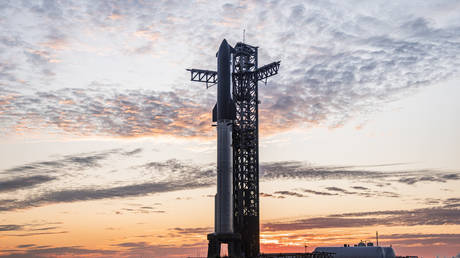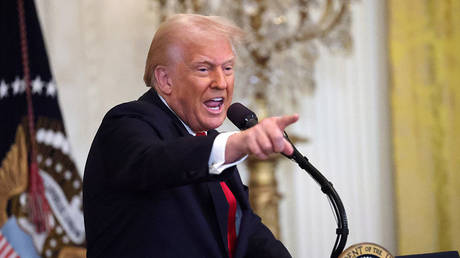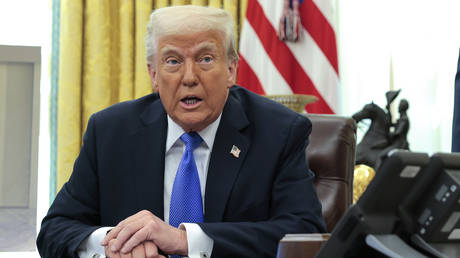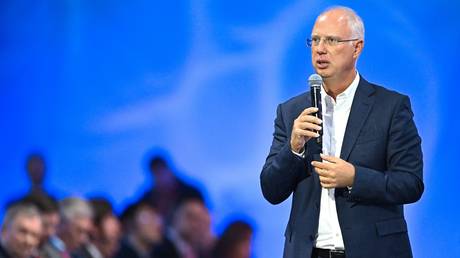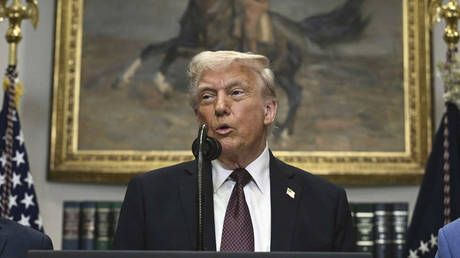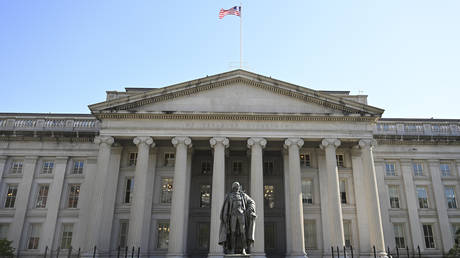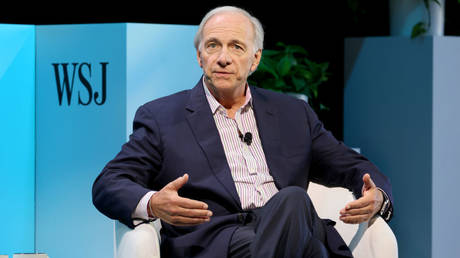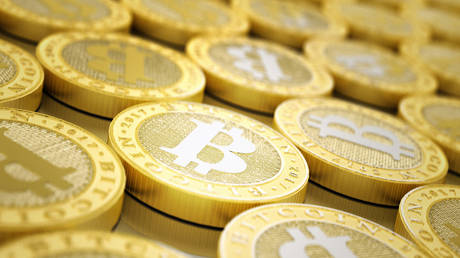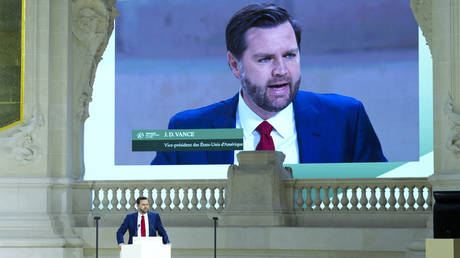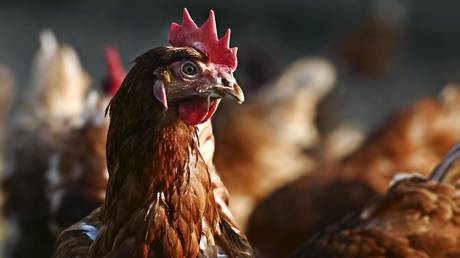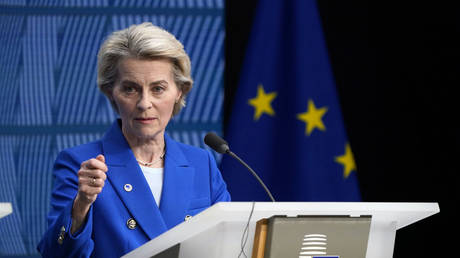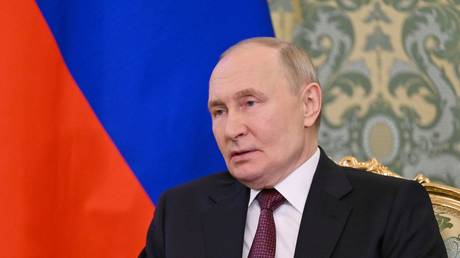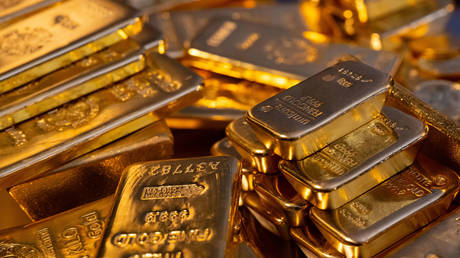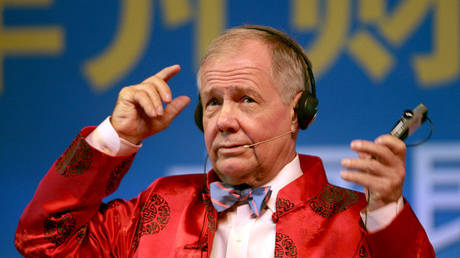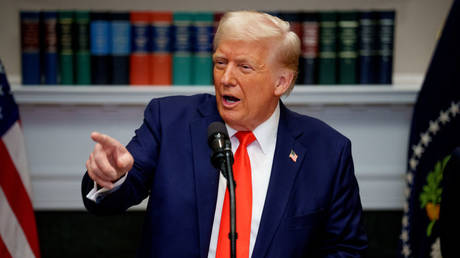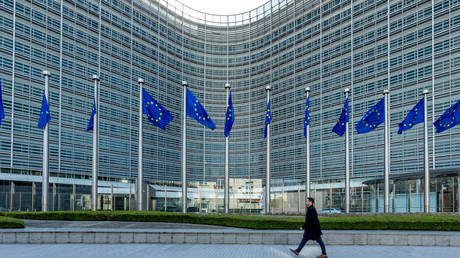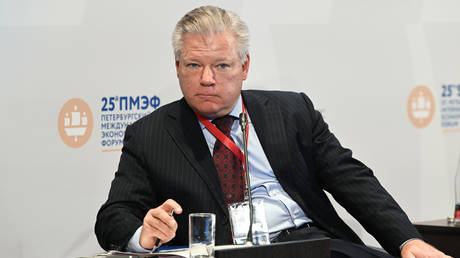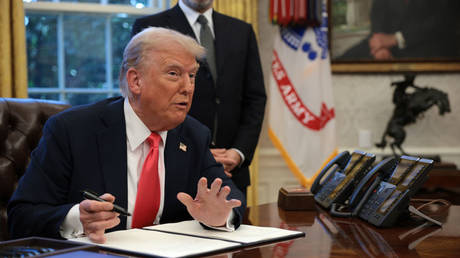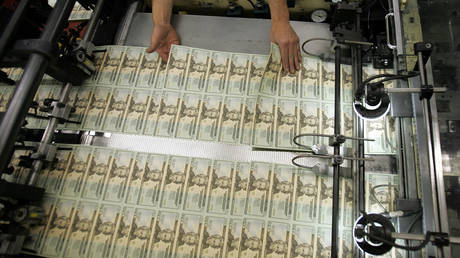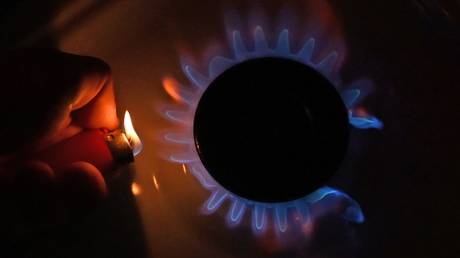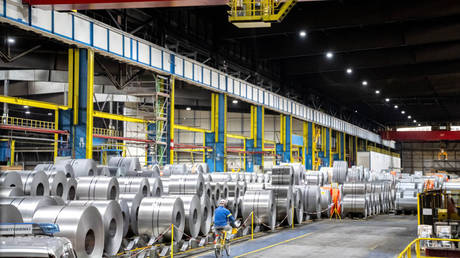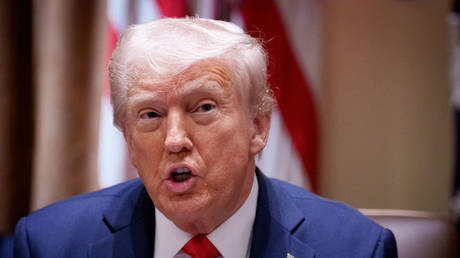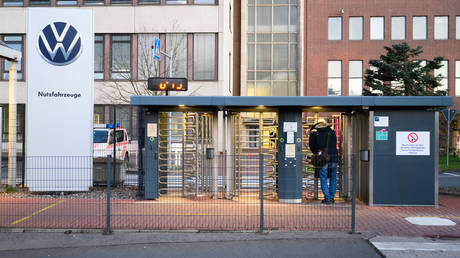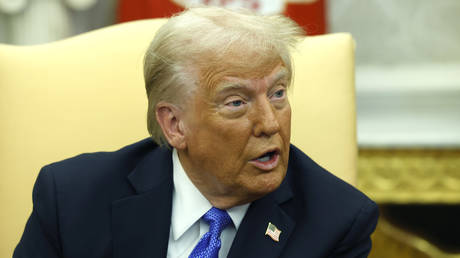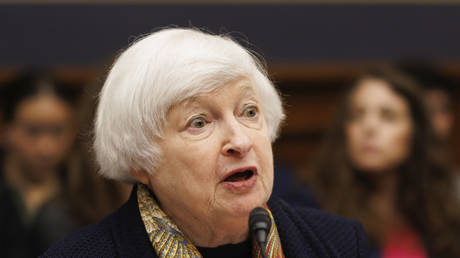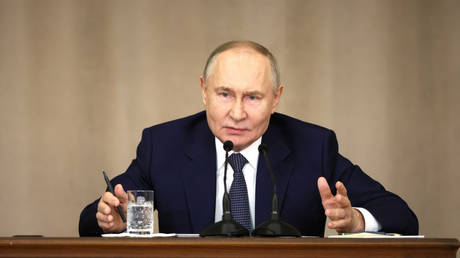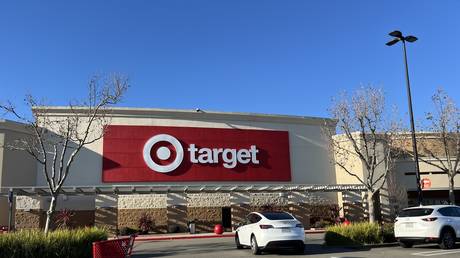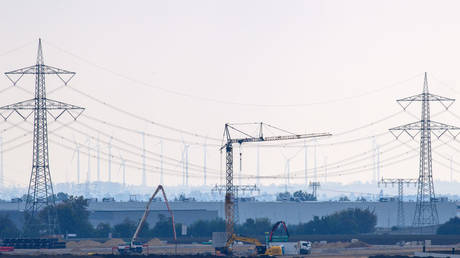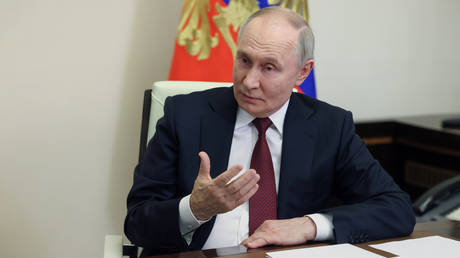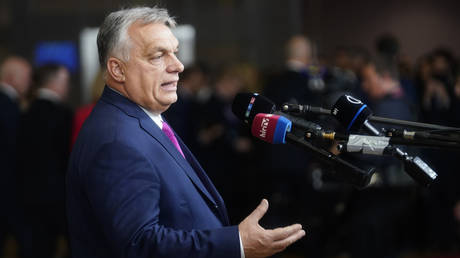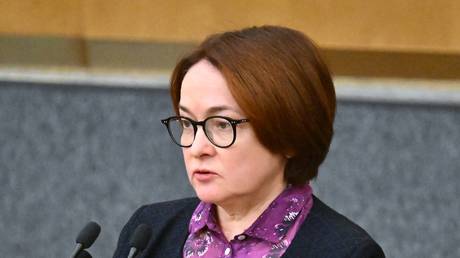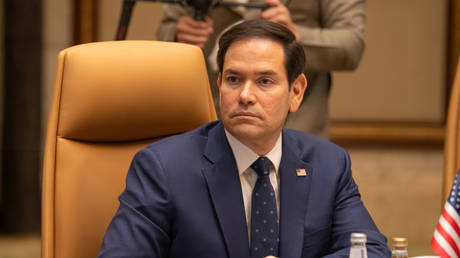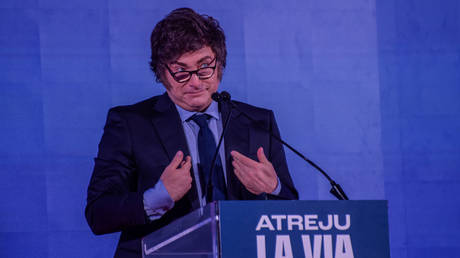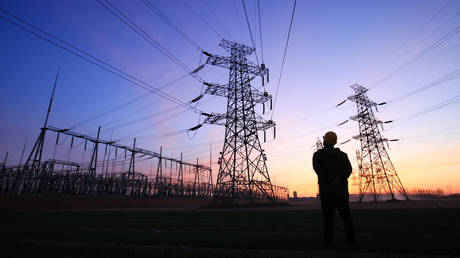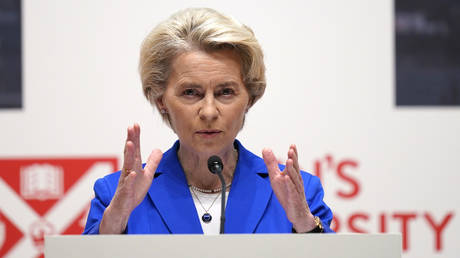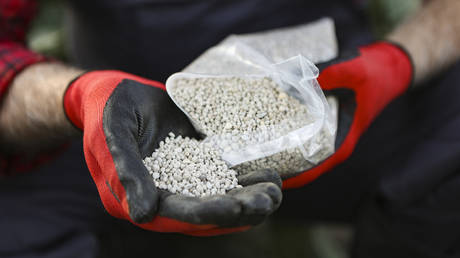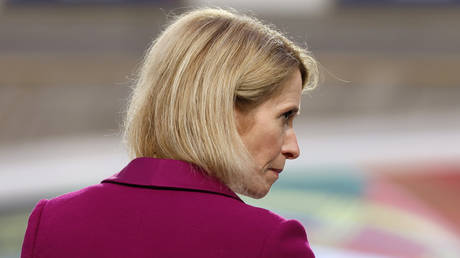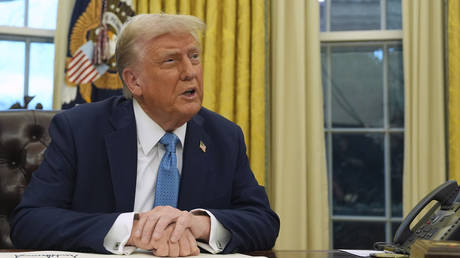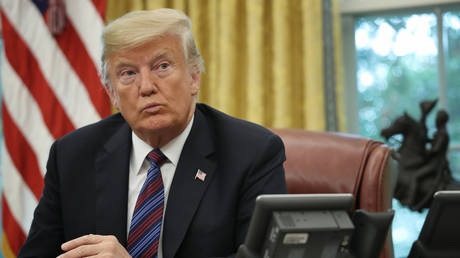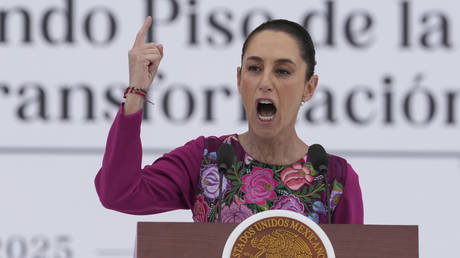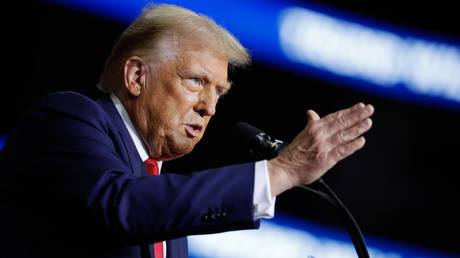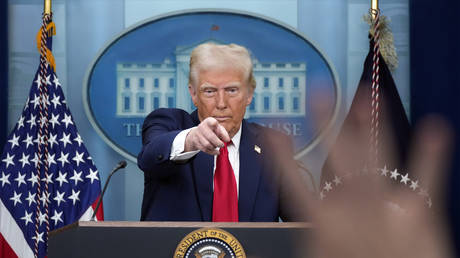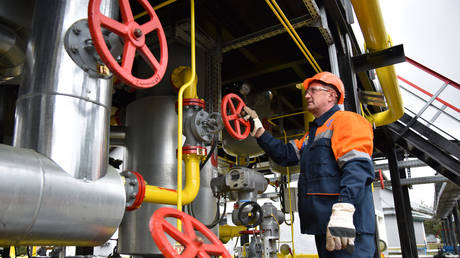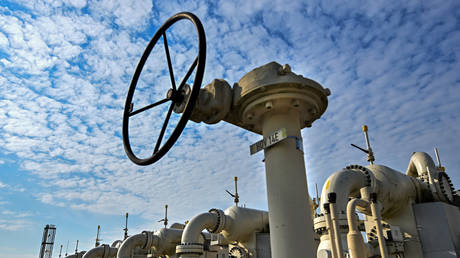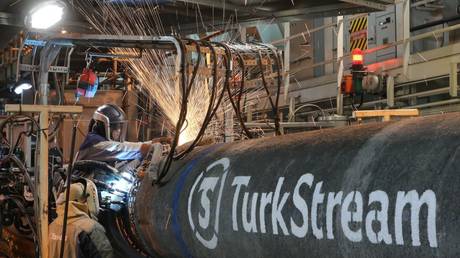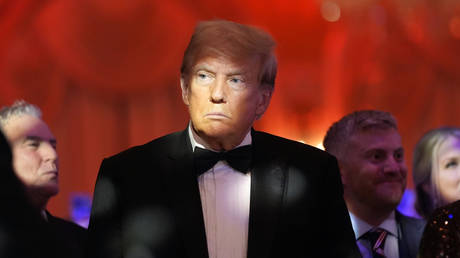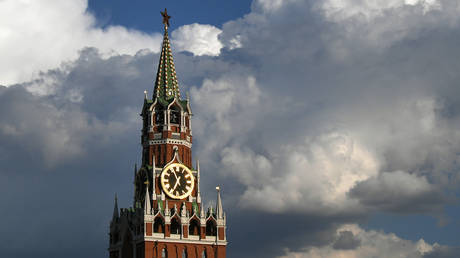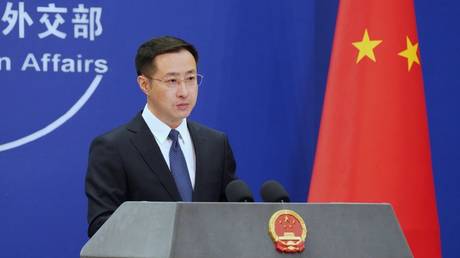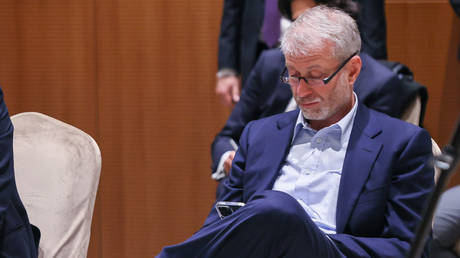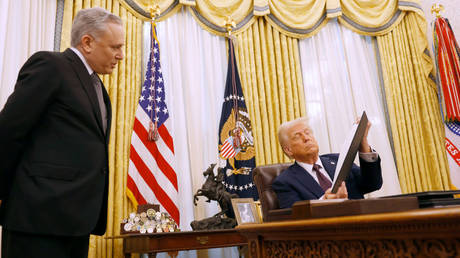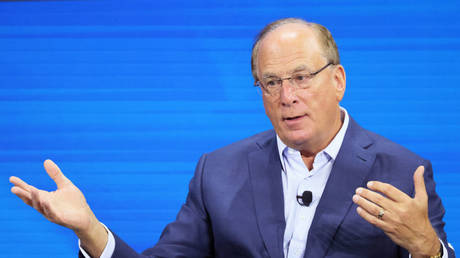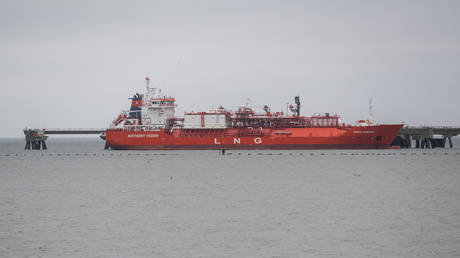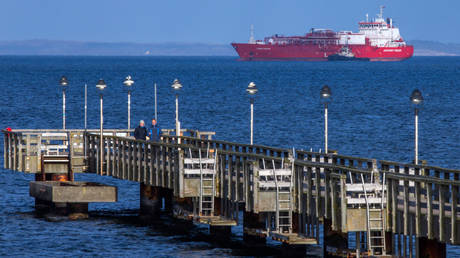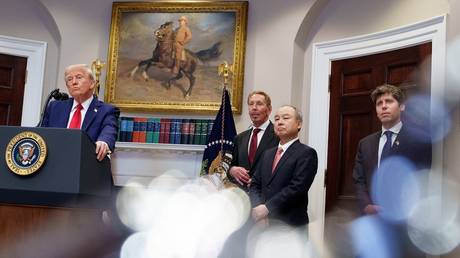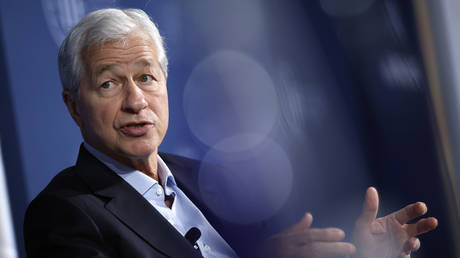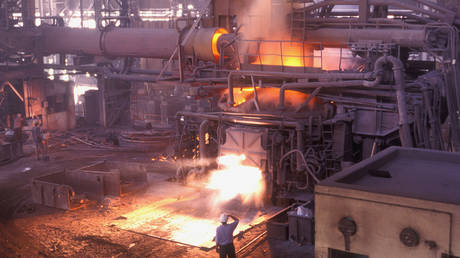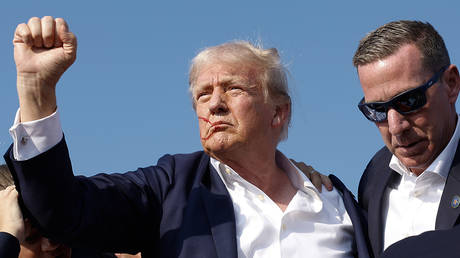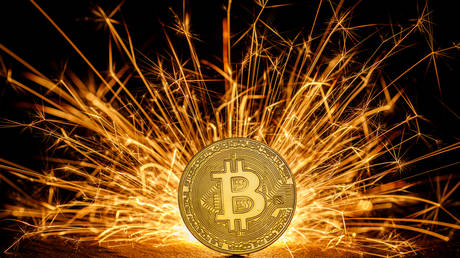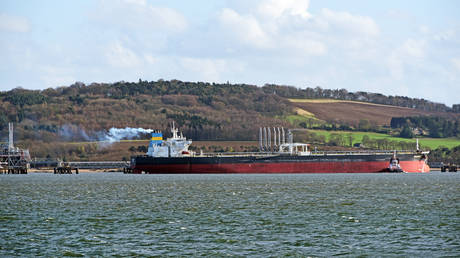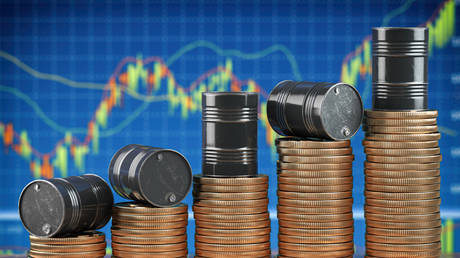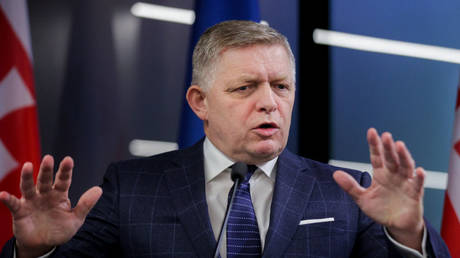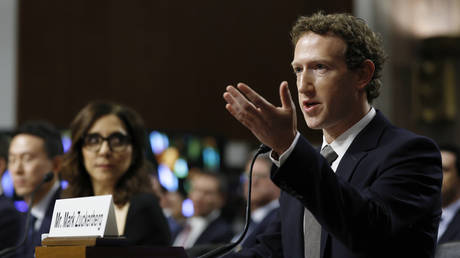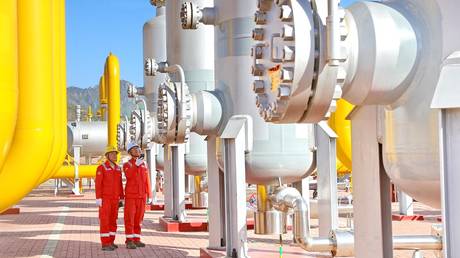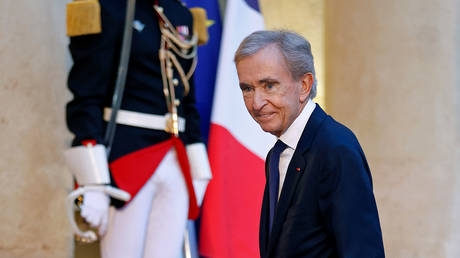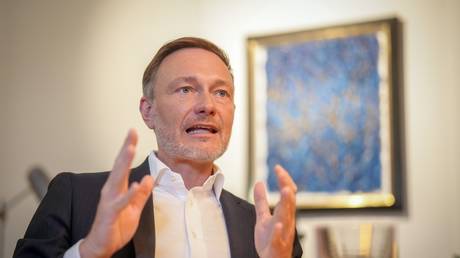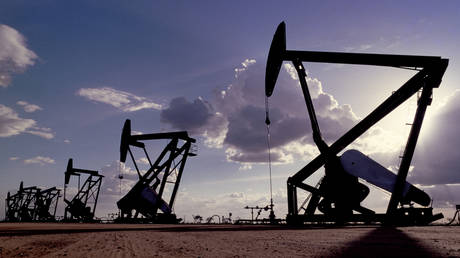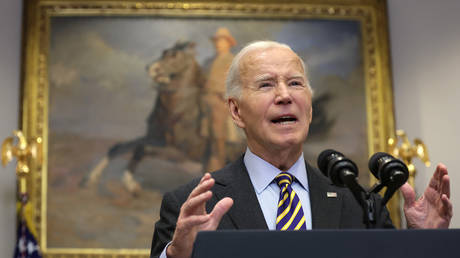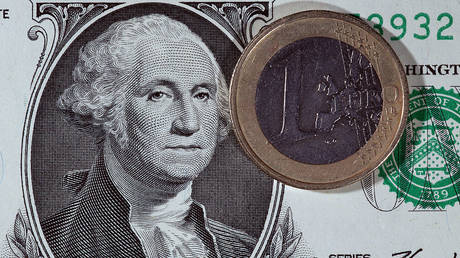
RT
The billionaire’s xAI artificial intelligence startup has acquired the social media platform Tech billionaire Elon Musk has announced that his artificial intelligence startup, xAI, has acquired the social media platform X, which he also controls. The acquisition was confirmed in a Friday post on X, where Musk stated, “@xAI has acquired @X in an all-stock transaction.” “Since its founding two years ago, xAI has rapidly become one of the leading AI labs in the world, building models and data centers at unprecedented speed and scale,” the tech mogul said. He described X as “the digital town square where more than 600M active users go to find the real-time source of ground truth.” In late 2022, Musk acquired Twitter, now known as X. Following his takeover, he implemented cost-cutting measures, including far-reaching staff cuts and the renegotiations of contracts, while also relaxing some content restrictions and reinstating certain banned accounts. Read more Musk noted that X has been transformed into one of the most efficient companies globally, highlighting its potential for scalable growth. He has stated that “xAI and X’s futures are intertwined,” emphasizing the advantages of combining their resources: “Today, we officially take the step to combine the data, models, compute, distribution and talent.” AI development is one of the priorities of the government of US President Donald Trump, where Musk leads the Department of Government Efficiency (DOGE). According to analysts, the billionaire has been focused on establishing himself as a leader in the AI industry. Earlier this year, he attempted to lead a group of investors to purchase OpenAI, the creator of ChatGPT, for nearly $100 billion. The company’s CEO Sam Altman, however, rejected the offer. Musk had co-founded OpenAI in 2015 but departed before it gained significant traction, and subsequently launched xAI in 2023. Медиа: | ↑ |
The EU should put its “entire toolbox on the table” in response to new US tariffs, Annalena Baerbock has said German Foreign Minister Annalena Baerbock has proposed introducing a fee on iPhone software updates as a response to new US tariffs on EU goods, according to the newspaper Der Tagesspiegel. The proposal follows an announcement by US President Donald Trump this week of an additional 25% tariff on hundreds of billions of dollars’ worth of imported cars and auto parts from the EU, expected to take effect next week. Trump warned of further measures if the bloc responded with its own levies. Speaking at the Berlin European Conference on Thursday, Baerbock cited the EU’s Digital Services Act (DSA), adopted in 2022, which includes mechanisms for responding to external trade pressure. “If others … propose a 25% tariff, then we can put our entire toolbox on the table,” Baerbock said. She suggested one option could be a levy on digital services: “How often do we update our iPhone? Add ten cents to it – that would bring a lot of money for Europe, though others might not like [it] so much.” Read more The report, however, questioned whether European consumers – who might ultimately bear the cost – would support the German foreign minister’s proposal. According to German daily NOZ, citing data from Statista on Thursday, there are approximately 165 million iPhone users in the EU. With iPhones typically receiving six to ten software updates per year, a €0.10 levy per update could generate around €165 million ($178 million) annually. Apple reported a global net profit of $36.3 billion in the first fiscal quarter of 2025, according to company filings. The US has long accused the EU of unfair trade practices, including high tariffs on American goods and regulatory hurdles affecting American companies. In February, Trump said he would impose 25% levies on all imports from the EU, claiming the bloc was created to “screw” America. The latest tariffs could hit the German auto industry hardest, with carmakers like Volkswagen and Mercedes-Benz facing significant challenges in the US market, analysts say. Rising production costs and factory closures have already put pressure on parts of Germany’s manufacturing sector. Trump’s 25% tariff hike on steel and aluminum supplies from the bloc took effect on March 12, following the expiration of previous exemptions, duty-free quotas, and product exclusions. In response, the EU announced it would impose counter-tariffs on €26 billion worth of US goods beginning in April. A similar trade dispute unfolded during Trump’s first term, when he slapped tariffs of 25% on European steel and 10% on aluminum, prompting retaliatory measures from Brussels. The measures impacted more than $10 billion worth of transatlantic trade. Медиа: | ↑ |
The US president has warned Ottawa and Brussels not to provoke their “best friend” by retaliating with their own duties US President Donald Trump has threatened to impose additional tariffs on the European Union and Canada if they collaborate to “do economic harm” to the United States. Trump’s warning comes after the newly-installed Canadian prime minister, Mark Carney, said the old relationship with Washington was “over” and that it was important for Canada to strengthen ties with “reliable partners” in Europe. “If the European Union works with Canada in order to do economic harm to the USA, large scale Tariffs, far larger than currently planned, will be placed on them both in order to protect the best friend that each of those two countries has ever had!” Trump wrote on his Truth Social platform on Thursday. On Wednesday, Trump announced plans to impose an additional 25% tariff on hundreds of billions of dollars’ worth of imported cars and auto parts beginning next week. The EU’s biggest economies and Canada have threatened to retaliate. In early March, the US imposed a 25% tariff on most Canadian goods, citing a trade imbalance and drug trafficking concerns. Read more In February, Trump announced plans to introduce a 25% levy on goods imported from the EU, which is set to come into force next week. Both Ottawa and Brussels have responded with their own duties. The escalating dispute with Canada follows a spate of comments from Trump claiming that the country would be better off as the 51st state of the US. Canada has categorically rejected becoming part of the US. Washington has long accused the European Union of unfair trade practices, including high tariffs on American goods and restrictive regulatory barriers that disadvantage US companies. READ MORE: Meloni backs Vance’s attack on EU The Ukraine conflict has also driven a wedge between Brussels and the new administration in Washington. Trump has adopted a more conciliatory approach toward Russia and has initiated peace talks, while the EU has insisted on continuing the supply of lethal aid to Kiev and has considered deploying troops. Медиа: | ↑ |
LG Electronics suspended production at its manufacturing facility near Moscow in March 2022 due to Western sanctions South Korea’s LG Electronics has confirmed it has carried out a test restart of its Russian plant, which has been idle since operations were suspended in 2022 due to Ukraine conflict-related Western sanctions. LG halted all deliveries to Russia and suspended operations at its plant in Ruza, near Moscow, shortly after the escalation of the conflict. On Friday, South Korean media reported a partial resumption of operations at the facility, which previously produced washing machines and refrigerators. The move is aimed at “preventing equipment corrosion,” an LG official told RIA Novosti on Friday, adding that only existing on-site materials are currently being used. LG CEO Cho Joo-wan, quoted by Korea Times on Friday, said the company remains “cautious, as the conflict is not yet over,” and is closely monitoring the situation. Full operation could resume once sanctions are lifted, he added. Several major Korean firms, including LG, Hyundai Motor Group and Samsung, are reportedly evaluating a return to the Russian market amid ongoing Ukraine peace negotiations. An LG representative noted the company’s situation differs from Hyundai’s, the carmaker announced plans in 2023 to sell its Russian plant, and completed its exit from the country under pressure from Western sanctions. President Vladimir Putin has repeatedly said sanctions had inadvertently strengthened Russia’s economic and technological base and that any potential return of foreign companies must be carefully managed to protect domestic companies. Read more Russia “never closed its doors or expelled anyone,” Putin said recently, adding that confidential talks with some foreign businesses are already underway. However, he noted that future decisions will depend on market conditions, and no special incentives will be granted if sectors are already occupied. According to Prime Minister Mikhail Mishustin, a special government commission will assess each company’s case individually. This week, Italian appliance maker Ariston announced it would resume operations in Russia after Putin signed a decree removing its Russian unit from a list of companies under temporary state control. Медиа: | ↑ |
Multinationals are reportedly looking to re-access the country’s market amid Ukraine ceasefire talks Foreign firms that exited Russia due to sanctions linked to the Ukraine conflict are now seeking to return, according to President Vladimir Putin’s special economic representative, Kirill Dmitriev. Dmitriev, who is also the CEO of the Russian Direct Investment Fund (RDIF), was responding to Korea Times report on Friday that South Korean companies are looking to resume operations in Russia, given US-led ceasefire talks between Moscow and Kiev. “Global companies are lining up to return to Russia, signaling renewed confidence and fresh opportunities in one of the world’s largest markets,” Dmitriev wrote on X on Friday. More than 1,000 Western firms – from well-known retail firms to car giants – have exited the Russian market in the past three years. But as Ukraine conflict ceasefire talks gain momentum, major South Korean companies are reportedly stepping up feasibility studies on resuming operations in Russia. The push reflects Russia’s strategic importance for the country as a market, particularly in light of mounting tariff pressure from the US, the outlet said. LG Electronics is reportedly among the first, and recently partially resumed operations at its home appliance plant in Moscow, which produced washing machines and refrigerators, the outlet said citing industry sources. “The move is aimed at preventing deterioration of production facilities that have been idle,” an LG official told the Korea Times. Read more Hyundai Motor Group, which along with Kia held the top two spots among car brands in Russia in 2021, is also closely assessing the prospect of re-entering the Russian market. The group sold its St. Petersburg plant for just 10,000 rubles ($120) with a two-year buyback option 2023. It means the group must make a decision on restarting production at the facility before the end of 2025. Earlier this week, Italian household equipment manufacturer Ariston announced its return to Russia after exiting the market in 2022. The development seems to reflect an emerging trend of potential comebacks and buybacks by major foreign brands amid a US pivot on relations with Russia. Russian Prime Minister Mikhail Mishustin stated on Wednesday that each company’s case will be evaluated on an individual basis. Foreign firms that exited Russia “under government pressure” but maintained “jobs, contacts, and technologies,” along with a buy-back option, could be permitted to return, he said. Mishustin added that companies possessing unique expertise would also be welcomed— so long as they adhere to localization and investment conditions. Медиа: | ↑ |
Moscow has asked Washington to ease its sanctions as a step towards settling the Ukraine conflict US Treasury Secretary Scott Bessent has confirmed that all options remain on the table as Washington considers lifting certain sanctions against Moscow, including the possible reconnection of Russian banks to the Belgium-based SWIFT network. The US and EU cut off major Russian banks from the SWIFT messaging system as part of a decade-long sanctions campaign, which was significantly expanded following the escalation of the Ukraine conflict in 2022. As part of the Black Sea ceasefire initiative discussed in Saudi Arabia earlier this week, Moscow requested that its Agricultural Bank (Rosselkhozbank) and other institutions involved in food and fertilizer sales be reconnected to the international payment system. “There would be a long discussion about many things in terms of the proper way to bring Russia back into the international system,” Bessent told Fox News on Wednesday, emphasizing that it was “premature to discuss the terms of a deal before we have a deal.” “I think everything is on the table,” he added, noting that “it will be determined by the Russian leadership’s next moves whether the sanctions go up or down, and President Trump, I think, would not hesitate to raise the sanctions if it gives him a negotiating advantage.” Read more Reconnecting Rosselkhozbank to SWIFT was part of the original Black Sea Grain Initiative, brokered in July 2022 by the UN and Türkiye. A Western failure to deliver on that commitment, along with Kiev’s alleged misuse of the arrangement for military purposes, prompted Moscow to reject the renewal of the agreement in 2023. The US and Russia agreed to revive the defunct Black Sea deal following 12 hours of talks in Saudi Arabia on Monday. President Donald Trump confirmed on Tuesday that his administration is considering lifting some sanctions on Moscow. “There are about five or six conditions. We’re looking at all of them,” he said. Read more The Brussels-based SWIFT system is incorporated under Belgian law and must comply with EU regulations and restrictions. European Commission spokeswoman Anitta Hipper stated on Wednesday that the bloc will not amend or lift its sanctions until Russia “unconditionally” withdraws all forces from the “entire territory of Ukraine.” Russian President Vladimir Putin said last week that Western sanctions are not a temporary measure but a long-term tool used to apply strategic pressure on Moscow, and that Russia’s rivals will always seek out ways to weaken the country. According to Putin, a total of 28,595 sanctions have been imposed on Russian individuals and entities in recent years – more than the total number imposed on all other countries combined – which have only strengthened the national economy by encouraging self-reliance. Медиа: | ↑ |
A new approach to managing the shipping artery is expected to boost freight turnover through Russian waters The development of the Northern Sea Route (NSR) in Russia’s Arctic territory will be at the center of discussions on Wednesday at the International Arctic Forum. The two-day event is taking place in Murmansk – the world’s largest city north of the Arctic Circle and home to a strategic Russian port. The forum, organized by the Russian government and national nuclear energy giant Rosatom, is a major platform for discussing the development of the Arctic. The region has drawn increasing global attention due to its vast untapped energy and mineral resources, as well as its strategic trade routes. Russia has been developing the NSR, a transport corridor that runs through its Arctic and Far East regions and serves as the shortest shipping link between Europe and the Asia-Pacific. The NSR is expected to become a major trade route for goods shipped between the continents and could drastically reduce transportation times compared to traditional pathways through the Suez or Panama canals. Read more Forum participants will examine plans to modernize and expand the NSR, with a focus on boosting its efficiency and strengthening partnerships between Russia and countries in Southeast Asia and the Persian Gulf. The discussion will also seek ways to keep the route operational year-round, improve logistics along the corridor, and enhance Arctic infrastructure. The NSR in Russia’s exclusive economic zone within Arctic waters has been experiencing an unprecedented surge in development over the past decade. Moscow has extensively modernized the route, with significant investment from India and China, which hold stakes in several Arctic energy projects. Russian President Vladimir Putin last year outlined the development of the NSR as a strategic priority for the country, pledging to ensure all-year navigation on the Arctic route. He has also invited foreign partners to use the shipping artery. Freight traffic via the route has been growing steadily. Russian authorities expect annual maritime cargo flows along the NSR to reach 200 million tons by 2030. They plan to boost cargo throughput at northern seaports and to increase the country’s Arctic fleet. Медиа: | ↑ |
American fiscal strength is on course for continued multi-year decline, the rating agency has said Ratings agency Moody’s has sounded the alarm on the United States fiscal health, warning of a continued decline due to widening budget deficits and increasing concerns over debt affordability. The warning comes as the national debt surpasses $36 trillion and annual deficits exceed $1.7 trillion, raising concerns about the government’s ability to manage its financial obligations. ”[US] fiscal strength is on course for a continued multiyear decline”, having already “deteriorated further” since Moody’s assigned a negative outlook to America’s top-notch AAA credit rating in November 2023, the agency said in a report on Tuesday, as cited by Financial Times. Read more US President Donald Trump has advocated measures aimed at stabilizing the nation’s finances, including implementing significant tariffs and proposing tax cuts intended to stimulate economic growth. However, Moody’s has cautioned that extending substantial tax cuts without implementing significant spending reductions could exacerbate the country’s fiscal challenges. ”We see diminished prospects that these strengths will continue to offset widening fiscal deficits and declining debt affordability,” it said, according to Reuters. Republicans are pushing for a $4.5 trillion extension of tax cuts, which would in turn require significant spending reductions, something that may conflict with Trump’s commitment to protect social programs, the agency noted. The Department of Government Efficiency (DOGE), led by Elon Musk, tasked with reducing wasteful spending, claims to have achieved $115 billion in savings nationwide. However, according to Moody’s, such cuts are relatively minor compared to mandatory spending obligations. READ MORE: US to review ‘lazy’ Biden-era sanctions – Treasury secretary The agency projects that, without effective policy interventions, America’s debt-to-GDP ratio could rise from the current 124% to approximately 130% by 2035, with interest payments consuming about 30% of federal revenue. Медиа: | ↑ |
Wizz Air has outlined a strategy to resume operations within weeks of a peace agreement Hungarian low-cost carrier Wizz Air has announced plans to swiftly resume flights to Ukraine once a ceasefire with Russia is established. Speaking at the Logistics as a Driver of Economic Growth conference on Tuesday, CEO Jozsef Varadi spoke of the airline’s plans for Ukraine, emphasizing the potential of the country’s market. “We have a firm plan for the restart of Ukraine, because I think it can happen any moment,” Varadi stated. “Once a ceasefire is announced, then we would look at our restart,” he added. The European Union Aviation Safety Agency (EASA) estimates that reopening Ukrainian airspace could take six to eight weeks after a ceasefire is declared. The chief executive said the airline is preparing to align its operations with this timeline to ensure a prompt return. ? According to Varandi, the carrier plans to restart operating bases in Kiev and Lviv, aiming to supply an annualized capacity of about 5 million seats a year to the Ukrainian market across 60 routes. In 2021, the low-cost airline was third in the Ukrainian market with a 10% share, according to the Independent. Ukraine closed its airspace to civilian flights on February 24, 2022 when the conflict with Russia escalated, citing the high risk to flight safety due to the active fighting. READ MORE: Russia proposes resuming direct flights with US The optimism about a potential ceasefire comes amid a broader diplomatic push by Russia and the US to end the Ukraine conflict. Since taking office in January, US President Donald Trump has begun talks with Russian President Vladimir Putin and Ukraine’s Vladimir Zelensky about reaching a peace agreement. This has been followed by several rounds of negotiations between Russian and American officials. Медиа: | ↑ |
Moscow is seeking $1.6 billion in damages from Shell over the Sakhalin-2 LNG joint venture that the latter quit in 2022 Russia is seeking over $1.6 billion in damages from British energy giant Shell over a failed joint venture, the company revealed in its annual report published on Tuesday. Shell walked away from the Sakhalin-2 liquefied natural gas (LNG) project, a major oil and gas development on Sakhalin Island in Russia’s Far East, in 2022, after the escalation of the Ukraine conflict and ensuing Western sanctions on Moscow. The Russian Prosecutor General’s Office launched the legal action against eight Shell group units last October, although no details of the claim were made public at the time. Gazprom Export, the Russian Energy Ministry, the government of Sakhalin Region, as well as the companies Sakhalin Energy Investment and Sakhalin Energy were named as also being party to the claim. Read more According to the London-based energy giant, Russia is seeking a declaration that Shell illegally abandoned its support for the project. It is also seeking “monetary relief” of approximately €1.5 billion from Shell Energy Europe Limited to Gazprom Export for “alleged unpaid gas deliveries in 2022,” and a declaration that Gazprom Export can take the 94 billion rubles ($1.1 billion) reserved in escrow for Shell as compensation for relinquishing its share in Sakhalin-2. The company filed a postponement notice in January and a new hearing in the Moscow Arbitration Court is scheduled for April 14, the report added. The energy giant noted that it was currently impossible to estimate “the magnitude and timing” of any possible obligations arising from the lawsuit. “There remains a high degree of uncertainty regarding the ultimate outcomes, as well as the potential effect on future operations, earnings, cash flows and Shell’s financial condition,” it added. In 2022, Russian President Vladimir Putin signed a decree transferring the assets of Sakhalin Energy, the former operator of Sakhalin-2, to a new Russia-based operator, Sakhalin Energy LLC. The government allowed foreign owners, which included Japanese companies Mitsui and Mitsubishi, to take a stake in the new operator proportionate to their previous holding. READ MORE: Japan to retain oil and gas interests in Russia The Japanese firms decided to retain their stakes, but Shell, which owned 27.5% minus one share in Sakhalin Energy, refused to join the new entity, prompting Moscow to sell off its stake to a Gazprom subsidiary for roughly $1 billion. The funds remain frozen in Russia in a type of escrow account called Type C that was introduced in response to Western sanctions. The main purpose of such accounts was to prevent the movement of funds out of the country by entities from “unfriendly nations.” Медиа: | ↑ |
Cryptocurrencies are still “very volatile” and are used for shady transactions, Elvira Nabiullina has warned The head of Russia’s central bank, Elvira Nabiullina, has called for settlements in cryptocurrencies to be banned in the country. Russia currently allows cryptocurrency mining and experimental foreign-trade settlements in crypto. Speaking at a press conference on Friday, Nabiullina stated that cryptocurrencies are still “very volatile [financial] instruments often used for shady operations.” They should not be allowed to serve as a means of payment, she maintained. Last year, Russian President Vladimir Putin raised the issue of regulating cryptocurrencies and digital assets, calling it a promising area, and urged for the creation of conditions for the circulation of digital assets, both domestically and with foreign partners. In August 2024, Nabiullina said the Bank of Russia would conduct the first cross-border crypto payments by the end of that year as part of an experiment. On Friday, she said that any transactions in crypto outside of this special legal regime should be banned and those found in violation of the regulations should face legal penalties. Read more However, she has expressed support for allowing cryptocurrencies to serve as an investment tool for certain qualified investors. These investments would be associated with elevated risks, Nabiullina warned, adding that the initial experimental format could allow for the development of future crypto investment regulations, as well as ensuring their transparency. In August 2024, Russia enacted a law prohibiting the advertising of cryptocurrency to the general public and the promotion of goods or services facilitating digital currency transactions. The legislation also banned advertising digital currencies and services such as crypto exchanges or wallets. Violations can result in administrative penalties. Cryptocurrency mining was legalized in Russia in 2024 but was also restricted in some regions until 2031 to avoid power shortages, due to its high energy consumption. In February, Russia blocked access to major cryptocurrency exchange aggregator BestChange. Медиа: | ↑ |
Kai-Fu Lee has cast doubt on the sustainability of OpenAI’s model compared to open-source DeepSeek An artificial intelligence pioneer has questioned the sustainability of ChatGPT creator OpenAI, noting that Chinese rival DeepSeek has been trained at a fraction of the cost. DeepSeek heated up an AI race between China and the US in January after launching an open-source version of its reasoning AI model, R1. Unlike its American rival ChatGPT, the Chinese bot is freely available without a subscription, which has helped it rapidly become the most downloaded app on Apple’s and Google’s stores. “If you think about OpenAI’s $7 billion of operating costs in 2024, DeepSeek is probably operating with 2% of the operating expense,” Kai-Fu Lee, a writer, venture capitalist, and technology executive who has over 30 years’ experience in AI, said on Thursday in an interview with Bloomberg. Lee is the founder of Sinovation Ventures, a venture capital firm focused on supporting Chinese startups in AI and technology, as well as establishing an AI institute which focuses on integrating new technology into traditional industries and developing AI-driven startups. He previously served as founding director of Microsoft Research Asia before working at Google and Apple. “Is OpenAI’s model even sustainable?” the expert asked. Read more Lee specified that OpenAI was spending $87 billion a year “making a massive loss.” He compared this to DeepSeek, which is offered to developers for free or at a fraction of the cost. “So with that kind of formidable competitor, I think Sam Altman is probably not sleeping well,” he said, referring to the OpenAI CEO. The venture investor and founder of 01.AI projected that only three AI models – DeepSeek, Alibaba Group Holding, and ByteDance – would survive China’s domestic shakeup triggered by the onset of DeepSeek. Lee added that xAI, OpenAI, Google, and Anthropic could lead the sector in the US. He emphasized that pioneer models such as ChatGPT have been commoditized, making the business model of the US developer vulnerable to cheaper economics presented by open-source AI such as DeepSeek. Медиа: | ↑ |
Eurozone stability is under threat due to Berlin’s military spending boost and debt brake overhaul, Alice Weidel warns Berlin’s move to overhaul its national debt rules in order to boost military spending has jeopardized the economic stability of the euro area, according to Alice Weidel, the co-leader of the Alternative for Germany (AfD) party. Her comments came shortly after the federal legislature approved the measure. On Tuesday, the Bundestag backed an initiative allowing the federal government to unlock a record level of state borrowing for defense and infrastructure. The fiscal package was approved by 513 legislators, while 207 voted against it. “This is a death blow for the euro, which in the coming years – and it is already beginning to do so – will devalue significantly,” Weidel told journalists after the “historic” vote, emphasizing that German lawmakers had approved “gigantic debt.” The reform, which amends the nation’s constitutionally enshrined fiscal rules, will hit the country’s future generations the hardest, according to AfD’s co-leader, who also warned that “what is being done here is the final destruction of Germany’s financial stability.” “We will lose our AAA rating, our top credit rating,” Weidel warned. The world’s major credit agencies currently rank Germany’s long-term sovereign debt AAA, entailing the lowest expectation of risk. Read more The reform package approved by the lower chamber implies the removal of federal fiscal restrictions in order to increase the special fund for the Bundeswehr, Germany’s armed forces. If adopted, the amendments will allow spending exceeding 1% of the country’s gross domestic product (GDP) to be effectively exempt from the nation’s “debt brake” that was added to the constitution in 2009. The current rules normally limit federal budget deficits to no more than 0.35% of GDP. In addition, the proposed reform stipulates the creation of a debt-financed and brake-exempted fund of €500 billion ($548 billion) earmarked for infrastructure and climate investments, with one-fifth of that funding to be committed to fighting climate change. The reform package also needs to be approved by the Bundesrat, a body representing the country’s states, on Friday to become enshrined in Germany’s constitution. Медиа: | ↑ |
Finland cited regulatory barriers and limited supply in declining an American appeal Finland has refused to export eggs to the US, citing regulatory hurdles and supply constraints, after the US Department of Agriculture (USDA) reached out to several EU producers amid skyrocketing domestic prices, local outlet Yle has reported. The American market is experiencing a severe egg shortage due to a bird flu outbreak that has drastically reduced domestic production. Prices have surged by 200% from last year, reaching an all-time high of $8.41 per dozen, according to Bloomberg. To stabilize the market, the USDA has appealed to several European countries, including Finland, Sweden, and Denmark, for imports. The Finnish Poultry Association confirmed that it had been contacted but stated that exports were not currently feasible. “Launching exports is not a simple matter since there are no agreed rules in place,” the association’s executive director, Veera Lehtila, told Yle on Saturday. She explained that Finland lacks national approval to export egg products to the US, meaning any potential shipments would require extensive regulatory procedures. Read more Lehtila also noted that Finland’s domestic supply is limited, making exports impractical. “We have four million laying hens in total in Finland. The amount we could export would not solve their egg shortage,” she said, pointing out that the US culled five times as many birds due to bird flu in the last quarter alone. An official response, drafted in coordination with the Finnish Food Authority, has already been sent to US authorities, according to Helsingin Sanomat. The outbreak has severely impacted US poultry farms, particularly in major egg-producing states such as Iowa and Ohio. In response, the USDA announced plans to allocate up to $1 billion to combat the crisis and support affected farmers through biosecurity measures and compensation for lost flocks, according to Reuters. Read more Europe is also facing egg shortages due to bird flu, with millions of chickens culled across the continent. One of Sweden’s largest egg producers, Kronagg, told Aftonbladet that it is unlikely to export to the US due to restrictions. The Danish Egg Association stated that while it would consider exports, there is hardly any surplus available. Meanwhile, trade tensions between Washington and Brussels have escalated. US President Donald Trump has threatened a 200% tariff on European wine, cognac, and other alcohol imports if the EU moves forward with plans to impose duties on American whiskey. This is part of a broader trade dispute in which both sides have introduced tariffs on various goods, further straining transatlantic relations. Медиа: | ↑ |
Washington is reportedly seeking external sources of supply amid soaring prices in the domestic market The US Department of Agriculture (USDA) has reached out to producers in several EU nations to secure additional egg imports amid skyrocketing domestic prices, Reuters reported Friday, citing the Danish egg association. The request comes despite recent trade tensions between Washington and Brussels over import tariffs imposed by the US administration on various EU goods. A USDA representative in Europe reportedly sent formal inquiries in late February to several egg-producing countries, including Denmark, Sweden, and Finland. US wholesale egg prices recently hit an all-time high of $8.41 per dozen, marking a surge of over 200% from the previous year, according to Bloomberg. The price hike is attributed to an accelerating outbreak of bird flu among laying hens, significantly reducing egg supplies. “We’re still waiting for more guidance from Washington on next steps, but do you have an estimate of the number of eggs that could be supplied to the US (assuming they meet all import requirements),” a follow-up letter to the Danish egg association reviewed by Reuters said, indicating that the White House was trying to estimate feasible import quantities. A spokesperson for the association told Reuters that they would look into the situation, but emphasized that there was no surplus of eggs in Europe. Read more “There is a shortage of eggs everywhere on a global scale, because consumption is increasing, and many are affected by bird flu,” he specified, adding that egg exports to the US could be challenging due to hygiene regulations and other factors. Danish industry representative Jorgen Nyberg Larsen confirmed in an interview with AgriWatch that Washington had inquired about how much could potentially be supplied, adding that “they have also contacted my colleagues in the Netherlands, Sweden, and Finland.” Last week, sources familiar with the matter told Bloomberg that the US Justice Department had launched a preliminary investigation into the surge in egg prices across the country. The probe reportedly focuses on whether local suppliers such as Cal-Maine Foods and Rose Acre Farms had colluded to hike prices or limit supply. Earlier this week, US President Donald Trump’s 25% tariff hike on steel and aluminum imports from the EU took effect, following the expiration of previous exemptions and duty-free quotas. The European Commission responded by announcing counter-tariffs on €26 billion (over $28 billion) worth of US goods, set to begin in April. Медиа: | ↑ |
The Zuchongzhi-3 chip vastly outperforms Google’s Sycamore chip, according to its creators Chinese scientists have unveiled a new superconducting quantum computing prototype they say operates a million times faster than Google’s top quantum processors. The Chinese chip is also a quadrillion times more efficient than any conventionally built supercomputer, according to a statement issued by its creators. Dubbed Zuchongzhi-3, the chip was developed by the University of Science and Technology of China (USTC) in cooperation with half a dozen of the nation’s scientific institutions. The USTC published the results of its research and the chip’s performance analysis in an article for the Physical Review Letters earlier this month. According to the university’s statement, the testing showed that the new Chinese processor is a million times faster than Google’s Sycamore processor. The US tech giant presented its quantum computer back in October 2024, boasting that it could surpass the fastest conventional supercomputers in performing computationally complex calculations. “We are focused on developing practical applications for quantum computers that cannot be done on a classical computer,” Google Quantum AI representatives said at the time. The USTC said in its statement that Zuchongzhi-3’s computational speed outpaced that of the world's most powerful supercomputer by 15 orders of magnitude (a quadrillion times faster). Read more It is unclear how the newly unveiled chip compares to another Google product – the Willow quantum processor unveiled in December. The two have roughly similar processing capacities, although the Willow is reportedly slightly better than its Chinese rival when it comes to coherence time, a key parameter enabling more complex computations, according to Live Science. The US tech giant has not commented on the USTC statement. Chinese companies have substantially boosted investments in AI and quantum computing after President Xi Jinping urged the nation to accelerate fundamental scientific research. Beijing is aiming to increase self-reliance in crucial areas, including chip-making, space exploration, and military sciences. Bloomberg reported in October 2023 that Chinese companies and institutions applied for 29,853 AI-related patents in 2022, compared to 29,000 in the previous year. The figure is nearly 80% more than US filings. Медиа: | ↑ |
Moscow and Washington are in “preliminary” contact on global energy projects, the news agency has reported Moscow and Washington are currently in talks over the possibility of future cooperation with Gazprom on international projects, including in the Arctic region, Bloomberg reported on Thursday, citing Russian and European officials. The news comes as the US seeks to normalize relations with Russia and gain access to the economically important region. The Arctic has drawn increasing global attention due to its vast untapped energy and mineral resources, as well as its strategic trade routes. Russia has been developing its Northern Sea Route, the shortest shipping route between Western Eurasia and the Asia-Pacific, running through its Arctic and Far East regions. The route has been extensively modernized over the past years, with investment from India and China, which hold stakes in several Arctic energy projects. One of the sources told Bloomberg that Russian state-run energy giant Gazprom could offer the US involvement in ventures in the Arctic region and some offshore projects such as the Sakhalin liquefied natural gas project if sanctions restricting foreign investment are overturned. Unnamed sources familiar with the matter told the news agency that talks between US and Russian representatives on potential collaboration with Gazprom are at the stage of “preliminary contacts.” It is reportedly unclear who is leading the reported discussions or whether officials from the administration of US President Donald Trump are directly involved. Read more US-Gazprom cooperation could involve joint projects in Europe and Asia, several sources said, adding that it could be part of Washington’s broader push to weaken Russia’s ties to China and Iran. Bloomberg noted that the step could also promote business opportunities following a peace deal to end the Ukraine conflict, which Trump sees as a top priority. Earlier this week, German news outlet Correctiv reported, citing its own investigation, that Russia and the US were negotiating a major deal that would allow the resumption of Russian energy exports. The months-long discussions could reportedly involve US companies buying parts of the Nord Stream pipeline infrastructure and stakes in three German refineries owned by a subsidiary of Russian energy giant Rosneft. Neither the Kremlin nor the White House has officially commented on the reports. President Vladimir Putin said on Thursday that Russia could resume gas exports to Europe through the undersea pipeline once Moscow and Washington reach an agreement on energy cooperation. The Nord Stream 1 and 2 pipelines, built to deliver Russian gas to Germany and the rest of Western Europe, were destroyed by blasts at the bottom of the Baltic Sea in September 2022. Медиа: | ↑ |
The rally to more than $3,000 an ounce is driven by growing demand for safe-haven assets amid escalating trade tensions Gold prices reached a record high on Thursday as investors spooked by mounting concerns over a global trade war seek safe-haven assets. The latest rally comes amid on-off tariff announcements by the US. Import taxes on steel and aluminum imposed by US President Donald Trump took effect on Wednesday, sparking concerns in export-dependent Asia and prompting immediate retaliatory measures from the EU and Canada. Prior to the tariff imposition, Trump threatened to hike the levy on Canadian metals to 50%, but reversed the plan after Ontario Premier Doug Ford overturned his decision to introduce a 25% surcharge on electricity exports to several US states. Gold futures for April delivery briefly hit $3,003.90 per ounce Thursday night on the Chicago Mercantile Exchange (CME) before retreating to $2,989.50, marking the first time a contract has crossed the psychologically important $3,000 threshold. Prices for the precious metal are up nearly 14% so far this year after making a solid 27% gain in 2024. “The risk-off market stance reflects investors’ expectations that trade tensions are likely to get worse before it cools, and are turning to safe-haven gold once again as a hedge against portfolio volatility,” IG market strategist Yeap Jun Rong said, as cited by Reuters. Apart from concerns related to global trade tensions, analysts attribute the latest rally in gold prices, an asset preferred by investors amid geopolitical and economic turmoil, to bets on monetary policy easing by the US Federal Reserve. The regulator is expected to keep its key interest rate in the 4.25%-4.50% range at the meeting scheduled for next Wednesday. Read more “The potential impact of the tariff and trade threats are impossible to model, forcing the Fed to gauge economic data to help it determine its next move,” John Ciampaglia, CEO of Sprott Asset Management, told the news agency, adding that analysts “believe the Fed is stuck in a wait-and-see state.” Gold prices reached 40 record highs in 2024, driven by increasing geopolitical tensions in the Middle East and Eastern Europe, uncertainty regarding the outcome of the US presidential elections, interest rate cuts, and active gold purchases by major central banks, according to a survey by the World Gold Council. In the latest analysis of volatility across commodity markets, the head of commodity strategy at TD Securities, Bart Melek, stated that central banks have seen record buying of gold in recent years due to concerns about the sustainability of dollar purchasing power and geopolitical tensions between major economic powers. Медиа: | ↑ |
The exemption was part of the rollout of stringent measures targeting the Russian oil trade The US Treasury allowed a 60-day waiver for energy-related financial transactions with sanctioned Russian banks to expire on Wednesday, according to multiple news outlets citing officials. Originally issued by the administration of President Joe Biden on January 10, General License No. 8L provided 12 major Russian financial institutions, including the country’s central bank, limited access to US payment infrastructure. The grace period was meant to give time to clear remaining transactions as the outgoing government imposed stricter sanctions on Russian oil trade. The escalation of sanctions was reportedly coordinated with Donald Trump’s transition team before he became president, aiming to strengthen his position in negotiations with Moscow. Upon taking office, Trump initiated talks aimed at normalizing relations with Russia. However, he has also warned of imposing additional sanctions if Moscow is unwilling to compromise regarding the Ukraine conflict. The Trump administration “remains focused on ending the fighting and fostering negotiations to resolve the war,” an emailed statement from a Treasury spokesperson, quoted by Reuters on Friday, asserted. “We continue to implement our sanctions, which remain one of the levers to facilitate these goals.” READ MORE: Investors betting on Russian return to Western markets – Bloomberg This week, Trump proposed a 30-day ceasefire between Ukraine and Russia after pressuring Kiev to reassess its previous stance that no truce could occur without Western security guarantees. Russian President Vladimir Putin has expressed support for such an initiative, contingent on Ukraine refraining from using the pause to rearm and regroup before resuming hostilities. Медиа: | ↑ |
Swedish businessman Carl Lundstrom has perished in a plane crash in Slovenia The co-founder and financial backer of file-sharing website The Pirate Bay, Carl Lundstrom, died when the plane he was piloting crashed in the mountains of Slovenia, a nationalist Swedish political party with which the entrepreneur was linked announced on Wednesday. Slovenian police later confirmed to Agence France-Presse (AFP) on Wednesday that a body found at the crash site is “likely of the pilot, a Swedish citizen,” but declined to identify the remains pending forensic research. The Alternative for Sweden party said in a post on Facebook that the fatal accident, which claimed the life of “a legend and veteran of Swedish nationalism” occurred on Monday. The party cited a close friend of Lundstrom, who said that the 64-year old businessman, who had taken off in his Mooney M-20 aircraft from the Croatian capital of Zagreb, had been heading to Zurich, Switzerland. The plane crashed into a wooden cabin in the Velika Planina area of northern Slovenia, splitting the structure in two, AFP reported, adding that bad weather conditions had prevented rescuers from recovering the body before Tuesday. Read more Lundstrom, the grandson of the founder of the world’s largest crisp bread producer Wasabrod, was one of the early financial backers of The Pirate Bay. The site was launched in 2003 to allow web users to avoid paying copyright fees while sharing music, movies and other files. Telecommunications operator Rix Telecom, owned by the entrepreneur, provided services and equipment to the service until 2005. Lundstrom and three other defendants were charged with “accessory to breaching copyright law” in 2009 and sentenced to one year in jail and ordered to pay 30 million Swedish krona ($3 million) in damages to several major media companies. As a result of an appeal claim, the fine was increased and the sentence was reduced to four months, which he served. Involved in politics, the businessman funded the Swedish Progress Party in 1991 before it later merged with the Sweden Democrats. According to Alternative for Sweden, Lundstrom joined the party in 2018, serving as a district manager and later running in the 2021 Church Assembly election, which he lost. Медиа: | ↑ |
Traders expect the country’s discounted securities to surge in value once sanctions are lifted, the outlet has said Investors are quietly betting that US President Donald Trump’s recent initiatives to negotiate a peace deal in the Ukraine conflict could lead to Russia’s return to Western financial markets, Bloomberg reported on Thursday. The US and its allies have slapped numerous rounds of sanctions on Moscow since the escalation of the Ukraine conflict in 2022. Russia has been cut off from Western investments and its largest stock exchange has been sanctioned. In recent weeks, traders at a London brokerage have been seeking to buy Russian securities, an asset largely avoided over the past three years, Bloomberg reported. Their focus has been on buying dollar-denominated bonds issued by Russian energy giant Gazprom. Investors are speculating that heavily discounted Russian securities could surge in value if Ukraine-related sanctions imposed on Moscow are lifted, the outlet stated. Investors “understand that as soon as there’s a thaw, these discounts will collapse,” Iskander Lutsko, Dubai-based head of research and portfolio management at Istar Capital, told Bloomberg. Read more Money managers report that sales teams are assessing interest in staking on the ruble through non-deliverable forwards (NDFs), a financial derivative that allows investors to bet on a currency’s future value without actual exchange. By not involving physical Russian assets or individuals, they remain outside the scope of current sanctions. Major US investment banks Goldman Sachs and JPMorgan Chase have reportedly been brokering ruble-linked derivative contracts to meet growing investor interest in Russian-related assets. “There’s an aggressive search for securities of Russian issuers around the world,” Evgeny Kogan, a Moscow-based investment banker, told Bloomberg. “Investors in general are asking how quickly they can enter the Russian market.” According to the report, Russia’s potential reintegration into the Western financial system could unlock hundreds of billions of dollars. Медиа: | ↑ |
All options are on the table, Volkswagen’s Oliver Blume has said, after the EU announced a multi-billion euro militarization plan Struggling German automaker, Volkswagen, is open to producing weapons and military equipment, CEO Oliver Blume has said. He made the remarks in response to a recent EU announcement of a plan to spend up to $870 billion on its defense sector. The automotive giant posted declining sales and profits last year and was forced announce plant closures and mass layoffs in Germany for the first time. Germany’s was the worst-performing major economy globally in 2023 posting a 0.3% contraction, followed by minimal growth in 2024 leading to recession. The economic crisis is partly due to the loss of affordable Russian energy following Ukraine-related sanctions. Speaking to German state broadcaster NDR on Tuesday, Blume announced that the carmaker was closely examining the needs of the defense industry. All options are on the table, he said, including repurposing some factories from civilian to military production. “We are fundamentally open to such topics,” Blume claimed. Read more The idea has been supported by Germany’s largest arms manufacturer Rheinmetall. Rheinmetall CEO Armin Papperger said on Wednesday that the VW facility in Osnabrueck would be a good fit for a conversion. VW previously produced military vehicles for the Wehrmacht, the armed forces of Nazi Germany, during World War II, including lightweight transporter Kübelwagen and amphibious four-wheel-drive vehicle Schwimmwagen. A VW plant was involved in manufacturing components for the V-1 flying bomb, a type of early cruise missile used to devastating effect by the Nazis. The EU intensified its efforts to militarize after US President Donald Trump repeatedly criticized European NATO members for failing to meet the bloc’s defense spending commitments. In response Brussels announced a large militarization initiative proposed by European Commission President Ursula von der Leyen. Dubbed ReArm Europe, the plan could divert €800 billion ($870 billion) into the defense sector over the next four years. While the announcement sent share prices of Europe’s largest weapons producers soaring, the plan has been rejected by Dutch lawmakers, citing fiscal concerns. READ MORE: EU militarization a deep concern – Kremlin Moscow has condemned the EU’s plan, stating that it is mainly aimed at Russia and caused “deep concern.” The EU militarization initiative comes as Russia and the US began negotiations last month to try and settle the Ukraine conflict. Despite this, EU leaders have pledged to continue to support Ukraine militarily Медиа: | ↑ |
President Donald Trump’s trade policies could undermine the country’s economic growth, according to the investment bank US President Donald Trump’s trade policies could dent the country’s economic growth and raise the risk of a recession this year, JPMorgan has warned. The investment bank’s chief global economist, Bruce Kasman, told reporters in Singapore on Wednesday there is about a 40% chance of a US recession in 2025. He cautioned that if Trump’s proposed reciprocal tariffs on key trading partners take effect in April, the risk could rise further and hurt the country’s appeal as a place for investment. “Where we stand now is with a heightened concern about the US economy,” Kasman said, adding he had not yet adjusted any of his forecasts. At the start of the year, Kasman initially estimated a 30% recession risk, but this has since risen to 40% and could exceed 50% if tariffs take full effect, he said. JP Morgan currently forecasts the US economy to grow by 2% for 2025, but the projection has yet to be revised. Economists at Goldman Sachs and Morgan Stanley have lowered their growth projections to 1.7% and 1.5%, respectively, for this year. Trump’s sweeping tariff measures have rattled US stock markets, as investors struggle to determine whether the levies are permanent or a negotiating tactic. In February, Trump announced plans to impose tariffs on key trading partners in order to protect American interests. Last week, he raised tariffs on all imports from Mexico and Canada to 25% and doubled duties on all Chinese goods to 20%, before delaying some increases until April 2. Trump has threatened to impose a global regime of reciprocal tariffs, warning that from April 2, every country will face the same levy it imposes on US goods. READ MORE: EU responds to Trump’s tariffs A 25% tariff on imports of steel and aluminum took effect on Wednesday, and the EU and Canada responded with reciprocal tariffs. When asked by Fox News in an interview that aired on Sunday whether the US was facing a recession, Trump said it was a transition period, adding, “We’re bringing wealth back to America.” Медиа: | ↑ |
The bloc will impose countermeasures on $28 billion worth of US goods starting next month The European Commission has hit back at the latest US tariffs on EU imports, announcing what it called “swift and proportionate” countermeasures in an escalation of trade tensions. US President Donald Trump’s 25% tariff hike on steel and aluminum supplies from the bloc took effect on Wednesday as previous exemptions, duty free quotas, and product exclusions expired. In a press release issued on Wednesday, the Commission condemned Trump’s “unjustified” and disruptive tariffs, warning of their impact on transatlantic trade. The EU’s executive arm said it would impose counter-tariffs on €26 billion (over $28 billion) worth of US goods starting in April. “Tariffs are taxes, they are bad...” European Commission President Ursula von der Leyen said. The EU’s retaliatory measures will target industrial-grade steel and aluminum, semi-finished and finished products, and their derivative commercial products, including machinery parts and knitting needles. The tit-for-tat move is the latest escalation in a deepening trade rift between Washington and Brussels, which has escalated since Trump pledged to impose sweeping import duties to address what he has called an unfair trade imbalance. Last month, Trump announced plans to impose 25% levies on all imports from the EU, claiming the bloc was created to “screw” America. His tariffs target a broad range of European goods, with the auto industry expected to be among the hardest hit. The measures could deliver a significant blow to the bloc’s economic growth, Bloomberg reported this month. READ MORE: Trump’s tariff plan puts EU economy at risk – Bloomberg A similar trade dispute unfolded during Trump’s first term, when he slapped tariffs of 25% on European steel and 10% on aluminum, prompting the EU to retaliate with countermeasures. Медиа: | ↑ |
Beijing’s new taxes on food and agriculture follow Ottawa’s duties on Chinese EVs, steel, and aluminum China has announced steep tariffs on Canadian agricultural and food products in response to Ottawa’s recent trade measures. The Chinese Ministry of Commerce confirmed the decision, citing Canada’s duties on Chinese electric vehicles (EVs), steel, and aluminum. The tariffs will take effect on March 20. The sanctions include a 100% duty on Canadian rapeseed oil, oil cakes, and peas. Additionally, a 25% tariff will hit Canadian aquatic products and pork, significantly affecting exporters. In August 2024, Canadian Prime Minister Justin Trudeau introduced a 100% tariff on Chinese EVs and a 25% duty on Chinese steel and aluminum, accusing Beijing of state-directed overcapacity. The measures, which were implemented in October, aligned with similar actions by the US and EU, both of which imposed tariffs on Chinese-made EVs. The Chinese Ministry of Commerce condemned Canada’s move as a violation of World Trade Organization rules, calling it “protectionism that severely harms China’s legitimate rights and interests.” China is Canada’s second-largest trading partner after the US. The latest escalation adds to mounting global trade tensions, with the US, China, Canada, and Mexico imposing rounds of tariffs on each other in recent years. Read more Trade disputes have been ongoing, driven by tariffs, trade imbalances, and geopolitical conflicts. Previously, US President Donald Trump imposed sweeping tariffs on Mexico, Canada, and China, triggering immediate retaliation. The Trump administration slapped a 25% tax on Mexican and Canadian imports and raised tariffs on Chinese goods to 20%. Addressing Congress on Tuesday, Trump justified the measures by citing trade deficits and fentanyl trafficking. In response, Trudeau vowed to impose tariffs on over $100 billion of US goods within 21 days, while Beijing countered with duties of up to 15% on US farm exports and expanded restrictions on American companies. Медиа: | ↑ |
Transferring Russia’s sovereign assets to Kiev is a gross violation of international law, State Duma Speaker Vyacheslav Volodin has said The UK’s transfer of the proceeds from Russia’s frozen central bank funds to Ukraine is a blatant violation of international law, Russian State Duma Speaker Vyacheslav Volodin has said. On Friday, Ukrainian Prime Minister Denis Shmigal said that Kiev had received a first tranche worth about $1 billion from the UK, secured by the proceeds from the Russian assets. He said the funds would go toward “strengthening” Ukraine’s defense and voiced hope that all frozen Russian assets would be “confiscated and transferred” to Kiev. Speaking to reporters later in the day, Volodin said Britain “will have to give back to Russia what they are now so generously giving away,” adding that Moscow has “every reason to respond in kind.” Volodin also warned that London’s actions would “undermine confidence” in its financial system, as they “violate the principle of property inviolability, a cornerstone of the global financial system.” Western countries froze around $300 billion in Russian central bank assets after the escalation of the Ukraine conflict in 2022. Of this total, more than $200 billion is reportedly held at the Brussels-based clearinghouse Euroclear, while up to $30 billion is in the UK. Read more The assets have already generated billions in interest. Euroclear transferred over $1 billion directly to Ukraine last July. Kiev has been pressing its Western backers to expropriate the assets to finance its military and reconstruction efforts. The West remains divided over the fate of the frozen assets. Many EU countries are reluctant to tap the reserves themselves, opting instead for the interest earned on them. Some have raised concerns that seizing the assets could damage the Western financial system and erode trust in the euro. The International Monetary Fund has also warned that taking the funds without a clear legal basis could undermine global confidence in Western financial institutions. The Kremlin has repeatedly denounced the asset freeze as “theft” and warned of legal action against those involved in the asset seizure. Медиа: | ↑ |
The American Chamber of Commerce has called for the easing of economic restrictions on Moscow Russia holds strategic business “cards” that it can use in negotiations to normalize relations with the US, Aleksandr Shokhin, president of the Russian Union of Industrialists and Entrepreneurs (RSPP), has said. Speaking to the media on Friday, Shokhin reflected on recent discussions with Robert Agee, head of the American Chamber of Commerce in Russia (AmCham). Agee has urged the administration of US President Donald Trump to lift certain economic sanctions on Russia. While business leaders see an opportunity to capitalize on the thaw in US-Russian relations initiated by Washington, Shokhin cautioned that a measured approach is necessary for lasting progress. “We shouldn’t reveal our cards too soon, to borrow from Trump’s vocabulary. We have some that we’re keeping close to our chest for now,” he remarked. Trump has frequently used gambling metaphors when discussing political leverage. Last Friday, he told Ukrainian leader Vladimir Zelensky that he has “no cards” to play in the conflict with Russia without US support. Read more In an interview with Russian media on Friday, Agee advocated easing restrictions in areas such as aviation, investment and banking. Shokhin agreed with these priorities, noting that they are key topics in the RSPP’s discussions with American business representatives. “We would certainly welcome the re-entry of Russian banks into the SWIFT system and the normalization of financial transactions,” he said, acknowledging that both the RSPP and AmCham consider this a “challenging” objective. The Belgium-based payment system operates outside US jurisdiction, complicating any efforts to reintegrate Russian banks. Trump’s administration has taken a different approach from that of his predecessor, Joe Biden, who sought to diplomatically isolate Moscow and weaken its economy through unilateral sanctions. The current White House argues that a pragmatic foreign policy requires engaging both allies and rivals, emphasizing that improving ties with Russia aligns with American interests. Медиа: | ↑ |
The Trump administration is ready to tighten the restrictions to reach a ceasefire in the Ukraine conflict, Secretary Scott Bessent has said Washington is prepared to tighten the “egregiously weak” sanctions imposed on Russia by the administration of former US President Joe Biden if it helps accelerate a peace agreement in the Ukraine conflict, the US Treasury Department has said. The US sanctions on Russia, which were first imposed in 2014 after Crimea’s reunification with Moscow, have since been expanded through executive orders and were extended last week through March 2026. Russia considers them illegal and has repeatedly demanded their removal. Treasury Secretary Scott Bessent told the Economic Club of New York on Thursday that the US would no longer apply “lackadaisical” restrictions that allow circumvention. Bessent criticized the Biden administration for holding back on tougher energy sanctions over concerns about rising gas prices, questioning the rationale behind providing “substantial US military and financial support over the past three years” without enforcing matching restrictions. He argued that weak sanctions allowed Moscow to keep financing its military operation and claimed that Biden’s last-minute restrictions on Russian energy in January were politically motivated. “This administration [of President Donald Trump] has kept the enhanced sanctions in place and will not hesitate to go ‘all in’ should it provide leverage in peace negotiations,” Bessent said. In February, Trump signed an executive order extending certain sanctions for another year, while suggesting they could be lifted “at some point” during peace talks. US Secretary of State Marco Rubio recently suggested that Western nations may need to reconsider the sanctions to achieve an “enduring, sustainable” resolution to the Ukraine conflict. Speaking after high-level US-Russia talks in Saudi Arabia, he said concessions from all sides, including sanctions relief, would be necessary. Read more Reuters reported on Monday, citing sources, that Washington is drafting a plan to offer Russia sanctions relief under certain conditions. Since taking office, Trump has pushed for a negotiated settlement, urging Ukrainian leader Vladimir Zelensky to agree to a ceasefire. The two have clashed over the terms, with Zelensky insisting that Washington must first provide security guarantees to Kiev. After Zelensky’s ill-fated visit to Washington last week, Trump accused him of resisting a peace deal, leveraging US support for political gain, and “gambling with World War III.” This week, Washington paused military aid and some intelligence-sharing with Ukraine. Moscow says it remains open to negotiations, but has criticized Zelensky’s 2022 decree banning talks with Russian President Vladimir Putin. The Kremlin has maintained that it seeks a lasting peace, warning that a temporary ceasefire would only allow Ukraine to rearm. Putin said on Thursday that Moscow seeks a peace settlement that aligns with its interests and guarantees its long-term security. “We don’t need anything that belongs to others, but we won’t give up what’s ours,” he stated. Медиа: | ↑ |
The US Treasury will establish a “strategic reserve” of cryptocurrency, including Bitcoin US President Donald Trump has launched two new mechanisms for federal government cryptocurrency assets. A presidential executive order on Thursday has established a Strategic Bitcoin Reserve and a US Digital Asset Stockpile, overseen by the Treasury and dedicated to Bitcoin and other cryptocurrencies. The administration considers these digital assets, particularly Bitcoin, as stable stores of value that are likely to appreciate over time due to inherent scarcity. ”The reserve is like a digital Fort Knox for the cryptocurrency often called ‘digital gold’,” White House crypto tsar David Sacks explained, estimating that the government currently owns roughly 200,000 bitcoins worth over $17 billion. Sacks added that in the past the US sold some 195,000 bitcoins for just $366 million, representing a significant financial loss for taxpayers. The primary source of the US government’s cryptocurrency holdings is derived from criminal or civil asset forfeiture. Trump has instructed the Treasury secretary to explore “budget neutral” strategies for acquiring more bitcoins, although this directive does not extend to other digital assets. READ MORE: Bitcoin ‘has no intrinsic value’ – JPMorgan boss The policy change stops short of active buying of cryptocurrencies, which some industry figures were hoping for. Charles Edwards, founder of Bitcoin-focused hedge fund Capriole Investments, criticized the decision as “the most underwhelming and disappointing outcome we could have expected,” arguing that the lack of active purchasing policy merely rebrands existing government holdings. Sacks contended that Trump’s actions align with his campaign promise to establish the US as the “crypto capital of the world” through the support of innovative digital financial instruments. Медиа: | ↑ |
A Hong Kong-based logistics giant has agreed to sell a 90% stake in its business amid Donald Trump’s vows to take back the canal A Hong Kong-based company has announced plans to sell a controlling stake in a business operating two major ports on the Panama Canal to a consortium of investors led by an American multinational. The deal comes amid mounting pressure from US President Donald Trump over alleged Chinese influence on the crucial waterway. Addressing a special joint session of the two chambers of the US Congress on Tuesday, the US president claimed he is making a successful diplomatic push to reclaim the Panama Canal, which he describes as a vital infrastructure project created by Americans for Americans. Asian logistics giant CK Hutchison Holdings will sell a 90% interest in Panama Ports Company to a consortium that includes US investment holding BlackRock, its subsidiary Global Infrastructure Partners, and Geneva-based container terminals major Terminal Investment, according to a joint statement issued by CK Hutchison and BlackRock on Tuesday. Panama Ports Company holds the contract to run the ports of Balboa and Cristobal, located at the Pacific and Atlantic entrances of the canal respectively, until 2047. Read more The deal also covers the sale of an 80% stake of CK Hutchison’s ports subsidiaries operating 43 ports across 23 countries, including in the UK, Germany, Mexico, Australia, Argentina, and South Korea. According to the statement, the agreement, valued at nearly $23 billion, including $5 billion in debt, does not have any interest in a trust that “operates ports in Hong Kong, Shenzhen and South China, or any other ports in China.” Shares of CK Hutchison, the market capitalization of which amounts to HK$148 billion ($19 billion) soared 22% in morning trading in Hong Kong on Wednesday. Trump has repeatedly threatened to take back control of the Panama Canal, citing “ridiculous fees” and concerns over China’s growing influence around the waterway, which was built by the US in the early 20th century and handed over to Panama in 1999. In February, Panamanian President Jose Raul Mulino made a concession to Washington by refusing to renew the country’s 2017 agreements with China under Beijing’s Belt and Road Initiative. Медиа: | ↑ |
The top hedge fund manager projects major financial woes for the nation’s economy within three years Washington has to immediately commit to cutting the deficit or face the risk of a major debt crisis within the next three years, billionaire investor Ray Dalio, founder of Bridgewater Associates, told Bloomberg on Monday. The bearish outlook stems from the US federal budget deficit, which rose to $1.8 trillion in the last fiscal year, ending September 30, 2024. The staggering figure marks the third-largest federal deficit in US history, after the record-breaking pandemic relief-driven deficits of $3.132 trillion and $2.772 trillion in 2020 and 2021, respectively. For comparison’s sake, the GDP of France was approximately $3 trillion in 2023. “If you don’t do it, you’re going to be in trouble,” the billionaire suggested in the outlet’s weekly ‘Odd Lots’ podcast. “I can’t tell you exactly when it’ll come, it’s like the heart attack,” he emphasized. “You’re getting closer, my guess would be three years, give or take a year, something like that.” The billionaire insisted that “there’s a solution here” that’s “doable” to address the government deficit and an impending debt crisis. US national debt currently stands at $36.2 trillion, according to the Treasury Department. It crossed the $35 trillion mark for the first time last summer. Read more Dalio’s comments come as the administration headed by US President Donald Trump is working to pass a massive tax cut bill that would also include funds to increase spending on defense and immigration enforcement. Last week, the US House of Representatives narrowly passed a budget framework designed to cut up to $2 trillion in spending and allow up to $4.5 trillion in tax cuts over the next 10 years. The budget plan would also raise the statutory debt limit by $4 trillion. According to Dalio, the projected deficit will be about 7.5% of the country’s gross domestic product, once Trump’s tax cuts take effect. The billionaire investor urged for it to be cut to 3%, adding that it would “mean that debts won’t rise relative to incomes, and it will greatly improve supply and demand.” Медиа: | ↑ |
The bloc has been ramping up LNG imports from the sanctioned country, according to industry data The EU is allocating more funds to Russian fossil fuel purchases than to providing aid to Ukraine amid the ongoing conflict between Moscow and Kiev, US President Donald Trump has claimed. Following the escalation of the hostilities in 2022 and the sabotage of the Nord Stream pipelines, the EU prioritized reducing its reliance on Russian energy. Some members voluntarily stopped importing Russian pipeline gas, while others continued buying LNG, which has only been partially targeted by sanctions. In a Truth Social post late on Monday, Trump stated without providing any concrete figures that “Europe has spent more money buying Russian Oil and Gas than they have spent on defending Ukraine —BY FAR!” In an earlier post, Trump criticized European leaders for admitting that they needed US backing to continue supporting Ukraine. According to estimates from the Centre for Research on Energy and Clean Air (Crea), released last month on the third anniversary of the Ukraine conflict, EU member states bought €21.9 billion (over $23 billion) of Russian oil and gas in 2024 despite their efforts to reduce reliance on Russian energy. The amount is greater than the $20 billion the bloc allocated to Kiev in financial aid last year, according to the Kiel Institute for the World Economy (IfW Kiel). European Commission spokesperson Anna-Kaisa Itkonen has previously acknowledged that Russian energy continues to flow to the EU despite the bloc’s commitment to eliminating its dependence on it. According to data by analytics firm Kpler, imports of Russian LNG by EU member states are now at an all-time high. In the first half of 2024, Russia was the second biggest supplier of the super-chilled fuel to the bloc after the US, statistics showed. Brussels stopped short of imposing a full ban on Russian LNG in its 16th package of sanctions, imposed on Moscow last month. In light of ongoing Ukraine peace-related negotiations between Moscow and Washington, Brussels is reportedly preparing a military aid package worth at least $6.2 billion for Kiev, which is expected to include 1.5 million artillery shells in addition to air defense systems. READ MORE: EU spending on Russian LNG imports quadruples – data On Monday, news agencies reported, citing American officials, that Trump has instructed the US Defense Department to pause all military aid to Ukraine following his public spat with Vladimir Zelensky. Trump has repeatedly accused Zelensky of undermining his efforts to broker a peace deal between Kiev and Moscow. Their meeting in the Oval Office last Friday culminated in an unprecedented shouting match after which Trump said that the Ukrainian leader was disrespectful to the US. Медиа: | ↑ |
Beijing has introduced levies on American goods in response to Washington’s placed on Chinese products Beijing has slapped tariffs of up to 15% on various food commodities imported from the US and expanded controls on doing business with American firms. The move comes in response to Washington’s latest tariff hikes on Chinese goods. On Tuesday, the Chinese Commerce Ministry announced 15% levies on imports of chicken, wheat, corn and cotton from the US, as well as 10% tariffs on American sorghum, soybeans, pork, beef, aquatic products, fruits, vegetables, and dairy products. The measures come into effect on March 10, according to the ministry’s statement. At the same time, the Chinese government placed 15 US companies under export and investment restrictions, citing national security concerns. Beijing has also initiated legal action against Washington with the World Trade Organization (WTO), claiming that US unilateral tariffs violate the organization’s rules and undermine the foundation of economic and trade cooperation. Earlier this week, the US doubled tariffs on all Chinese imports from 10% to 20%, citing the country’s alleged role in the production of fentanyl, a deadly synthetic opioid. Read more On Tuesday, Chinese Foreign Ministry spokesman Lin Jian called the fentanyl issue “a flimsy excuse” to raise US tariffs on Chinese imports. “The US, not anyone else, is responsible for the fentanyl crisis inside the US. In the spirit of humanity and goodwill towards the American people, we have taken robust steps to assist the US in dealing with the issue... Instead of recognizing our efforts, the US has sought to smear and shifted the blame to China, and is seeking to pressure and blackmail China with tariff hikes,” the spokesman said. Washington’s action and Beijing’s response are seen by economists as another round in a large-scale trade war between the world’s two biggest economies, initiated by US President Donald Trump during his first presidential term. The cumulative 20% duty introduced this year comes atop tariffs of up to 25% imposed by his administration on some $370 billion worth of US imports from China in 2018 and 2019. Медиа: | ↑ |
The bloc has already drained its underground reservoirs, Russia’s energy giant has said The EU has been tapping its gas storage facilities at a rapid pace and had already used up its winter stockpile by January despite seasonal temperatures remaining in line with climate norms, Russia’s energy giant Gazprom has reported. Before the escalation of the Ukraine conflict in 2022, Russian gas exports accounted for 40% of the bloc’s total supply. Gazprom, once the EU’s main supplier, reduced its exports there dramatically three years ago, following Western sanctions and the sabotage of the Nord Stream pipelines. The EU has increased withdrawals from its gas storage facilities by 36% during the current season and by 22% above the ten-year average, Gazprom said on Monday, citing data from Gas Infrastructure Europe. As of February 28, European underground storage facilities held 39.2 bcm of gas, accounting for 38.5% of total capacity – 24.3 bcm less than a year ago. The EU has withdrawn 58 bcm of gas this season – fifty percent higher than the amount injected during the summer. This significant drawdown, combined with a reduction in reliable gas supply sources, poses challenges for the EU to refill its storage sites over the summer and prepare for the upcoming winter, Gazprom warned. Read more The EU has been increasingly reliant on more costly liquefied natural gas (LNG) imports since Brussels prioritized eliminating its reliance on cheaper Russian energy. While several EU nations continue to rely on Russian gas, many have voluntarily halted their imports. Earlier this year, natural gas prices in the bloc climbed to their highest level in two years, driven by a combination of cold weather, declining gas reserves, and concerns over potential US tariffs on imports from the EU. Adding to the challenge, the EU has imposed binding targets for gas storage, requiring a 90% capacity level by November 1, 2025. The sharp decline in European gas storage levels has posed a serious challenge for both governments and energy consumers across the region. Western Europe is already importing substantial volumes of LNG at elevated prices, with EU and UK imports reaching 9.8 million metric tons in January, the highest level since December 2023, according to energy analytics firm Kpler. The US accounted for 57% of the total supply. Market experts warn that the competition for gas supplies is expected to intensify. US LNG export capacity has not expanded as quickly as expected, while demand continues to grow in Asia, Egypt, and other markets. Медиа: | ↑ |
The possibility of a US-brokered ceasefire with Russia has fueled demand for housing, a report has said Ukraine’s real estate market has unexpectedly surged, with prices on residential properties soaring on expectations that US President Donald Trump may swiftly end the conflict with Russia, the news outlet Strana has reported. Trump has repeatedly expressed his intent to settle the crisis, arguing that he has “the power to end this war” in order “to save lives.” Last year, the Ukrainian real estate market ended in a downturn, with most property purchases concentrated in the country’s relatively safe western regions. However, in January this year Ukrainians rushed for housing, despite the traditionally slow real estate season, market experts told the outlet on Monday. They attributed the trend to growing expectation that the conflict with Russia will soon end. Many Ukrainians believe that Trump will broker a ceasefire with Russia, making now the perfect time to buy property before prices skyrocket on news of a peace deal, the article stated. “Rumors of an imminent end to the war have sparked a surge in activity. Many people decided it was the right time to buy and began actively viewing properties,” Irina Lukhanina, a real estate expert from Kiev, told the outlet. Read more Demand for real estate has grown dramatically and transactions have been on the rise, driven by a wave of cash buyers entering the market. Real estate agencies in Kiev, Odessa, and even frontline Kharkov have reported an uptick in market activity, the report said. “Demand spans across all segments, from budget-friendly homes to mid-range properties and even luxury real estate,” Lukhanina said. She added that the number of available properties at affordable prices was rapidly decreasing. However, experts pointed out that buyer sentiment could change after Ukrainian leader Vladimir Zelensky’s unsuccessful visit to the White House last week. His meeting with Trump devolved into an openly hostile confrontation during which the Zelensky was accused of ungratefulness for military and financial aid and an unwillingness to negotiate an end to the conflict with Russia. Real estate agents warned that the current surge in demand could be short-lived, with the market potentially slowing down or even declining if the conflict does not end soon, adding that for now demand remains strong. Медиа: | ↑ |
The US president has vowed to impose 25% levies on all imports from the bloc US President Donald Trump’s plan to impose sweeping tariffs on EU imports could deal a significant blow to the bloc’s economic development, according to Bloomberg. Trump has stepped up his trade crackdown on the EU, recently claiming the bloc was created to “screw” the US and vowing 25% tariffs on “cars and all other things.” As part of the push, he has slapped a 25% levy on EU steel and aluminum shipments starting March 4. A blanket tariff is “no joke,” Bloomberg columnist Lionel Laurent wrote on Monday, estimating that it could put 1.5% of EU gross domestic product at risk. In a worst-case scenario, the levies could cost the European steel sector 12,000 jobs and force automakers to shift production to the US, according to Bloomberg Intelligence analysts. The report cited European steel producing giant ArcelorMittal SA, which is scaling back jobs and operations at home amid the EU’s “existential” crisis of soaring energy costs and cheap Asian imports. The company has warned that all its European plants face potential closure. Its German rival Thyssenkrupp AG’s steel unit reportedly plans to slash 40% of its workforce in the coming years. The report noted that while Trump’s “anti-EU hostility has intensified,” the European economy is weaker than it was during his first term, particularly at its core, where France and Germany lag in growth, while the US remains comparatively stronger “as the global engine of demand.” Read more The trade row between the US and the EU has escalated since Trump announced plans to introduce a wide range of import duties in an effort to tackle what he describes as a trade imbalance. Last week during a cabinet meeting, Trump reiterated that his administration plans to impose tariffs on EU imports “very soon.” The EU said it was prepared for broad retaliation in response. The proposed tariffs are expected to impact a wide range of European goods, with the automobile industry likely to be among the hardest hit. European car manufacturers, such as Volkswagen and Mercedes-Benz, could face significant challenges in the US market. The struggles in Germany’s auto sector have raised concerns about the stability of the EU’s largest manufacturing economy, with rising costs forcing shutdowns, including at major players like VW. In an article for Financial Times this month, former European Central Bank President Mario Draghi urged the EU to address trade barriers between member states, which he described as “far more damaging for growth than any tariffs the US might impose.” Медиа: | ↑ |
Bosch has reportedly signaled that up to 10,000 positions could be at risk Bosch, the world’s biggest automotive supplier by revenue, is planning additional job cuts at several locations amid stagnating global sales and deepening downturn in the German economy, Stuttgarter Zeitung has reported. While the exact number of layoffs has yet to be announced, the reported move will add to a series of workforce reductions by the company. In November, the Stuttgart-based group announced plans to slash 5,500 jobs over the next several years. Bosch CEO Stefan Hartung attributed the decision to sluggish global economy, the stagnating automotive sector, as well as increasing competition from China, and consumer uncertainty. The industry is also reckoning with a slower-than-expected transition to electric vehicles. “We will not be able to avoid further job cuts,” he told the outlet on Sunday. Hartung also cited the shift from combustion to electric engines, highlighting that it will inevitably result in significant job losses. Read more The slower-than-expected adoption of e-mobility could also allow the existing combustion engine production to continue operating at full capacity for longer than expected, Hartung noted. Many employees will reach retirement before their positions are phased out due to the transition, he added. Over the past two years Bosch has repeatedly announced plans to cut jobs, warning last year that up to 10,000 positions could be at risk. Preliminary estimates showed that the company’s earnings before interest and taxes (EBIT) fell by a third to €3.2 billion last year, the outlet said. The company’s planned cutbacks are the latest sign of the growing strain on the German car industry. Germany’s ailing automotive sector has raised concerns about the stability of the EU’s largest manufacturing economy. Rising costs have led to shutdowns and bankruptcies, including major players like Volkswagen. Earlier this year, Handelsblatt Research Institute (HRI) warned that the German economy is on course for its longest post-war recession, with a third consecutive year of contraction projected for 2025. Медиа: | ↑ |
The company claims it is owed royalties for extended screenings of several Hollywood blockbusters in the country in 2022 A former Sony Pictures vendor in Russia has sued the country’s largest cinemas, seeking payment for extended screenings of several Hollywood blockbusters in 2022. Arbitration case records show that Content Club, formerly known as Sony Pictures Productions and Releasing (SPPR), which operated as Sony Pictures’ representative office in Russia until 2022, earlier this month filed lawsuits against roughly two-dozen cinema chains, demanding a total of 1 billion rubles ($11 million). After the escalation of the Ukraine conflict in early 2022, Hollywood’s five largest film studios – Disney, Warner Bros., Sony Pictures, Paramount, and Universal – exited the Russian market and halted new movie releases in the country. In the absence of new Western releases, which accounted for more than 70% of all box office revenue in Russia in 2021, cinema chains extended the run of previously released titles beyond the typical three-to-six-week screening period. According to data from RBK, Hollywood blockbusters such as ‘Spider-Man: No Way Home’ and ‘Uncharted’ remained in Russian theaters for nearly four months. Both are Sony Pictures’ releases. Read more The claims filed by Content Club relate to outstanding payments for screenings of these and other Sony Pictures’ films prior to its exit from the country. The lawsuits were filed at the Arbitration Court in Moscow, with all leading Russian cinema chains listed among the defendants, including Formula Kino, Cinema Park, Karo, Kinomax, Cinema Star, and others. The claims seek repayment of principal debt and interest under contracts signed in 2019 and 2020, which predated Sony Pictures’ exit from Russia. Most of the cases have been recently registered, with several left “without movement” due to flaws in the submitted documents. Neither Content Club, nor representatives of the cinema chains, have responded to media requests for comment. Legal experts cited by RBK say Content Club has a strong chance of winning the lawsuits. While the company is foreign-owned, which could bring the cases under Russia’s sanctions regulations, the court is likely to handle them as standard contract disputes, as they involve two Russian legal entities and agreements made and executed within Russia. Experts also pointed out that the timing of the lawsuits is tied to the approaching expiration of the three-year statute of limitations on debt collection. They noted that while many Russian branches of foreign companies suspended operations in 2022, including debt recovery efforts, some may now be resuming legal action to avoid financial losses. Медиа: | ↑ |
The proposal aims to commemorate the president’s economic policies with a new currency denomination US Republican Congressman Joe Wilson has announced plans to introduce legislation to create a $250 bill featuring President Donald Trump’s image. The initiative is part of a broader effort by some Republican lawmakers to honor Trump for his economic policies. Wilson shared an edited image of the proposed bill on social media on Wednesday. “Grateful to announce that I am drafting legislation to direct the Bureau of Engraving and Printing to design a $250 bill featuring Donald J. Trump,” the congressman declared in a post on X. The lawmaker cited economic challenges as a motivation for the proposal, asserting that inflation had increased the need for higher-denomination currency. “Bidenflation has destroyed the economy forcing American families to carry more cash. Most valuable bill for most valuable President!” he remarked. Read more Current US law prohibits depicting living individuals on currency, which would necessitate legal amendments for this proposal to proceed. In a similar initiative to honor the president, Representative Anna Paulina Luna of Florida introduced a measure last month to add Trump’s likeness to Mount Rushmore. The proposal calls for the secretary of the interior to arrange for the carving of Trump’s face on the national monument, which currently includes George Washington, Thomas Jefferson, Theodore Roosevelt, and Abraham Lincoln. Other congressional Republicans have suggested various other tributes, including establishing a public holiday on Trump’s birthday and allowing him to seek a third presidential term. The Treasury Department, which is responsible for the design of the currency, traditionally chooses for depiction historical figures whose contributions are widely recognized. Implementing Wilson’s proposal would require not only legislative changes but also a departure from longstanding practices regarding US currency design. Медиа: | ↑ |
Moscow could even end up facing tougher restrictions, Sber CEO Herman Gref believes Western sanctions against Russia might not be lifted and could even be tightened, Herman Gref, CEO of the country’s largest bank, Sber, suggested on Thursday, according to RBK. The West has imposed an unprecedented number of sanctions on Russia over the Ukraine conflict, targeting a broad range of industries – particularly the financial sector – in an effort to destabilize the country’s economy. Additionally, an estimated $300 billion belonging to Russia’s central bank remains frozen in foreign depositories, primarily in the US and EU. Speaking during an investor call, Gref emphasized Sber’s cautious approach, stating that “we proceed with the scenario that no sanctions will be lifted.” “Moreover, we assume that sanctions will be tightened,” he said, adding that the easing would be considered a “happy bonus.” Despite this stance, Gref noted that Sber is also evaluating a scenario in which Western sanctions are lifted. He acknowledged that if sanctions are removed, it could have positive effects, including changes in oil price discounts, improved stock market performance, increased foreign capital inflow, reduced transaction costs, and simplified settlements. Facing Western sanctions over the Ukraine conflict, Sber divested from the EU banking market in mid-2023. The lender had previously operated in the region through Sberbank Europe AG, with branches in eight EU countries, serving approximately 715,000 customers. Since then, the lender has largely focused on domestic operations while also expanding into Asia. Read more Talk about the sanctions being lifted and the potential return of Western companies to Russia has gained traction following the recent negotiations between Moscow and Washington in Saudi Arabia. The discussions were initiated after a phone call between Russian President Vladimir Putin and US President Donald Trump on February 12. US Secretary of State Marco Rubio later suggested that Western nations might need to consider lifting sanctions on Russia to achieve an “enduring, sustainable” resolution to the Ukraine conflict. Trump said on Tuesday that Washington could lift the sanctions “at some point” during peace negotiations. According to Rubio, the EU would also need to be “at the table” to discuss sanctions relief, as it has imposed its own restrictive measures against Russia. Brussels has responded it intends to maintain an independent sanctions policy regardless of Washington’s position. This week, the EU adopted its 16th sanctions package. On Thursday, Trump also signed an executive order extending sanctions against Russia. The Kremlin has repeatedly condemned the Western restrictions as illegal. Last week, Putin said that sanctions have, in fact, had the effect of strengthening Russia’s economic and technological sectors, fostering closer collaboration among domestic businesses and scientific institutions. He also emphasized that any potential return of Western companies to Russia would need to be carefully regulated to protect domestic industries. Медиа: | ↑ |
The Treasury Department has prohibited American companies from providing petroleum services to the country A US ban on providing petroleum services to Russia officially took effect on Thursday, in the latest round of sanctions against Moscow over the Ukraine conflict. The restrictions on the operations of American companies in Russia are part of sanctions targeting the country’s oil production and exports, which was approved by the US Treasury Department in conjunction with the UK on January 10. The measure bars US services for extracting and producing crude oil and other petroleum products in Russia. The export or re-export of oil production services, including their indirect sale, has also been prohibited. Additionally, 30 Russian companies have been placed on a special sanctions list. Businesses were given a grace period to wind down their operations with Russian partners, which ended on February 27. Three major projects – the Caspian Pipeline Consortium (CPC), Tengizchevroil, and Sakhalin-2 – were granted exemptions and will be allowed to receive US services under a special license until June 28. The sanctions were introduced less than two weeks before the end of Joe Biden’s term as US president. It targeted two major Russian oil producers, Gazprom Neft and Surgutneftegaz, along with their subsidiaries and entities providing insurance and transportation services. More than 180 vessels allegedly used to transport Russian oil in defiance of Western restrictions – described by the US as a ‘shadow fleet’ – were also sanctioned. At the time, Biden acknowledged that the latest package of sanctions could have economic repercussions for ordinary Americans, admitting that they could lead to a slight increase in gas prices. However, he claimed the move was necessary in order to reduce Russian energy revenues. Read more Moscow has dismissed the restrictions as “illegal.” President Vladimir Putin has said Russia has overcome the challenges caused by the sanctions, crediting them with boosting domestic industries. Commenting on the restrictions, Russian Foreign Ministry spokeswoman Maria Zakharova said Biden’s legacy will be defined by the “mess” he left behind. The new US administration has recently suggested that Western nations may have to consider lifting the sanctions on Russia in order to find an “enduring, sustainable” solution to the Ukraine conflict. President Donald Trump suggested on Tuesday that Washington could lift the sanctions “at some point” during the Ukraine peace negotiations. According to Moscow, the Western sanctions have failed to destabilize or isolate Russia, while backfiring on the countries that imposed them. Медиа: | ↑ |
Talks have reportedly focused on natural resource exploration, trade routes, and energy collaboration Russia and the US have discussed potential economic cooperation in the Arctic as part of recent bilateral contacts, Bloomberg reported on Wednesday, citing sources. The discussions come amid the budding rapprochement between the two nations following a high-level meeting in Saudi Arabia last week. According to the outlet, discussions have focused on joint projects in natural resource exploration, trade routes, and energy cooperation. A source told Bloomberg that Washington sees Arctic collaboration as a possible way to “drive a wedge” between Moscow and Beijing, its major economic rival. However, the source admitted that such an outcome is unlikely given the deep economic ties between Russia and China. Neither the US National Security Council nor the Kremlin have commented on the report. However, following last week’s talks in Saudi Arabia, Russia’s special international economic envoy, Kirill Dmitriev, confirmed that the Arctic was “specifically” discussed as a potential area for cooperation. The Arctic issue may be on the agenda at the next Russia-US meeting in Istanbul, scheduled for Thursday, sources told Bloomberg. Russian Foreign Minister Sergey Lavrov previously announced the upcoming talks, which are expected to focus on restoring the work of both countries’ embassies, which were severely impacted under the previous US administration. Read more The Arctic has drawn increasing global attention due to its vast untapped energy and mineral resources, as well as its strategic trade routes. Russia has been developing its Northern Sea Route (NSR), a transport corridor that runs through its Arctic and Far East regions and serves as the shortest shipping link between Western Eurasia and the Asia-Pacific. Moscow has extensively modernized the route over the past nine years, with significant investment from India and China, which hold stakes in several Arctic energy projects. Western sanctions imposed on Russia over the Ukraine conflict have disrupted cooperation with NATO states in the region. Nearly a third of the 130 projects initiated under the Arctic Council – a forum that includes Russia, the US, Canada, Norway, Finland, Sweden, Denmark, and Iceland – have been frozen due to suspended collaboration with Moscow. READ MORE: Moscow calls for joint Russia-US projects in the Arctic At last week’s talks, Russia and the US agreed to work toward ending the Ukraine conflict and improving diplomatic and economic relations. Following the meeting, both US Secretary of State Marco Rubio and President Donald Trump signaled that Washington could lift sanctions once the conflict is resolved. Медиа: | ↑ |
US President Donald Trump has outlawed Diversity, Equity and Inclusion programs for government contractors Apple shareholders rejected a proposal to revoke the company’s Diversity, Equity, and Inclusion (DEI) policies during an investor meeting on Tuesday, the AP has reported. The move comes despite Washington’s recent steps towards dismantling DEI programs at corporate and government levels. The vote taken at the company’s annual meeting came in response to a proposal submitted by the National Center for Public Policy Research, a conservative US think tank, which urged the tech giant to terminate its DEI programs, citing potential legal, reputational, and financial risks. While DEI policies adopted by companies reportedly seek to diversify the workforce by promoting the fair treatment and full participation of all people, the program has been criticized for preferential treatment of some groups over others and for not being based on merit. Commenting on the results of the vote, Apple CEO Tim Cook acknowledged that the company may have to alter some of its diversity practices due to the changing legal landscape in the country. “We’ll continue to work together to create a culture of belonging where everyone can do their best work,” the top executive told shareholders, as cited by the news agency. Cook added that the company would remain “committed to the values that have always made us who we are.” Read more Last month, shareholders of major US discount retailer Costco also rejected the same think tank’s proposal to evaluate risks posed by pursuing DEI practices. Shortly after assuming office on January 20, US President Donald Trump fulfilled his election campaign pledge to outlaw DEI initiatives in federal workplaces and educational institutions. The president signed two executive orders reversing protections for transgender rights and DEI programs, established by his predecessor, Joe Biden. Trump’s orders have met some legal roadblocks. Last week, a federal judge in Maryland temporarily blocked the government from implementing bans on DEI programs at federal agencies and businesses that contract with the federal government. Earlier this month, the National Urban League, National Fair Housing Alliance, and the AIDS Foundation of Chicago filed a lawsuit against Trump and 26 other defendants, saying that the orders had jeopardized their federal funding. However, the major shift in federal policies has led US corporate majors, including Meta, Alphabet, Amazon, McDonald’s, Ford, Walmart and Goldman Sachs, to abandon or roll back their DEI programs. Медиа: | ↑ |
The multi-billion-dollar project has been repeatedly blocked by the previous Obama and Biden administrations US President Donald Trump has announced plans to revive the Keystone XL oil pipeline, intended to transport oil sands crude from Canada to the US, vowing swift regulatory approvals for the long-abandoned project. The Keystone XL pipeline, initially proposed in 2008, was designed to carry 830,000 barrels of oil per day from Canada’s tar sands to US refineries. It faced significant opposition from environmentalists and was repeatedly blocked by previous US administrations. In October 2024, TC Energy, the original developer, spun off its oil pipeline business into South Bow Energy, which has since indicated no interest in resuming the project. In a social media post on Tuesday, Trump urged TC Energy, which he claimed was “viciously jettisoned by the incompetent” Biden administration, to “come back to America and get it built—NOW!”
“I know they were treated very badly by Sleepy Joe Biden,” Trump added, emphasizing his commitment to the project. “If not them, perhaps another pipeline company,” he continued, reiterating, “We want the Keystone XL pipeline built!” During his first term in 2017-2021, Trump reversed former President Barack Obama’s rejection of the Keystone XL pipeline, arguing it would create jobs and reduce US dependence on foreign oil. The move sparked backlash from environmental groups and Native American tribes, who had opposed the multi-billion-dollar project from the start, warning it could damage the environment and threaten indigenous communities’ way of life. Despite Trump’s approval, construction was ultimately stopped in 2021 when then President Joe Biden revoked a key permit during his first week in office and halted new oil and gas drilling permits on federal land. Republicans later blamed Biden’s policies for record-high US gas prices, while Biden deflected responsibility, pointing instead to Russian President Vladimir Putin and the Ukraine conflict. Read more Trump’s renewed push for Keystone XL aligns with his broader energy policy favoring fossil fuel development. Since taking office, he has issued orders to open more American lands and waters for oil, gas, and coal extraction while suspending clean energy initiatives on federal land. These actions have been welcomed by the oil and gas sector but have once again drawn criticism from environmental groups and clean energy advocates. Some industry experts remain skeptical about restarting the project, citing major physical, legal, and political barriers. They also note shifts in the energy market, including increased US oil production and expanded Canadian export infrastructure, which have reduced the economic incentives for Keystone XL. “Chances are very low and probably zero that Keystone XL is revived,” said Rob Thummel, a senior portfolio manager at Tortoise Capital Advisors, in an interview with Barron’s. Analysts say environmentalists will continue their opposition, citing concerns over carbon emissions and potential ecological damage. Медиа: | ↑ |
Troubled BP will reportedly scrap renewable energy targets and double down on fossil fuels amid investor pressure Struggling British energy giant, BP, plans to abandon its pledge to cut oil and gas output and refocus on fossil fuels to restore investor confidence, the Financial Times reported on Tuesday. The outlet has reported that the company plans to announce its shift back to oil and gas at its investor day on Wednesday, citing people familiar with the matter. BP chief executive Murray Auchincloss, has struggled to reverse a decline in BP’s share price, which has underperformed against its rivals. Auchincloss, who took over in 2023, faces pressure from US activist investor Elliott Management to turn the troubled company around, the report said. Elliott, which holds a 5% stake in BP, has been pushing for aggressive cost cuts, asset sales, and a sharper focus on profitability. BP is expected to announce at least one major divestment, FT sources said, adding that Auchincloss has promised a “fundamental reset” to improve performance. Analyst Irene Himona of Bernstein told the FT that this was a “make or break” moment for the company, as Auchincloss—BP’s former chief financial officer—was closely associated with the existing strategy, making an abrupt shift difficult. Read more A transformation strategy presented by then-CEO Bernard Looney and Auchincloss in 2020 committed BP to cutting oil and gas output by 40%—the most ambitious pledge in the sector—while rapidly expanding renewables. In 2023, BP scaled back the target to a 25% reduction as investors prioritized short-term returns over energy transition. On Wednesday, Auchincloss is expected scrap the target entirely, according to sources familiar with the plan. The company may also sell off off wind and solar assets, Castrol lubricants, and its service station network, they suggested. Himona suggested that Auchincloss might go even further and commit to increasing BP’s oil and gas production. She noted that ExxonMobil, Chevron, and Shell have all announced plans to continue raising production. BP currently produces around 2.3 million barrels of oil equivalent per day, down from about 2.6 million barrels per day in 2019. Медиа: | ↑ |
Renault will have to reimburse Russian investors $1.3 billion to buy back the share it sold for 1 ruble, AvtoVAZ CEO says Renault will have to compensate Russian carmaker AVTOVAZ up to $1.3 billion if it wishes to re-acquire its former business and re-enter the market, having previously quit the country, CEO Maxim Sokolov said on Tuesday. In 2022, AVTOVAZ purchased Renault’s share in the joint enterprise for a symbolic sum of 1 ruble with an option to return within six years. Renault joined other foreign corporations that succumbed to international pressure and left Russia in the wake of the escalation of the Ukraine conflict in February 2022. A return is only possible if the French automaker reimburses the investments made in its absence to develop the business, Sokolov told journalists, specifying that they would top 112 billion rubles ($1.3 billion) in 2023-2025. READ MORE: French car giant faces $110 million lawsuit in Russia “They [the investments] exceed the average annual investment volumes that were made by the previous shareholder, Renault, in the early 2020s,” the top executive said. “Therefore, it’s clear that these investments will need to be reimbursed upon return,” he added, stressing that the price of return wouldn’t equal the price of exit. Renault sold its 100% stake in Renault Russia and its 68% stake in Russian carmaker AvtoVAZ in 2022. Renault’s assets were later transferred to Russian state ownership. In November 2022, Russia launched production of an updated version of the iconic Soviet-era car brand Moskvich at Renault’s factory in Moscow, which used to produce cars under the Renault and Nissan brands. The car giant reported a write-down of over $2 billion as a result of the withdrawal from its second-biggest market. Медиа: | ↑ |
The country’s central bank has announced that its reserves have been completely depleted following a staggering $20 billion loss in 2024 The German central bank has reported the largest financial loss since its establishment in 1957, attributing the record $20 billion deficit to soaring interest rates in the EU. The European Central Bank (ECB) began its most aggressive rate-hiking cycle in July 2022, after Ukraine-related sanctions imposed on Russia sent gas prices skyrocketing and undermined most of the trade between Moscow and the bloc. The measures were designed to combat soaring inflation driven by runaway energy, fertiliser and grain prices. A Bundesbank statement on Tuesday confirmed that its balance sheet for the past year reflects a deficit of €19.2 billion ($20.10 billion). Although the bank had warned of deficits for some time to come, the current loss has wiped out its reserves, meaning it won't be able to pay dividends to the German government. Read more “We expect not to be able to distribute profits for a long time,” Bild has quoted Bundesbank President Joachim Nagel as saying. Deficits are expected to persist in the coming years, though the Bundesbank anticipates that losses will be lower than in 2024. The development comes as the EU’s top economy suffers from a stubborn downturn. In 2024, the German economy contracted for a second straight year for the first time in more than two decades. Official figures released last month showed that gross domestic product fell by 0.2% last year after dropping by 0.3% in 2023. The Eurozone’s largest economy has been falling behind its peers in recent years, largely due to a prolonged manufacturing downturn. The country’s shift from affordable Russian gas to more expensive liquefied natural gas (LNG) from the US has driven up energy costs, severely affecting manufacturers and small businesses. Медиа: | ↑ |
The Russian president has emphasized Moscow’s strategic approach to economic cooperation with Washington Russia and the US are in talks on “major” joint economic projects, Russian President Vladimir Putin said on Monday. The two countries recently took steps to reestablish dialogue after years of deteriorating relations. The Russian leader’s comments come two weeks after he held a phone conversation with his US counterpart, Donald Trump. The US president has made a sharp turn from the policies towards Moscow pursued by his predecessor, Joe Biden. “Some Russian and American companies are in contact and discussing major projects,” Putin said in an interview with Russia 1 TV journalist Pavel Zarubin. The Russian leader added that Moscow would be ready to cooperate with US private companies and government entities to develop Russia’s rare-earth sector. Putin highlighted its critical importance in various industries, adding that Russia’s large resources make it a global leader in the field. Earlier in the day, Trump teased major “economic development transactions which will take place between the US and Russia,” writing in a post on his Truth Social platform that talks between the two nations are “proceeding very well.” Read more After years of largely nonexistent interaction, contacts between the two nations have intensified since Trump’s inauguration on January 20. A phone call between Trump and Putin on February 12 was followed by a high-level Russia-US meeting in the Saudi capital of Riyadh last week. Putin characterized the discussions as “a first step” towards normalization of ties, a sentiment later echoed by Trump. While neither head of state attended the talks, the first in three years, they were conducted by high-level officials, including Russian Foreign Minister Sergey Lavrov and US Secretary of State Marco Rubio. Neither Ukrainian nor EU diplomats were invited to the meeting. The talks have sparked outrage among some EU members, which have accused the White House of reopening dialogue with the Kremlin without prior consultation and of sidelining the bloc’s officials from the negotiations. Медиа: | ↑ |
Diagnostic X-ray machines are among the items now exempt from stringent pre-export licensing, according to a ministry statement The South Korean government has decided to lift sanctions on the supply of medical equipment to Russia, according to the country’s ministry of trade. In a statement published on its official website on Monday, the Ministry of Trade, Industry, and Energy (MOTIE) said the move aligns South Korea's export controls with global standards and strengthens measures against unauthorized exports. ”An exceptional approval process will be applied to the export of medical equipment to Russia,” the ministry stated, noting the measure will take effort on February 28. The statement indicated that the pre-export licensing requirement for medical equipment has been partially lifted, allowing for a “simplified document submission process,” which is expected to reduce the administrative burden for companies exporting such equipment as diagnostic X-ray machines, radiation imaging devices, and so on. READ MORE: US ally tightens export restrictions against Russia According to the ministry, the decision “considers ongoing concerns” raised by the industry about the “low military-use potential” of medical devices and their “humanitarian significance.” It further claimed that while the newly designated strategic goods require a standard export license, some exports to Russia and Belarus will still require “case-by-case review under international trade law.” Seoul joined its Western counterparts in February 2022, slapping financial sanctions and export controls on Russia and Belarus in response to the Ukraine conflict and targeting sectors such as finance and technology. South Korea placed special restrictions on strategic items such as semiconductors, computers, sensors and lasers, and marine and aerospace equipment. Some industry observers, however, expressed concerns that certain goods may have been rerouted to Russia through neighboring countries. Медиа: | ↑ |
The cost of liquified natural gas purchases for the bloc has risen substantially in three years, according to Eurostat The cost of Russian liquefied natural gas (LNG) purchases for the EU has nearly quadrupled in three years due to soaring prices and increased import volumes, according to Eurostat. Data released on Monday in a report titled ‘EU trade with Russia’, shows that in the fourth quarter of 2024, the volume of LNG imported from Russia was 18% higher than in the first quarter of 2021. Over the same period, the value of these imports surged by 274% due to the energy crisis. European gas prices rose dramatically following the escalation of the Ukraine conflict in 2022, alongside the EU’s commitment to phase out Russian energy dependence. While pipeline gas imports from Russia have mostly ceased due to sanctions and the sabotage of the Nord Stream pipelines, EU nations have continued purchasing record volumes of LNG from the country. According to Eurostat, Russia’s share of the EU’s LNG imports grew from 11% in Q4 2022 to 22% in the last quarter of 2024. The US remained the bloc’s top supplier, accounting for 36% of its overall LNG imports. In June, Brussels targeted Russian LNG for the first time, banning re-loading operations, ship-to-ship transfers, and ship-to-shore transfers with the purpose of re-exporting to third countries via the EU. The sanctions came with a nine-month transition period. The EU’s 16th package of sanctions, introduced on Monday, further tightened restrictions on Russian energy. However, the bloc stopped short of imposing a full ban on the country’s LNG. Read more According to data by analytics firm Kpler, imports of Russian LNG by EU member states are now at an all-time high. The bloc has boosted imports of super-chilled fuel from the country following Kiev’s suspension of pipeline gas transit through Ukraine. Ukraine refused to extend a five-year transit contract with Russia’s energy giant Gazprom at the end of 2024, cutting off some EU countries from Russian pipeline gas. Currently, the only remaining Russian pipeline gas reaching the EU flows through the TurkStream pipeline, which runs via Türkiye and Greece. The Eurostat report highlights that EU pipeline gas imports from Russia have continued to decline, dropping by over 60% in volume in Q4 2024 compared to Q1 2021. However, due to soaring prices, the overall value of these imports decreased by only 9% over the three-year period, according to data. Медиа: | ↑ |
Domestic solutions are often better than foreign alternatives, the president has said at the Future Technologies Forum Western sanctions have inadvertently bolstered Russia’s economic and technological sectors, President Vladimir Putin said at the Future Technologies Forum in Moscow on Friday. He added that the potential return of Western companies to the country must be carefully regulated to protect domestic companies. The administration of US President Donald Trump has signaled in recent days that Western sanctions may be eased if a peace deal between Moscow and Kiev is reached. This has raised the possibility of a return of companies that left Russia due to the sanctions. “Sanctions, despite all their challenges and difficulties, have played an important, stimulating role,” Putin stated. He added that the restrictions prompted closer collaboration between domestic businesses and science. “Russian companies are now increasingly turning to [domestic] scientists and getting solutions they need. And domestic solutions often turn out to be more effective than foreign alternatives.” First Deputy Prime Minister Denis Manturov said on Thursday that only companies that are of interest to Russia will be allowed back. While the EU and US were working on sanctions packages, Russia reworked its public procurement system and business support measures and adjusted to the changes, he added. Read more Domestic manufacturers and companies from the Eurasian Economic Union, comprising Belarus, Kazakhstan, Kyrgyzstan, and Armenia, now have “absolute priority” for Russia’s technological sovereignty, Manturov went on to say. At the Future Technologies Forum, Putin instructed the government to develop a framework for regulating interactions between Russian enterprises and their foreign competitors, aiming to provide advantages for domestic manufacturers. He stressed that the process should be carried out carefully, as it remains essential to ensure favorable conditions for domestic producers. The Russian president stated that “in the field of industrial production, we must think everything through... so as not to lose the potential that has been created by our adversaries who imposed sanctions against us.” READ MORE: EU state predicts Russia’s ‘reintegration’ into global economy Putin has made similar remarks before, suggesting that the restrictions have propelled Russia toward greater economic and financial sovereignty, describing them as a “blessing in disguise.” Медиа: | ↑ |
The US has signaled restrictions could be eased as part of a potential Ukraine peace deal The Bank of Russia (CBR) has said it is not in talks with the US administration regarding the removal of economic sanctions imposed over the Ukraine conflict. Washington has signaled that sanctions relief could be a part of the peace process to end hostilities, leading to speculation in the media about potential discussions. Speaking on the sidelines of the ‘Cybersecurity in Finance’ forum in Ekaterinburg on Thursday, the head of the CBR, Elvira Nabiullina, was asked whether negotiations on easing financial sanctions and unfreezing Russia’s sovereign reserves were underway. “The Central Bank is not participating in such negotiations. I am not aware of this,” Nabiullina responded, as quoted by Russian media outlets. The West slapped Russia with an unprecedented number of sanctions after the escalation of hostilities in February 2022. An estimated $300 billion belonging to the Russian central bank remains frozen in foreign depositories, primarily in the US and EU. Proceeds from the assets are already being used to back a $50 billion loan for Ukraine from the G7, and Kiev has been urging its Western sponsors to seize the assets in order to fund Ukraine’s military and reconstruction efforts. Russia has called the move a “theft” and vowed to legally challenge it. Following high-level talks between Moscow and Washington in Saudi Arabia on Tuesday, US Secretary of State Marco Rubio told journalists that the issue of sanctions relief would have to be addressed in order to achieve an “enduring, sustainable” solution to the Ukraine conflict. Read more Rubio also said that Washington is interested in developing economic cooperation with Moscow after the hostilities are brought to an end. The top US diplomat maintained that the process of removing sanctions would have to involve Washington’s allies in Europe as well. The first meeting between Russian and American officials in three years has sparked a backlash within the EU, with member states accusing Washington of reopening dialogue with Moscow without consulting them in advance and excluding Brussels from the negotiations. On Wednesday, the EU swiftly approved its 16th package of sanctions on Russia, with European Commission President Ursula von der Leyen posting on X that the bloc is “committed to keep up the pressure on the Kremlin.” The new measures, which were agreed upon by permanent representatives of 27 EU member states, are set to be finalized by EU foreign ministers on Monday. The Kremlin has repeatedly denounced Western sanctions as illegal, while noting that the restrictions have failed to destabilize the Russian economy or isolate it from the global financial system. Медиа: | ↑ |
The president promoted a memecoin that collapsed, inflicting losses on its investors Argentine President Javier Milei has rejected accusations of fraud and calls for his impeachment over his promotion of a cryptocurrency that skyrocketed in value before crashing within hours of launch, resulting in massive investor losses, CNN has reported. Last week, Milei promoted the new $LIBRA digital token on his social media page, touting it as a project that would boost economic growth by supporting small businesses and entrepreneurs. His endorsement triggered a surge in the token’s value, from about $0.22 to $5. However, the token price collapsed shortly after he deleted the post, wiping out millions in investor funds. Milei defended his actions on Tuesday, equating investors who bought the token after his endorsement with gamblers placing bets. “The reality is, if you go to the casino and lose money, I mean, what is the complaint?” he asked. A group of lawyers have filed multiple complaints against Milei, with some calling for his impeachment. A lawyer for one of the plaintiffs alleges that an illicit association was formed to commit “an indeterminate number of frauds.” “I did not promote it. What I did was I spread it,” Milei responded, claiming that he did not benefit from the digital currency. Read more The opposition Popular Unity party has filed a formal complaint, accusing the president of facilitating a fraudulent scheme known as a ‘rug pull’ – a tactic where a cryptocurrency is heavily promoted to lure investors in before its backers abandon the project, leaving the hapless coin-holders with worthless assets. According to crypto analytics firm LookOnChain, eight digital wallets involved in early trading of $LIBRA cashed out a total of $107 million. Data from ICOBench revealed that about 60 individual traders lost over $500,000 each, while 24 traders suffered losses of at least $1 million. As of Wednesday, $LIBRA is valued at around $0.30, according to CoinMarketCap.com. Kelsier, the company behind $LIBRA, has denied any wrongdoing, insisting that the project is legitimate. Hayden Mark Davis, a representative of the firm associated with the coin, blamed Milei for abruptly withdrawing support at a crucial moment, leading to the market crash. “When Milei and his team deleted their posts, investors who had purchased the token based on their trust in his endorsement felt betrayed,” which led to a “wave of panic selling,” NBC quoted Davis as saying. In response, Milei’s office released a statement, cited by the AP, asserting that he was not involved in any stage of the cryptocurrency’s development and decided to remove his social media post to limit further exposure. The statement also reportedly said that the Anti-Corruption Office had been instructed to launch an investigation. Медиа: | ↑ |
The Chinese AI assistant has been removed from local app stores after it was accused of sending data to TikTok owner ByteDance South Korea’s national data protection regulator has accused the creators of Chinese AI service DeepSeek of sharing user data with TikTok owner ByteDance, the Yonhap news agency reported on Tuesday. Earlier this week, Seoul’s Personal Information Protection Commission (PIPC) announced that access to the DeepSeek chatbot had been “temporarily” suspended in the country pending a review of the data collection practices of the Chinese startup behind the AI. DeepSeek’s apps were removed from local app stores as part of the suspension, while access to the web service has been blocked since Saturday. In a statement shared by Yonhap, the PIPC stated that it has “confirmed DeepSeek communicating with ByteDance” but noted that it is still unclear “what data was transferred and to what extent.” As noted by the outlet, South Korean law requires explicit user consent for the transfer of personal information to a third party. In response to the allegations, DeepSeek announced that it has assigned a special representative in South Korea and admitted shortcomings in considering local data protection laws. The startup has vowed to actively cooperate with South Korean authorities to resolve the issue. READ MORE: Musk offers to buy OpenAI The Hangzhou-based DeepSeek triggered a tech ‘arms race’ in January by releasing an open-source version of its reasoning AI model, R1, which it claims was developed at a significantly lower cost while delivering performance comparable to competitors such as OpenAI’s ChatGPT. Unlike its American rival, the Chinese chatbot is also freely accessible and does not require a subscription, which has helped it quickly become the most downloaded app on Apple’s and Google’s stores. Медиа: | ↑ |
The head of the Russian sovereign wealth fund has called for revival of economic cooperation between Moscow and Washington Russia and the US should work on all areas of economic cooperation, including projects in the Arctic region, Kirill Dmitriev, CEO of the Russian Direct Investment Fund (RDIF), has said. Dmitriev is a member of Russian delegation that flew to the Saudi capital of Riyadh for talks with US diplomats on Tuesday, as Moscow and Washington seek to restore bilateral ties and pave the way for a settlement of the Ukraine conflict. The head of the RDIF, responsible for economic aspects of the high-level discussions, underscored the need for cooperation and economic opportunities that could contribute to both nations. “We need to pursue joint projects, including, for example, in the Arctic and other areas,” the official told journalists. Dmitriev revealed that the Russian side made several proposals along economic and investment lines, which the US team took time to think about. He expressed hope for progress on the issue within several months. The talks, proposed following last week’s phone call between Russian President Vladimir Putin and his US counterpart Donald Trump, “make it possible to tell the truth,” Dmitriev said. He stressed that the administration of Trump’s predecessor Joe Biden “provided a lot of disinformation, a lot of wrong messages” about the state of the Russian economy. Relations between Moscow and Washington plunged to a multi-decade low after the escalation of the Ukraine conflict in February 2022. The countries have repeatedly expelled each other’s diplomats in recent years. Read more Western sanctions on Moscow have also impacted international cooperation in the Arctic. Apart from Russia, the Arctic Council includes all NATO states, comprising the US, Canada, Norway, Finland, Sweden, Denmark and Iceland. Nearly a third of the council’s 130 projects in the region have been frozen after cooperation with Moscow was paused. Last year, the Russian Foreign Ministry announced that Moscow suspended annual payments to the council until the resumption of real work with the participation of all member countries. The ministry noted that Russia was not planning to leave the organization. Despite the chill in diplomatic ties and sanctions imposed by Washington and its allies, Moscow managed to maintain limited cooperation with co-members of the Arctic Council, Reuters reported last year, participating in a training exercise that simulated a large oil spill. Медиа: | ↑ |
Estonian Cell has suspended production after electricity prices hit record highs last week, Delfi has reported Estonia’s largest pulp mill has halted production due to skyrocketing electricity prices after the Baltic nation disconnected from the Russian-Belarusian energy network (BRELL) and synchronized with the EU’s grid, news outlet Delfi has reported. BRELL was originally part of the unified Soviet energy system and remained in operation after the USSR’s collapse in 1991, connecting Belarus, Russia, Estonia, Latvia, and Lithuania. Under a 2001 agreement, the five countries committed to sharing electricity and providing mutual support during power emergencies. Earlier this month, the Baltic states severed their ties with BRELL and integrated with the EU’s network. The move sparked a massive surge in electricity prices in the three Baltic countries. Last week, the average daily price almmost doubled from €126 ($131) to €230 ($240) per megawatt-hour, while peak hours saw prices up to €483 ($505) per MWh, according to the Nord Pool exchange. The sudden price spike forced Estonia’s largest energy consumer, pulp mill Estonian Cell, to suspend production. “We stopped production on Tuesday, and now we wait for the next day’s price every day at lunchtime,” Estonian Cell chief financial officer Meelis Kuzma told Delfi Business last week. Although representatives from Elering, Estonia’s power operator, blamed the price hike on weather conditions and market dynamics, the increase came soon after the country disconnected from the Russian power grid. Read more The power operator noted reduced wind energy production, increased consumption due to colder weather, and a rise in gas prices as key factors influencing the surge. “The fact that the price of electricity depends on the weather and thus affects our production is actually absurd!” Kuzma argued. Estonian Cell has faced significant financial challenges in recent years due to the volatility of energy prices, and has suspended production several times because of soaring electricity prices. Estonia, Latvia, and Lithuania – all NATO members – have stopped electricity supplies from Russia since the escalation of the Ukraine conflict in 2022, although they maintained their connection to the BRELL grid. The Baltic countries now have to purchase reserve capacity on their own. Elering said earlier that in 2025, the Baltic states will require around 1,500 MW of balancing capacity, with demand expected to rise amid growing consumption. While most residents in the Baltic countries pay fixed electricity tariffs, price hikes have primarily hit businesses and industries. Медиа: | ↑ |
The bloc imported nearly $2 billion worth of the fuel in December, according to data Russian gas purchases by EU member states jumped to nearly €2 billion in the final month of last year, their highest point since early 2023, TASS reported on Monday, citing Eurostat data. The surge occurred ahead of Kiev’s suspension of pipeline gas transit through Ukraine to the bloc. Kiev refused to extend a five-year transit contract with Russia’s energy giant Gazprom at the end of 2024, effectively cutting off EU states including Romania, Poland, Hungary, Slovakia, Austria and Italy, as well as Moldova, from the flow of natural gas from the country. In December, EU nations reportedly spent €927.4 million on Russian pipeline gas. Meanwhile, the value of the bloc’s imports of Russian liquefied natural gas (LNG) amounted to €917 million. Both figures were at their highest since the beginning of 2023. The news agency noted that imports of Russian LNG surged by 52% versus the previous month and 38% compared to the same period a year ago. France and Belgium reportedly imported €402.9 million and €137.9 million worth of Russian liquified natural gas, respectively, emerging as the biggest buyers of the super-chilled fuel. Meanwhile, the Netherlands imported €98.5 million worth of LNG form Russia, marking a drop of 15.5% month-over-month. Read more In 2024, the EU paid €7.6 billion for Russian pipeline gas, compared to €7.9 billion recorded in the previous year, TASS reported, adding that the bloc’s purchases of LNG from Russia amounted to €7.2 billion, down from €8.1 billion in 2023. France (€3.1 billion), Spain (€2 billion) and Belgium (€1.1 billion) were ranked among the biggest importers of Russian LNG among EU nations. The Netherlands reportedly purchased €749 million worth of the chilled gas. EU nations continued to purchase both the piped fuel and LNG despite pledging to eliminate their energy reliance on Moscow. Although imports of pipeline gas from Russia saw a significant reduction due to the Ukraine conflict and the sabotage of the Nord Stream pipelines in September 2022, the bloc’s members kept purchasing it. The chilled fuel has only partially been targeted by EU sanctions. In June, Brussels banned re-loading operations, ship-to-ship transfers, and ship-to-shore transfers with the purpose of re-exporting to third nations via the bloc. The restrictions have a nine-month transition period. The remaining shipments of piped natural gas from Russia are currently coming to the bloc through the TurkStream pipeline, which runs from Russia to Türkiye via the Black Sea and then to the border with EU member Greece. One of the lines of the route provides gas for the Turkish domestic market and the other supplies customers in southern and central Europe. Медиа: | ↑ |
The European Commission is reportedly planning to block imports of certain foodstuff from the US US President Donald Trump has warned that Brussels’ potential move to block imports of American soybeans and other foods would only hurt the European Union. The bloc is reportedly mulling countermeasures in response to Washington’s recent tariffs. The trade row between the US and the EU has been escalating since Trump announced plans to introduce a wide range of import duties in an effort to tackle what he describes as a trade imbalance. The measures include massive tariffs on steel and aluminum, reciprocal country-by-country duties as well as separate levies on cars, pharmaceuticals and semiconductor chips. The Financial Times reported on Sunday, citing officials, that the European Commission is preparing to announce the first round of retaliatory tariffs. These measures are expected to target US crops, including soybeans, that are cultivated using pesticides banned for use by EU farmers. The US president shrugged off the reported push, saying that “it’s just hurting themselves if they do that.” Trump stressed that the White House was sticking to the plan to start implementing reciprocal tariffs. “That’s alright, I don’t mind; Let them do it, let them do it,” he said on Sunday, speaking to journalists who had arrived in Daytona Beach, Florida, for the Daytona 500 car race. The US and the EU have been embroiled in a major trade dispute since 2018, when Trump introduced tariffs of 25% on European steel imports and 10% on aluminum, citing national security concerns due to European competition. Read more In response, the EU introduced countermeasures, slapping import duties on Harley-Davidson motorcycles and Levi Strauss & Co jeans. Tensions escalated further when Trump threatened tariffs on European car exports, although those measures were never enforced. As part of his latest tariff spree, Trump has imposed 25% duties on all steel and aluminum brought into the US starting March 4. The president emphasized that the tariffs would apply on top of the existing tariffs on metals. Last week, Trump reportedly instructed Howard Lutnick, his nominee for the position of US trade representative and commerce secretary, to propose new levies on a country-by-country basis in an effort to rebalance trade relations by April 1. Since his inauguration on January 20, he has also placed a 25% levy on all imports from Mexico and Canada along with additional 10% tariff on goods from China, citing illegal immigration and drug trafficking concerns. Following discussions with Mexican and Canadian leaders, the tariffs were postponed for 30 days as both nations agreed to enhance border security. Trump also put a hold on a key tariff provision by maintaining the duty-free status of small-value packages from China, after the measure caused disruptions in deliveries last week. Медиа: | ↑ |
The Canadian prime minister has promised to retaliate against US duties on steel and aluminum Canadian Prime Minister Justin Trudeau has denounced the recent imposition by the US of a 25% tariff on steel and aluminum imports, describing the move as “unacceptable.” Trudeau has emphasized that Canada would “stand up strongly and firmly” against these measures if necessary. The tariffs, announced by US President Donald Trump on Monday, are set to take effect in March and apply universally, without exemptions. This policy shift has raised concerns among key US allies and trading partners, including Canada, Mexico, the EU and South Korea. Canada, being the largest supplier of steel to the US, is expected to be significantly impacted by these levies. Speaking at an artificial intelligence summit in Paris on Tuesday, Trudeau stated that his government will take “all necessary steps” to defend Canadian workers and industries. “We will not be bullied by these unfair trade practices,” he said, emphasizing Canada’s long-standing role as a reliable trading partner. Earlier this week, the Canadian Steel Producers Association (CSPA) called the tariffs “damaging and unnecessary,” warning they could lead to job losses and supply chain disruptions. “These tariffs will hurt businesses on both sides of the border,” said Catherine Cobden, president of the CSPA. “We urge the US administration to reconsider its approach before it does irreversible harm.” Read more In response to the US action, European Commission President Ursula von der Leyen stated on Tuesday that the EU would implement “firm and proportionate countermeasures” to protect its economic interests. Brussels has prepared retaliatory tariffs of up to 50% on $5 billion worth of American imports, targeting products such as bourbon whiskey, Harley-Davidson motorcycles, and motorboats, the Financial Times reported on Tuesday. Mexico, another major US trading partner, condemned the decision, with Economy Minister Marcelo Ebrard calling it “not justified” and “unfair,” according to Reuters. South Korea has reportedly also expressed its intent to respond to protect its economic interests. Analysts, cited by the media outlet, have warned that these escalating trade tensions could disrupt international supply chains, increase costs for consumers, and potentially lead to a global trade war. The US steel industry, which the tariffs aim to protect, may face retaliatory measures that could offset any potential benefits from the tariffs, according to them. Медиа: | ↑ |
Egypt remained the top buyer, receiving 6.3 million tons between July and January, according to the latest statistics Russia’s wheat exports have surged to a record high at the start of the 2024-2025 agricultural season, despite the EU’s efforts to restrict the country’s access to global grain markets, according to the latest industry data. The EU imposed higher tariffs on Russian grain imports last year, aiming to curb Moscow’s export revenues while citing concerns that cheap Russian wheat could destabilize European markets. Moscow has condemned the restrictions, arguing that the tariff hike is not a “side effect” of sanctions but a deliberate attempt to undermine Russia. The Kremlin has warned that the EU’s actions could exacerbate global food insecurity, adding that “consumers in Europe would definitely suffer” from rising prices. According to the latest data by railway operator Rusagrotrans, Russian wheat shipments totaled a record 32.2 million tons between July and January, up from 31.8 million tons in the same period last season. However, January exports dropped significantly to 2.47 million tons, down from 4.08 million tons in the same month of 2024. Egypt remained Russia’s top wheat buyer, importing 6.3 million tons – 1.7 times more than during the same period last year. Bangladesh overtook Türkiye as the second-largest destination, receiving 2.28 million tons. Shipments to Türkiye dropped nearly 50% to 2.28 million tons, marking the lowest level in eight years. Algeria and Kenya rounded out the top five importers, increasing purchases to 1.69 million tons and 1.4 million tons, respectively. In December, Russia introduced a wheat export quota to balance domestic grain supply and demand. The quota, set at 10.6 million tons from February 15 to June 30, 2025, does not apply to exports meant for international humanitarian aid. Read more As part of its food assistance program, Russia has provided Ethiopia with 1,600 tons of grain, according to TASS. Moscow has also sent 65 tons of wheat to Mali, which arrived in December. The initiative, the largest of its kind Russia has ever undertaken, has seen 200,000 tons of wheat donated to six low-income African nations. Russia has successfully redirected a significant volume of grain exports to the Middle East, North Africa, and Central Asia in response to higher EU tariffs. In the 2023-2024 agricultural season, Russia exported a record-breaking 55.3 million tons of wheat, securing its position as the world’s largest supplier of the commodity. The country accounted for 26.1% of the global wheat market, according to the International Grains Council. Медиа: | ↑ |
The surge comes amid cold weather, low reserves, and US tariff threats Natural gas prices in the EU have climbed to their highest level in two years, driven by a combination of cold weather, declining gas reserves, and concerns over potential US tariffs on imports for the EU. Benchmark futures rose by over 4% on Monday reaching $620 per 1,000 cubic meters or €58 per megawatt-hour in household terms, the highest since February 2023, according to data from the Intercontinental Exchange (ICE). The previous record of over $590 per 1,000 cubic meters was set last month after Ukraine refused to extend a gas transit agreement with Russia. The five-year contract with Russian energy giant Gazprom expired on December 31, cutting off pipeline gas supplies to Hungary, Romania, Poland, Slovakia, Austria, Italy, and Moldova. Ukrainian leader Vladimir Zelensky said the termination of the contract was aimed at eliminating Moscow’s energy revenues. Read more Northwestern Europe is bracing for freezing temperatures in the coming days, which are expected to increase heating demand and accelerate the depletion of gas reserves. Stockpiles are currently at 49% capacity, the lowest for this time of year since the 2022 energy crisis, compared to 67% a year ago, according to Bloomberg. Traders are also monitoring the impact of potential US tariffs on EU goods, the outlet noted. US President Donald Trump announced plans on Sunday to impose a 25% tariff on all steel and aluminum imports into the country and is considering similar duties on European products. He previously demanded that the EU increase its purchases of American liquefied natural gas (LNG) or face import tariffs. These measures could lead to retaliation, according to Bloomberg, potentially increasing the cost of LNG imports, for which the US is the EU’s largest supplier. Despite efforts to reduce reliance on Russian energy in the aftermath of the escalation of the Ukraine conflict in 2022, Russia became the second-largest supplier of LNG to the EU last year. According to Eurostat, in the third quarter of 2024, its share stood at 18.9%, compared to 37.8% provided by the US. READ MORE: EU energy policy row triggers government collapse The EU has faced a dramatic reduction in Russian gas imports, which previously accounted for 40% of the bloc’s total supply, due to Ukraine-related sanctions and the 2022 sabotage of the Nord Stream pipelines. Медиа: | ↑ |
More economic pressure could be applied on Moscow over the Ukraine conflict, Keith Kellogg has said US President Donald Trump is prepared to intensify sanctions on Russia in order to push for an end to the conflict between Kiev and Moscow, according to his special envoy for Ukraine, Keith Kellogg. Trump has vowed to negotiate a resolution to the conflict and has reportedly given Kellogg 100 days to hammer out such a settlement. Last month, he warned of new sanctions if Moscow refused an unspecified settlement, but emphasized that he is “not looking to hurt Russia.” In an interview with the New York Post this week, Kellogg said the current sanctions against Russia are “only about a three” on a scale of one to 10 in terms of how painful the economic pressure can be. “You could really increase the sanctions — especially the latest sanctions,” he stated in an apparent referral to the EU’s 15th package of sanctions that target Russian oil production and exports. Kellogg has blasted former US President Joe Biden’s strategy of promising to provide Ukraine aid for “as long as it takes, as much as it takes,” claiming that is not a strategy, but “a bumper sticker.” “The pressure just can’t be military. You have to put economic pressure, you have to put diplomatic pressure” on Russia, he told the newspaper, adding that “If there’s anyone who understands leverage, it’s President Trump.” Trump’s team has been working hard to end the conflict, the envoy stated, adding that in the end both Kiev and Moscow will have to give up something in order to halt the “industrial-size” killing. Kellogg also refuted a recent Bloomberg report claiming he would present a peace plan at next week’s Munich Security Conference. Read more Trump has repeatedly stated that he is ready to speak with Russia’s President Vladimir Putin as soon as possible to negotiate an end to the Ukraine conflict. The Kremlin previously said it was waiting for clear signals from the White House. Putin, however, has stated that any negotiations under the current conditions would be legally “illegitimate” due to Vladimir Zelensky’s 2022 decree prohibiting talks with Russia. Ukraine’s Foreign Minister Andrey Sybiha told reporters this week that the country’s officials hope to have several meetings with Kellogg and US Secretary of State Marco Rubio at the Munich conference. Zelensky claimed on Thursday that Trump still has no official plan for how to stop the conflict, adding “Our teams will be working together because there can’t be a separate plan, created without us.” He has urged Trump to adhere to the principle of “peace through strength” by preserving US military assistance to Kiev and increasing pressure on Russia, forcing Moscow to meet Ukrainian demands during potential peace negotiations. READ MORE: West should push Kiev into talks with Moscow – Putin Russia has insisted that hostilities will only end if Ukraine commits to permanent neutrality, demilitarization and denazification, while also recognizing the territorial “realities on the ground.” Moscow has stated that it remains open to negotiations but insists that any agreement must include “reliable, legally binding agreements eliminating the root causes of the conflict.” Медиа: | ↑ |
Manufacturing was the main driver of the country’s economic growth, according to the prime minister Russia’s GDP reached a record high last year, according to Prime Minister Mikhail Mishustin. The prime minister made the remarks on Friday during a meeting with Russian President Vladimir Putin on macroeconomic policies for sustainable growth. Mishustin cited data published by Russia’s state statistics agency, Rosstat, which reported that GDP grew by 4.1% in 2024, “driven by high investment and consumer activity.” According to the prime minister, Russia’s nominal GDP hit a record high of 200 trillion rubles (over $2 trillion) by the end of 2024. He emphasized that the Russian economy is successfully adapting to sanctions, unlike some of the countries that agreed to impose them, which are now facing stagnation. Mishustin described the manufacturing sector as the key driver of Russia’s economic growth. “In general, our industrial production has increased 4.6%, which is better than all preliminary estimates,” he emphasized. Russia’s unemployment rate averaged below 2.5% in 2024 and has now fallen to 2.3%, which, according to Mishustin, is a critical factor in the country’s economic stability. While monetary policy measures help create the necessary conditions for lowering prices, they could also slow down economic growth, Mishustin cautioned. To mitigate this risk, he stressed the need for the government and the Bank of Russia to implement a responsible approach to budgeting and macroeconomic policy. READ MORE: IMF raises Russian economic growth forecast for 2025 Last month, Putin said that 2024 was a successful year for the Russian economy, emphasizing that key macroeconomic indicators remain positive. He noted that the federal budget deficit stood at 1.7% of GDP, calling it an acceptable level, particularly in comparison to developed economies. Statistics show that in 2024, the budget deficit as a percentage of GDP was over 6% both in the US and France, 3.8% in Italy, 3.7% in Japan, and 2.2% in Germany. Медиа: | ↑ |
Daniel Penny has been hired by Andreessen Horowitz as a deal partner on their American Dynamism team A prominent venture capital firm, Andreessen Horowitz, has appointed Daniel Penny as a deal partner within its American Dynamism team. The former Marine was acquitted in December of criminally negligent homicide following a high-profile subway incident in New York City and has enjoyed a wellspring of support from the political right. In May 2023, Penny was involved in an altercation on the F subway train in Manhattan, which ended in the death of Jordan Neely, a homeless 30-year-old black man with a history of mental illness, when the ex-Marine used a chokehold trying to restrain him. Neely had reportedly been threatening passengers before the confrontation. The incident was captured on video and led to Penny's arrest and subsequent trial. A jury found him not guilty of criminally negligent homicide in December, and a manslaughter charge was dismissed after jurors were unable to reach a verdict. Neely’s death quickly became a flashpoint in national debates over racial justice, as civil rights activists fumed that a white man had killed a black man. Republican figures, including Florida Gov. Ron DeSantis, hailed Penny as a hero, while on the left, Rev. Al Sharpton and others compared the incident to the 1984 subway shooting involving Bernhard Goetz, who was dubbed the “subway vigilante” after shooting four black men. Goetz, who is white, was later acquitted of all charges except for carrying an unlicensed firearm. Read more David Ulevitch, a general partner at Andreessen Horowitz, expressed support for Penny's hiring in an internal statement seen by The Free Press. “Daniel is a Marine Corps veteran who served his country and, in a frightening moment in a crowded New York City subway car, did a courageous thing.” The statement added, “He was acquitted of all charges. Beyond that, it has always been our policy to evaluate the entire person and not judge them for the worst moment in their entire life.” US Vice President JD Vance praised Penny's new role, calling it “incredible news” on social media platform X. The former Marine also attended the annual Army-Navy football game with President Trump just five days after his acquittal in December. Penny will reportedly be based in Manhattan, focusing on investments in government and defense technology sectors. Медиа: | ↑ |
The surge has been attributed to tariff exchanges between the US and China, and investor fears of a global trade war Gold prices surged to a historic high on Wednesday, extending a record rally as investors concerned about a global trade war have sought safe-haven assets amid US-China trade tensions. Gold rose 1%, with spot gold reaching $2,858.12 per ounce before settling at $2,855.32, marking a 0.5% increase for the day. US gold futures were also up, closing at $2,884.60, up 0.3%. Analysts attributed the surge to escalating trade tensions between the US and China. On Tuesday, US President Donald Trump’s additional 10% tariffs on all Chinese imports went into effect. Beijing responded with restrictions on certain US imports, including a 15% tariff on US coal and liquefied natural gas (LNG), and a 10% tariff on crude oil, agricultural machinery, large-displacement cars, and pickup trucks, effective February 10. It also signaled potential sanctions against companies such as Google. Trump reportedly indicated that he is in no hurry to engage in discussions with Chinese President Xi Jinping to alleviate the situation. “The potential economic consequences of a trade war between the U.S. and China are causing investors to fear a global recession and rising inflation,” Dominik Sperzel, the head of trading at Heraeus Metals Germany, told Reuters. Read more Gold prices have jumped more than 8% this year on fears of a global trade war, setting record highs. In London, the cost of short-term gold borrowing has surged due to a shortage in the city’s trading markets. Experts have linked the shortage to a significant movement of gold to the US, where inventories on the New York Comex, a major commodities exchange, have soared by 88% since the presidential election in November 2024. Traders have ramped up shipments to the US in anticipation of the impact of Trump’s tariffs. “Gold is overbought and needs to correct,” StoneX analyst Rhona O’Connell told the outlet, adding: “there is still scope for further upside, but barring any black swans we still expect to see the price topping out this year.” The World Gold Council said in a report on Wednesday that global gold demand rose 1% to a record 4,974.5 metric tons in 2024, driven by higher investment and increased central bank purchases in the fourth quarter.
Медиа: | ↑ |
President Donald Trump had recently announced sweeping trade levies against America’s southern neighbor US President Donald Trump has announced that he is pausing the planned tariffs on Mexican imports for one month, following a “very friendly” discussion with his Mexican counterpart, Claudia Sheinbaum Pardo. The announcement on Monday came two days after Trump announced 25% tariffs on goods from Mexico and Canada, citing concerns over illegal immigration and drug trafficking. Levies of 10% were also imposed on Chinese imports. Trump wrote on his Truth Social social media platform that he had held a “very friendly conversation” with Sheinbaum, during which she agreed to deploy 10,000 Mexican soldiers to the northern border. The troops will be “specifically designated to stop the flow of fentanyl, and illegal migrants into our country,” Trump stated. He added that the nations will engage in high-level negotiations led by Secretary of State Marco Rubio, Treasury Secretary Scott Bessent, and Howard Lutnick, Trump’s pick for commerce secretary, from the US side. Read more Sheinbaum confirmed the troop deployment in a post on X, highlighting a US commitment to curbing the “trafficking of high-powered weapons” into Mexico. She described the exchange as a “good conversation.” Over the weekend, tensions escalated when Trump accused Sheinbaum’s administration of an “intolerable alliance” with Mexican crime groups. Sheinbaum rejected the claim as “slanderous” and, in response, threatened retaliatory tariffs on US imports along with other measures to protect Mexico’s national interests. The US and Mexico have a strong trade relationship, anchored by the United States-Mexico-Canada Agreement (USMCA), which replaced NAFTA in 2020. The deal eliminated most tariffs and trade barriers among the three nations. Millions of cars sold in the US each year are assembled in Canada and Mexico, with 30-50% of their parts sourced from these countries. READ MORE: Canada strikes back with tariffs While the tariffs on Mexico have been put on hold, the US is proceeding with those on Canada and China. Canadian Prime Minister Justin Trudeau swiftly announced 25% retaliatory tariffs on American goods following Trump’s measures on Canadian imports. China has also vowed “corresponding countermeasures” and signaled plans to challenge Trump’s move at the WTO. The tariff pause helped stabilize Wall Street on Monday, with major indices paring earlier losses. Медиа: | ↑ |
More than $2.24 billion has been liquidated from markets in the past 24 hours Global cryptocurrency markets suffered a record single-day drop overnight into Monday, according to Coinglass, a service tracking transactions on major crypto exchanges. The total volume of liquidated trading positions has exceeded $2.24 billion in the past 24 hours. Liquidation occurs when a position is forcibly closed because the trader no longer has sufficient funds to maintain it. This can happen voluntarily or be triggered automatically by the broker when the trader’s losses exceed the margin they provided. It typically takes place during a margin call – a situation in which the trader fails to post the required collateral to keep the position open. More than 730,000 traders faced liquidations, the Cointelegraph news outlet reported, noting that nearly 37% of all liquidations occurred on the Binance crypto exchange due to its large user base. Other cryptocurrency exchanges sharing the liquidations were reportedly OKX, Bybit, Gate.IO, and HTX. A number of crypto-oriented media outlets have attributed the developments to new tariffs imposed by US President Donald Trump on imports from Canada, Mexico, and China. Liquidations were also reportedly spurred by Trump’s follow-up threats to “definitely” widen the scope of levies to the EU and potentially the UK, as another round of a wide-scale trade war sparked a sell-off in risk assets, affecting digital currencies. READ MORE: Tariffs could cause ‘some pain’ – Trump Alongside the massive liquidations, some top trading cryptocurrencies dropped double digits. Ether took the worst hit, briefly nosediving around 20% to $2,520. The second-biggest cryptocurrency by market cap after Bitcoin had climbed to $2,611 as of 11:24 GMT. Bitcoin plummeted by 6.5%, hitting a low of $92,500 before recovering to trade at $95,484. Cardano and Ripple dropped more than 19% and 16% respectively. The total cryptocurrency market capitalization dropped by nearly 9% to reach $3.24 trillion, according to CoinGecko, which tracks 17,047 cryptocurrencies. The total trading volume of digital currencies over the past 24 hours amounted to $401 billion. Медиа: | ↑ |
Farmers across the region are struggling with soaring production costs, cuts in government funding, and increasing regulatory hurdles EU fertilizer producers have called for steeper tariffs on imports from Russia than what the European Commission recently proposed, the Financial Times has reported, citing several producers. The move comes amid a burgeoning crisis in the region’s agricultural sector. Earlier this week, the European Commission proposed additional tariffs of €40-45 per ton starting this summer, and increasing them to €315-430 per ton over a three-year period. These tariffs would be on top of the existing 6.5% duty on fertilizer imports from Russia and Belarus. The FT noted that the proposal, which is set to be approved by the European Parliament and Council of Ministers, has been calibrated to take into account the interests of such member states as France and the Netherlands, the EU’s major exporters of food and agricultural products. However, the proposed measures reportedly did not satisfy the region’s fertilizer producers. Brussels has to “increase the ambition level,” Svein Tore Holsether, chief executive of Yara International, a leading producer of nitrogen-based fertilizers based in Norway, told FT, emphasizing that tariffs could help level the playing field, “but unfortunately it is too little, too late.” According to the president of trade body Fertilizers Europe, Leo Alders, who is also calling for “a more ambitious approach,” the European Commission should raise tariff levels to a minimum of 30% and increase them further every six months. Production of fertilizers depends directly on natural gas as a key feedstock, making it hard for EU manufacturers to stay competitive amid persistently high energy prices, the newspaper noted. Read more Shortly after the escalation of the Ukraine conflict in 2022 and the sabotage of the Nord Stream pipelines, the bloc prioritized eliminating its dependence on Russian energy. Several member states voluntarily halted imports of Russian gas, while others continued purchasing the fuel. Ukraine’s decision not to prolong a five-year transit contract with Russia at the end of 2024 effectively cut off a number of EU nations from Russian piped natural gas. Some countries are also still importing Russian liquefied natural gas (LNG) since it was only partially targeted by sanctions. Struggling EU farmers are expected to take the hardest hit from the measures, as the region’s agricultural sector is exposed to a mounting crisis related to soaring energy costs, increased regulatory hurdles related to the green agenda, as well as curbed subsidies. Earlier this week, Politico reported, citing the EU’s main farm lobby, Copa and Cogeca, that the new tariffs could send costs soaring next season, thus putting additional strain on an already struggling industry. The lobby group said the European Commission’s plan doesn’t guarantee that domestic fertilizer production will be able ramp up output fast enough to offset the shortfall spurred by the new tariffs. Медиа: | ↑ |
Brussels has treated Washington “so terribly,” the US president has complained US President Donald Trump has announced his intention to impose tariffs on the European Union, citing unfair treatment in trade practices. This follows the implementation of 25% duties on imports from Mexico and Canada, and 10% on Chinese goods, effective February 1. The European Union has been bracing for possible trade restrictions under the new US administration for months. Trump has threatened several times to impose tariffs on the EU unless specific conditions are met. In December, Trump demanded that Brussels reduce its trade deficit with the US by significantly increasing purchases of American oil and gas. “Am I going to impose tariffs on the European Union? You want the truthful answer, or should I give you a political answer? Absolutely, absolutely,” Trump told reporters at the White House on Friday.
Read more “The European Union has treated us so terribly,” Trump added. He confirmed plans for “something substantial” to be applied to the EU but did not provide specific details regarding the targeted goods or the exact tariff rates. This is not the first instance of trade tensions between the US and the EU under Trump’s administration. In 2018, during his first term, he imposed a 25% tariff on steel and a 10% duty on aluminum imports from the bloc, as well as Canada, and Mexico, citing national security concerns. In response, the EU implemented retaliatory tariffs on American products such as bourbon whiskey and motorcycles. The new tariffs on Mexico and Canada were reportedly justified by the Trump administration as measures to address issues like illegal immigration and the influx of fentanyl into the United States. Read more Despite warnings from economists about potential global economic repercussions, including increased inflation and disrupted supply chains, Trump has remained steadfast in his approach. On Thursday, Trump also threatened to impose 100% tariffs on BRICS nations if they attempt to undermine the “mighty US dollar” by creating an alternative currency. Members of the economic bloc have accelerated efforts to reduce reliance on third-party currencies in bilateral trade in recent years, especially after Western sanctions led to the freezing of Russia’s reserves held in dollars and euros, following the escalation of the Ukraine conflict in 2022. Медиа: | ↑ |
Prices surged following Ukraine’s recent refusal to extend a five-year gas transit agreement with Moscow European gas prices have surged to their highest level since October 2023, driven by supply disruptions following Ukraine’s recent refusal to extend a gas transit agreement with Moscow. Colder weather forecasts have been exacerbating concerns in an already tight energy market. Kiev decided at the end of 2024 to terminate its five-year gas transit contract with Russian energy giant Gazprom, cutting off Russian pipeline gas supplies to Hungary, Romania, Poland, Slovakia, Austria, Italy, and Moldova. Vladimir Zelensky has claimed the contract’s termination was aimed at eliminating Moscow’s energy revenues. However, Slovakia and Hungary have accused him of deliberately triggering an energy crisis for political gain. The benchmark front-month contract at the Dutch TTF gas hub climbed more than 4% on Friday, surpassing $590 per thousand cubic meters, or €53.62 per megawatt-hour, extending the previous days’ rally. Read more Data shows that EU gas storage levels have dwindled to approximately 55%, significantly lower than the 72% recorded at the same time last year and below the five-year average of 62%. Analysts anticipate a further increase in heating demand amid forecasts that temperatures will drop further in the coming days. The EU has faced a dramatic reduction in Russian gas imports, which previously accounted for 40% of the bloc’s total supply, due to Ukraine-related sanctions and the 2022 sabotage of the Nord Stream pipelines. To compensate, the bloc has increased its reliance on imports of more expensive Liquefied Natural Gas (LNG) imports from the US and Norway, driving up overall energy costs. Recent outages at Norway’s Gullfaks, Troll, and Asgard fields have further constrained energy supplies to continental Europe. Read more Despite ongoing efforts to reduce dependence on Russian energy, EU member states have been importing record volumes of Russian LNG. In the first half of 2024, Russia emerged as the EU’s second-largest LNG supplier, trailing only the US, according to data from the Institute of Energy Economics and Financial Analysis. US President Donald Trump previously urged Brussels to purchase more American LNG, threatening tariffs if they did not comply. The EU is set to become increasingly reliant on LNG amid growing geopolitical tensions, as current levels are “insufficient” for the European market “to balance and rebuild inventories for the next winter,” analysts at DNB Markets have warned, according to The MarketWatch. EU officials are now discussing the possibility of resuming Russian gas imports as part of a potential agreement resolving the Ukraine conflict, the Financial Times reported this week. However, it remains wary that such a move could undermine ongoing efforts to diversify energy sources and reduce dependence on Russian supplies. Moscow has also expressed skepticism regarding the feasibility of the reported plan. Медиа: | ↑ |
The surge was driven by the turning off by Ukraine of the pipeline transiting gas through its territory, preliminary data shows Deliveries of Russian natural gas via the TurkStream pipeline reached a historic high, according to data analyzed by Reuters, and it occurred when Kiev shut down transit of the fuel to EU countries via a pipeline that crosses Ukraine. TurkStream is a crucial energy corridor, transporting gas from Russia to Türkiye under the Black Sea. Following Ukraine’s recent refusal to extend a five-year gas transit agreement with Moscow, the pipeline has become the sole route supplying Russian gas to southern and southeastern Europe, bypassing Ukraine. Preliminary calculations released on Friday indicate that Russian gas supplies via the TurkStream conduit exceeded 50 million cubic meters per day in January 2025, marking a 27% year-on-year increase. Supply volumes also rose by 2% compared to the previous month. In total, gas exports via the pipeline reached 1.57 billion cubic meters (bcm) in January 2025, up from 1.24 bcm in January 2024. Kiev decided at the end of 2024 to terminate its five-year gas transit contract with Russian energy giant Gazprom, cutting off Russian pipeline gas supplies to Hungary, Romania, Poland, Slovakia, Austria, Italy, and Moldova. The countries had already experienced a significant reduction in Russian gas imports due to Ukraine-related sanctions on Moscow and the 2022 sabotage of the Nord Stream pipeline, which was built to bypass Ukraine’s transit monopoly. Ukrainian leader Vladimir Zelensky defended the decision, stating that the contract’s termination aimed to eliminate Moscow’s energy revenues. However, Slovakia and Hungary have accused him of deliberately triggering an energy crisis for political gain. The TurkStream pipeline consists of two branches, one of them serving Ankara’s domestic needs, the other supplying gas to Bulgaria. This Balkan route extends to Serbia and Hungary, connecting other EU states to Russian natural gas supplies. The pipeline has an annual capacity of 15.75 bcm, according to Reuters. Read more Earlier this month, the Russian Defense Ministry reported that Ukraine had targeted a compressor station in Russia’s Krasnodar Region, which supplies gas to TurkStream. The attack, which involved nine kamikaze drones launched by Ukrainian forces, was largely thwarted, according to the ministry. One fixed-wing drone crashed close to a gas meter and caused minor damage, which was swiftly addressed by the facility’s personnel, it said. Ankara later confirmed the attempted attack on the pipeline, asserting that gas flow through TurkStream remained uninterrupted despite the incident. Officials in Moscow have accused Kiev of attempting to sabotage the energy link on multiple occasions in recent years. In response to the attack, Kremlin spokesman Dmitry Peskov accused Ukraine of continuing with its policy of “energy terrorism.” Russian Foreign Minister Sergey Lavrov suggested that Washington may have been involved in an attempt to sabotage the gas facility, stating, “I have a firm belief that the US wants no competitor in any fields, starting with energy.” Despite the developments, Moscow has reiterated its commitment to maintaining stable gas supplies via TurkStream, ensuring continued energy security for the countries that depend on it. Медиа: | ↑ |
The US president has warned the economic bloc against turning away from the “mighty” dollar The BRICS nations will face 100% tariffs on their goods if they dare to challenge the dominance of the “mighty US dollar,” President Donald Trump warned on Thursday, in his latest threat to use American economic power to achieve geopolitical goals. Members of the BRICS economic bloc have accelerated efforts to reduce reliance on third-party currencies in bilateral trade in recent years, especially after Western sanctions led to the freezing of Russia's reserves held in dollars and euros, following the escalation of the Ukraine conflict in 2022. “The idea that the BRICS countries are trying to move away from the dollar while we stand by and watch is OVER,” Trump wrote on his Truth Social platform on Thursday, echoing past threats. “They can go find another sucker nation,” he fumed. “We are going to require a commitment from these seemingly hostile countries that they will neither create a new BRICS currency nor back any other currency to replace the mighty US dollar.” Read more “There is no chance that BRICS will replace the US dollar in international trade or anywhere else, and any country that tries should say hello to tariffs and goodbye to America!” Trump added. Following a similar threat in November, the Kremlin stressed that American pressure would only accelerate a growing global trend toward using national currencies in trade, diminishing the greenback’s role as a reserve currency. Russian President Vladimir Putin stated during the BRICS summit in Kazan in October that while it was too early to discuss a common BRICS currency and “reject” the dollar, Moscow has had to find alternative financial systems to circumvent Western financial infrastructure. Beijing responded to Trump’s threat by promising to continue expanding cooperation among fellow members of the economic bloc. Foreign Ministry spokesman Lin Jian called BRICS an important platform for cooperation among emerging markets, emphasizing its aim to achieve comprehensive development and prosperity, not to engage in “bloc confrontation” or “target any third party.” Read more India stated that while the group regularly discusses bilateral financial transactions, it has “no interest” in weakening the dollar. “India has never been for de-dollarization,” Indian Foreign Minister Subrahmanyam Jaishankar said in December. South Africa similarly denied that the bloc was planning to create a new currency. However, in 2023, Brazilian President Luiz Inacio Lula da Silva expressed support for creating “a trading currency” within the bloc, “just like the Europeans created the euro.” Read more BRICS comprises founding members Brazil, Russia, India, China, and South Africa, along with Egypt, Ethiopia, Iran, and the United Arab Emirates. Indonesia was accepted as a full member earlier this month. Trump mistakenly included Spain as a member of BRICS during a White House press briefing shortly after his inauguration. “They’re a BRICS nation, Spain. You know what a BRICS nation is? You’ll figure it out,” he said, adding he would impose “at least 100% tariff on the business they do with the United States.” Медиа: | ↑ |
The sanctioned businessman’s assets in the country have been frozen since 2022 Russian billionaire and former owner of Chelsea FC Roman Abramovich could owe the British exchequer up to £1 billion ($1.2 billion) in unpaid taxes, according to analyses of leaked documents and court filings cited by UK media on Wednesday. Abramovich was sanctioned by London in 2022 after the escalation of the Ukraine conflict and his assets in the country remain frozen. The investigation, conducted by The Guardian, the Bureau of Investigative Journalism, and the BBC, claims to show his companies “potentially” failed to pay taxes on profits generated through an intricate offshore investment scheme, according to the media. Abramovich reportedly channeled nearly half of his fortune–approximately $6 billion–into more than 200 hedge funds via a complex structure involving Cyprus and the British Virgin Islands (BVI). Despite being registered offshore, these investments appear to have been managed by Eugene Shvidler, a senior executive based in the UK since 2004. If key investment decisions were made in Britain, Abramovich’s companies could face a tax liability exceeding £500 million, which could rise to £1 billion when interest and penalties are factored in. The leaked documents suggest that between 2004 and 2018, profits from this offshore structure could amount to $3.8 billion. If British tax authorities determine that these profits were subject to UK taxation, the potential unpaid tax could amount to £536 million. Additional interest and penalties for late payment could increase the total liability to between £651 million and £1 billion. Read more Chelsea FC, which Abramovich owned from 2003 until he was sanctioned, may have benefited from these hedge fund investments. One of the companies involved in the scheme reportedly lent money to other entities within Abramovich’s business empire, some of which financed the London football club. The Russian businessman did not receive any proceeds from the nearly $5 billion sale of Chelsea FC in 2022, due to sanctions. The revelations have prompted calls for HM Revenue and Customs (HMRC), UK’s tax authority, to investigate. Joe Powell, chair of UK Parliament’s cross-party group on responsible tax practices, stated, “I’d like to see HMRC thoroughly investigate whether corporation tax or any other taxes are owed by Abramovich on these operations.” Abramovich’s lawyers have stated that he has always acted in accordance with professional tax advice and have denied any personal responsibility for any alleged failure to pay due taxes. Abramovich, who holds Russian, Israeli, and Portuguese citizenship, was sanctioned over his alleged ties to the Kremlin by the UK, EU, Canada, Australia, and Switzerland in 2022, following the escalation of the Russia-Ukraine conflict. He has denied reaping benefits from the conflict and acted as a mediator between Moscow and Kiev on several occasions. He was also closely involved in the failed Türkiye-backed peace talks in March 2022, which produced a draft truce. Abramovich made his fortune mostly through the oil and commodity trade in the 1990s and served as the governor of the remote Chukotka Region in the extreme northern part of Russia’s Far East in the 2000s. Медиа: | ↑ |
Antwerp has witnessed a sharp decline in trade volumes due to the Western ban on Russian-sourced gems, according to a report Belgium’s multibillion-dollar diamond industry, based in Antwerp, is facing a ‘perfect storm’ due to the loss of Russian imports as a result of Western sanctions, NZZ daily reported on Wednesday. A direct EU and G7 ban on Russian diamonds, imposed over the Ukraine conflict, took effect in January 2024, and was followed by phased-in restrictions on indirect imports from March 1. Shortly after the ban was enacted, the European Commission mandated that all diamonds entering the EU be routed through Antwerp for verification. As a result, the so-called ‘Mecca’ that processes 90% of the world’s diamonds is experiencing a significant downturn, according to the report, and industry representatives are now urging the government to step in. Statistics from the Antwerp World Diamond Centre (AWDC) reportedly show that diamond imports and exports plummeted by at least 25% last year compared to 2023. The sanctions have hit Antwerp hard, as Russia remains the world’s largest diamond producer, surpassing African nations such as Botswana and Congo, the report pointed out. Read more “The sanctions are now hitting the Antwerp trading center accordingly hard,” it wrote, noting that “Before the Ukraine war, more than one in three rough diamonds came from Russia, but now this source has disappeared completely.” Isi Morsel of the Dali Diamonds Company told NZZ he had never witnessed a crisis of this scale. His companyhas seen sales plummet over 50%. “We are more penalized than Russia,” Morsel lamented, noting that he’d had to lay off at least a quarter of his 1,300 employees worldwide. Antwerp also risks losing business to other trading hubs – such as Mumbai, Dubai, or Hong Kong – that had not adopted sanctions against Russian gems and would “benefit” after all. Despite the industry’s growing concerns, its political influence remains “too small” to sway EU and G7 policymakers. “We call on the Belgian government to support the country’s diamond sector,” a joint communique from the diamond industry reportedly stated. Read more Sanctions on Russian diamonds have destabilized the global market, making it increasingly difficult for traders to verify the origins of gems bound for the EU, market players say. The G7’s new diamond-tracking system has also drawn fierce criticism, particularly from African producers. The African Diamond Producers Association (ADPA), representing 19 producers and accounting for roughly 60% of global output, has warned that the tracking mechanism could disrupt supply chains and impose additional costs and burdens on mining countries, resulting in a ‘lose-lose situation’. Russia has largely redirected its diamond trade to China, India, the UAE, Armenia, and Belarus. Kremlin spokesman Dmitry Peskov had earlier warned that the ban would backfire, harming the economies of the EU and G7 by cutting them off from Russian diamonds while leaving Russia’s diamond industry largely unaffected. Медиа: | ↑ |
The move will help to diversify the country’s reserves, according to Ales Michl The governor of the Czech National Bank (CNB), Ales Michl, wants to invest a substantial amount of the country’s reserves in Bitcoin, the Financial Times reported on Wednesday. The value of the world’s most popular cryptocurrency hit a new record earlier this month following the inauguration of crypto-friendly US President Donald Trump. Michl told the FT that he will present a proposal to the CNB’s board on Thursday, to invest up to 5% of the central bank’s €140 billion ($145 billion) reserves in crypto. “For the diversification of our assets, Bitcoin seems good,” Michl told the publication. The FT has described the potential move as “groundbreaking” and noted that the CNB could become the first Western central bank to hold crypto assets. “Those [Trump] guys can now kind of create some bubble for Bitcoin, but I think the trend would be an increase without those guys as well, because it’s an alternative [investment] for more people,” Michl added. Read more The banker also acknowledged the asset’s volatility, saying he was “ready” for a possible Bitcoin collapse. Central banks traditionally hold their reserves in conservative assets such as US Treasuries and other forms of high-yield debt. Some have holdings in stocks, but almost none have publicly ventured into cryptocurrencies, the FT noted. Bitcoin hit a new record high this month after Trump was sworn in, surpassing $109,000. Days into his term, the new US president signed an executive order establishing a working group to explore the creation of a national digital asset stockpile. Last year, the value of Bitcoin more than doubled, thanks partially to the approval of trading of spot Bitcoin exchange-traded product (ETP) shares by a US regulator. According to Michl, more central banks could follow his lead within the next five years, as several funds and commercial banks have started investing in crypto. Read more Larry Fink, CEO of investment company BlackRock suggested recently that if institutions allocate between 2% and 5% of their portfolios to Bitcoin, its price could reach $700,000. Introduced in 2009, Bitcoin enables peer-to-peer transactions over the internet without the need for traditional banking systems. Its decentralized nature appeals to those seeking alternatives to government-backed currencies. However, this same feature has allegedly made it attractive for illicit activities, including money laundering and terrorist financing. Bitcoin’s value is influenced by factors such as supply and demand dynamics, market availability, competition from other cryptocurrencies, and investor sentiment. Despite its growing use in commerce, Bitcoin operates in a regulatory gray area, with no uniform international laws governing its use. READ MORE: Bitcoin ‘has no intrinsic value’ – JPMorgan boss El Salvador adopted Bitcoin as an official currency in 2021, although many governments remain cautious, warning about the risks associated with investing in such a volatile asset. Медиа: | ↑ |
The country previously banned Russian energy cargoes from its own terminals Germany has boosted purchases of Russian liquefied natural gas (LNG) via other EU countries, despite having previously halted direct shipments of the fuel, according to a new report. The analysis, jointly released by Belgian, German, and Ukrainian NGOs on Tuesday, claims that German state-owned energy company SEFE acquired 58 shipments of Russian LNG via the French port of Dunkirk in 2024, totaling 4.1 million tons – more than six times the volume imported the previous year. Estimates suggest that between 3% and 9.2% of Germany’s gas supply continues to originate from Russia, although routed through other EU countries. SEFE, a former subsidiary of Russia’s Gazprom, previously known as Gazprom Germania, has a long-term contract on LNG supplies from Russia’s Yamal export facility. Under the contract, SEFE has reportedly directed almost all of its cargoes to an import facility in France, where the LNG is re-gasified and fed into the interconnected European gas pipeline system. In November, Germany instructed its state-operated import terminals to reject Russian LNG cargoes entirely. Read more “Germany has banned the import of Russian LNG at its ports, but imports officially sourced from France and Belgium actually include Russian LNG, effectively whitewashing the gas,” claimed Angelos Koutsis, energy policy officer at the Belgian think tank Bond Beter Leefmilieu, which co-authored the report. “The result is that all countries involved can claim they are not responsible for the growing demand for Russian LNG,” he argued. Energy ministers from Belgium, France, and Spain – countries whose ports receive Russian LNG shipments – have argued that most of the gas is not consumed domestically but instead piped to other EU nations, according to the Financial Times. The lack of transparency within the EU’s internal gas market has led to “finger-pointing among member states,” the report stated, noting the difficulty of tracing the precise volume of Russian LNG in the system. The report claimed that overall EU imports of Russian LNG reached record levels in 2024, jumping by more than 19% in annual terms. Germany benefited from cheap Russian energy for over two decades. Before the escalation of the Ukraine conflict in 2022, the EU’s top economy relied on Russia for 40% of its gas imports and was among the hardest hit in the bloc by the supply reductions. While imports of pipeline gas from Russia have mostly been halted amid restrictions related to the Ukraine conflict and the sabotage of the Nord Stream pipelines, EU countries have continued to buy record volumes of LNG from the sanctioned country. READ MORE: Russia-West reset inevitable – senior Polish MP In June, Brussels targeted imports of the super-chilled fuel for the first time, banning re-loading operations, ship-to-ship transfers, and ship-to-shore transfers with the purpose of re-exporting to third countries via the EU. The sanctions have a nine-month transition period. Медиа: | ↑ |
The EU purchased more than half of the volumes despite vows to eliminate dependence on the sanctioned country’s energy, data shows Russia exported a record 33.6 million tons of liquefied natural gas (LNG) last year, more than half of which went to the EU market, business daily RBK reported on Tuesday, citing data from analytics firm Kpler. The figure represents a 4% increase from the previous record of 32.9 million tons set in 2022, the report noted. Furthermore, Russia achieved a new milestone in December, exporting 3.25 million tons of LNG – a nearly 14% increase compared to the previous month and 1.3% higher than the previous high set in December 2023. According to Kpler, the largest share of Russia’s LNG exports last year came from the country’s Yamal LNG facility, with shipments totaling 21.1 million tons – up 6% over 2023. In contrast, exports from Sakhalin-2 declined by 3.1% to 9.9 million tons. At the same time, shipments from Vysotsk, home to mid-scale plants Gazprom LNG Portovaya and Kriogaz-Vysotsk, rose by 3.4% to 2.31 million tons. The data also showed that some 186,000 tons were shipped from the Utrenny terminal, part of the Arctic LNG 2 project. Additionally, Kpler identified another 135,000 tons of Russian LNG shipments as originating from an unspecified port. The report aligns with statements made by Russian Deputy Prime Minister Aleksandr Novak that in December the country’s LNG exports would reach approximately 33 million tons by the end of 2024. “We have major projects underway… with new [plants] under construction. LNG is being supplied to both European and Asian countries,” Novak said at the time, emphasizing that the LNG market is “highly competitive” and that the number of countries purchasing Russian fuel is “significant.” Read more The EU accounted for approximately 17.4 million tons, or 52%, of Russia’s total LNG exports in 2024, representing a 4% increase over 2023, according to the report. The surge in imports came despite the EU’s efforts to curb reliance on Russian energy. In June, Brussels targeted Russian LNG for the first time, banning re-loading operations, ship-to-ship transfers, and ship-to-shore transfers with the purpose of re-exporting to third countries via the EU. The sanctions have a nine-month transition period. France, Spain, Belgium, and the Netherlands were the largest buyers of Russian LNG within the EU last year, according to the report. Meanwhile, approximately 45% of total exports, equivalent to 15.2 million tons, were directed to Asian markets. China led as the top buyer in the region, importing 7 million tons, followed by Japan with 5.7 million tons. Other destinations included Türkiye and Kuwait. The latter significantly boosted its imports to 220,000 tons, a threefold increase over 2023 purchase volumes. Additionally, 336,000 tons of Russian LNG were shipped to unspecified destinations, according to Kpler data. Медиа: | ↑ |
The rise of China’s DeepSeek AI assistant has sent shares of Western tech companies tumbling The world’s 500 richest people lost a total of $108 billion in wealth on Monday amid a tech-led selloff linked to the emergence of Chinese AI app DeepSeek, according to Bloomberg. The selloff erased gains from the tech portfolios of billionaires such as Nvidia co-founder Jensen Huang and Oracle’s Larry Ellison, whose fortunes are tied to AI. DeepSeek’s AI assistant, released last week, has soared in popularity within days and overtook US-based OpenAI’s ChatGPT as the most popular program on the Apple App Store over the weekend. The company has claimed that it created its latest AI model for a fraction of the cost of similar products by the mostly-American firms dominating the global market. The startup’s popularity sent shock waves through tech stocks on Monday, causing many of them to plunge. The NASDAQ Composite Index fell 3.1%, and the S&P 500 dropped by 1.5%. Nvidia dropped by 17%, or roughly $600 billion, and ceded its title as the world’s most valuable company to Apple, causing Huang’s fortune to shrink by $20.1 billion, a 20% drop, according to the Bloomberg Billionaires Index. Oracle’s stock plunged around 14%, which saw Ellison lose $22.6 billion, or 12% of his fortune. Dell’s Michael Dell saw his fortune shrink by $13 billion, and Binance co-founder Changpeng Zhao lost $12.1 billion. Read more Some big names in the tech industry, however, escaped the sell-off unscathed. Meta founder Mark Zuckerberg’s net worth was up $4.3 billion at the end of trading on Monday. Amazon founder Jeff Bezos’ wealth jumped by around $600 million. Analysts believe that DeepSeek’s breakthrough jeopardizes the US narrative that AI innovation needs massive capital inflows. Some note, however, that the reason DeepSeek did not rely on big investment is that Chinese firms have limited access to advanced chips due to US export controls. The company said last month that it used Nvidia’s H800 chips – which are not subject to restrictions – for training its latest AI model, and spent less than $6 million in the process, while rival US firms spend billions on similar solutions. Commenting on the app’s success, US President Donald Trump said it should be seen as a “wake-up call” for US tech titans, prompting them to come up with more cost-effective AI models. “The release of DeepSeek AI from a Chinese company should be a wake-up call for our industries that we need to be laser focused on competing to win… So instead of spending billions and billions, you’ll spend less and hopefully achieve the same results,” Trump told reporters on Monday. For more stories on economy & finance visit RT's business section Медиа: | ↑ |
The selloff was triggered by the Chinese challenge to US dominance in the AI industry Nvidia’s stock plummeted 17% on Monday, erasing approximately $589 billion from its market capitalization and marking the largest single-day loss in US corporate history. The sharp decline follows concerns over mounting competition from the Chinese artificial intelligence firm DeepSeek. The selloff was part of a broader tech downturn that saw the Nasdaq Composite fall 3.1%, its worst day since December. Nvidia shares closed at $118.58, marking their most significant drop since March 2020 during the early days of the Covid-19 pandemic. Monday’s plunge also dethroned Nvidia as the world’s most valuable publicly traded company, at $2.9 trillion, pushing it back to third place behind Apple and Microsoft. The downturn was triggered by DeepSeek’s launch of an open-source R1 model, which the company claims was trained in just two months at a fraction of the cost required by US-based firms like OpenAI. This development has raised questions about the sustainability of high AI-related spending, particularly on Nvidia’s graphics processing units (GPUs) that dominate the AI chip market. Read more Nvidia itself described DeepSeek’s innovation as “an excellent AI advancement,” but argued that it expects demand for its chips to increase rather than diminish. “Inference requires significant numbers of Nvidia GPUs and high-performance networking,” a company spokesperson said in a statement on Monday. Beyond Nvidia, the selloff extended to other tech and semiconductor companies. Broadcom saw its stock drop 17%, wiping out $200 billion in market value. Data center companies heavily reliant on Nvidia’s chips, such as Oracle, Dell, and Super Micro Computer, also experienced sharp declines of at least 8.7%. Oracle chairman Larry Ellison saw his net worth fall by $27.6 billion, the most among affected billionaires, according to Forbes. Nvidia CEO Jensen Huang’s personal fortune dropped by $21 billion, the second-largest personal loss. Read more The AI-fueled stock surge of the past two years has made companies like Nvidia central to market confidence. Nvidia’s shares soared 239% in 2023 alone, driven by demand from tech giants such as Alphabet, Meta, and Amazon. The latest development comes amid growing tensions in the AI race between the US and China. Despite US export restrictions on high-end chips, DeepSeek has managed to deliver competitive performance compared to OpenAI’s o1, relying on lower-spec GPUs. US policymakers have taken note of the competition. Venture capitalist David Sacks, who was appointed as the White House’s AI and crypto adviser under President Donald Trump, called for renewed focus on innovation to counteract China’s advancements. READ MORE: Trump unveils $500 billion AI ‘Stargate’ “DeepSeek’s success shows that the AI race will be very competitive,” Sacks wrote on X, urging the US to avoid complacency. Another billionaire venture capitalist, Marc Andreessen, has described DeepSeek’s emergence as a “Sputnik moment” for American tech. Медиа: | ↑ |
DeepSeek has had to pause new user registrations as a result of the incident Chinese AI startup DeepSeek reported a major attack on its servers on Monday, as global tech stocks shed hundreds of billions of dollars on the news of its potentially revolutionary technology. DeepSeek’s AI assistant, released last week, has overtaken the US-based ChatGPT as the most popular program on the Apple App Store. The Chinese startup claims its latest large language model is as powerful as its Western competitors, but at a fraction of the cost to train and operate. “Due to large-scale malicious attacks on DeepSeek’s services, we are temporarily limiting registrations to ensure continued service,” said a notice posted on the company’s website on Monday. “Existing users can log in as usual.” Read more The DeepSeek website has also suffered intermittent outages, the worst in the past 90 days, according to Reuters. Powered by the DeepSeek V3 and R1 models, the AI assistant “rivals the most advanced closed-source models globally,” the company has said. DeepSeek’s success has challenged the strategy of the previous US administration to block China from acquiring advanced chips from the US and the Netherlands. The company revealed last month that it used Nvidia’s H800 chips – not subject to the ban – for training its latest AI model, and spent less than $6 million in the process. Read more While some US experts have cast doubt on these claims, stock markets reacted with a bloodbath. Nvidia lost more than $600 billion in market capitalization in Monday’s trading, the largest such wipeout in history, according to Forbes. With Oracle’s shares also dropping, the losses dragged down the Nasdaq by almost 3%, while the S&P 500 was headed for its worst day in more than a month, according to AP. The Amsterdam and Tokyo stock exchanges were brought down by the losses suffered by Dutch chipmaker ASML and Softbank, respectively. Just last week, the Japanese bank announced a partnership with Oracle and OpenAI that was supposed to invest up to $500 billion in AI infrastructure in the US. Медиа: | ↑ |
The tech sector has plunged after China released a free ChatGPT rival operating on cheaper and less advanced chips Chinese AI startup DeepSeek sent shockwaves through global tech stocks on Monday, causing Nasdaq futures in Japan to dip more than 3%, sparking concerns among market players about US technological dominance. Nasdaq 100 futures dropped by as much as 3.2%, and S&P 500 contracts declined 1.9% as of 3:23am in New York. In early European trading, Frankfurt-listed Nvidia shares fell around 7%, while Tesla, Amazon, and Meta saw drops of over 2%. Shares of Dutch computer chip maker ASML Holding NV were down more than 8%. Stock futures tumbled after DeepSeek rolled out its new AI model, which is reported to be cost-effective and able to run on less advanced chips than tools such as OpenAI’s ChatGPT. The newly launched free assistant has cast doubt on the high valuations of companies like Nvidia, a leader in the global AI stock boom, whose chips have been considered essential for the technology’s growth. “DeepSeek shows that it is possible to develop powerful AI models that cost less,” Vey-Sern Ling, managing director at Union Bancaire Privee, told Bloomberg. “It can potentially derail the investment case for the entire AI supply chain, which is driven by high spending from a small handful of hyperscalers.” The Chinese startup’s AI model, founded by quant fund chief Liang Wenfeng, is quickly gaining recognition as a strong competitor to OpenAI and Meta Platforms’ latest offerings. Its assistant outperformed ChatGPT to become the top-rated free app on Apple’s App Store in the US on Monday. Read more The new assistant is set to challenge Silicon Valley’s dominance, potentially disrupting the global tech landscape and shifting the course of the “AI arms race,” said Nigel Green, CEO of financial advisory deVere Group, as quoted by CNBC. DeepSeek researchers revealed in a paper last month that their DeepSeek-V3 model, launched on January 10, was trained using Nvidia’s H800 chips, costing under $6 million, according to Reuters. The H800 chips, while not top-tier, were reportedly developed as a lower-capacity option to bypass sales restrictions to China, before later being banned under US sanctions. “The idea that the most cutting-edge technologies in America, like Nvida and ChatGPT, are the most superior globally, there’s concern that this perspective might start to change,” Masahiro Ichikawa, chief market strategist at Sumitomo Mitsui DS Asset Management, told Reuters. Experts say the emergence of DeepSeek signals intensifying competition in the AI sector with future competitors likely to evolve rapidly, presenting greater challenges to established companies. Медиа: | ↑ |
Larry Fink says there is momentum towards the institutional adoption of the crypto currency Bitcoin could reach an astonishing $700,000 if institutional investors allocate between 2% and 5% of their portfolios to the cryptocurrency, Larry Fink, the head of BlackRock, the world’s largest asset management firm, has predicted. The digital coin has seen a surge in its value in recent months. In 2024, its price jumped 121%, reaching the peak of $108,135 in December. On Monday, following the inauguration of US President Donald Trump, Bitcoin hit a record $109,225. Trump had previously announced plans to make the US the world’s “crypto capital” and to set up a national Bitcoin reserve. Fink told an audience at a panel in Davos on Wednesday that he is “a big believer” in the world’s largest cryptocurrency as an instrument, highlighting its potential as a financial hedge. “If you’re frightened of the debasement of your currency, or you’re frightened of the economic or political stability of your country, you can have an internationally based instrument called Bitcoin that will overcome those local fears,” Fink said. Read more The investor cited a momentum towards institutional adoption of the cryptocurrency. “I was with a sovereign-wealth fund during this week, and there was a conversation, should we have a 2% allocation? Should we have a 5% allocation? If everybody adopted that conversation, it would be $500,000, $600,000, $700,000 for bitcoin,” argued Fink. The investor noted that he wasn’t promoting the token. Last year, BlackRock launched Bitcoin Trust and Ethereum Trust, exchange-traded funds investing directly into the two crypto tokens. Fink used to be skeptical of digital assets. In 2018, he told Bloomberg that BlackRock’s clients had zero interest in crypto. Created in 2009, Bitcoin allows people to send and receive money over the internet without relying on traditional banks or governments. The decentralized nature of the token has also facilitated its misuse by organized crime gangs and for other illicit purposes such as money laundering and terrorist financing. The price is primarily affected by supply, market demand, availability, competing cryptocurrencies, and investor sentiment. Despite wide use for buying goods and services, there are no uniform international laws that regulate Bitcoin. The token was adopted as official currency in El Salvador in 2021. Governments around the world have been wary of the cryptocurrencies’ growing influence, warning about the dangers of investing into a volatile asset. READ MORE: Cocoa bean beats Bitcoin According to an opinion piece by financial analyst Susie Violet Ward published by Forbes on Monday, Bitcoin’s institutionalization would compromise its original ethos as “freedom money,” with regulatory and economic control eroding the token’s decentralization. Медиа: | ↑ |
The oil-rich kingdom is still assessing whether to join the bloc, the economy minister has said Saudi Arabia is still evaluating potential membership of BRICS, the Gulf nation’s minister of economy and planning, Faisal Al-Ibrahim, told Bloomberg in an interview on Monday. The economic bloc was established in 2009 by Brazil, Russia, India, and China, with South Africa joining two years later. Egypt, Ethiopia, Iran, and the United Arab Emirates became full members on January 1, 2024 and Indonesia joined as a full member in January 2025. “We’ve been invited to the BRICS, similar to how we’ve been invited to many other multilateral platforms in the past historically,” the Saudi economy minister told the news agency on the sidelines of the World Economic Forum in Davos, Switzerland. “We assess many different aspects of it before a decision is made and right now, we are in the middle of that.” Al-Ibrahim emphasized that Riyadh is “always focusing on fostering more global dialogue.” The kingdom, along with five other nations, was invited to become a member of the group during the 15th BRICS summit, held in Johannesburg in August, 2023. Argentina, however, declined an invitation after President Javier Milei opposed the move, reversing the stance of his predecessor, Alberto Fernandez. READ MORE: Azerbaijan’s envoy to Moscow comments on BRICS aspirations Last month, Russian presidential aide Yuri Ushakov announced that the group had approved ‘partner state’ status for Belarus, Bolivia, Kazakhstan, Thailand, Cuba, Uganda, Malaysia, and Uzbekistan – which took effect at the start of this year. Partner status was established at the latest BRICS summit, hosted by Russia in Kazan in October, 2024. It is intended to serve as an alternative to membership, after over 30 countries applied to join the group. Holders of this status can permanently participate in special sessions of BRICS summits, ministerial meetings, and other high-level events. Partners can also contribute to the group’s outcome documents, but do not take part in the approval of documents or voting. Медиа: | ↑ |
A spokesperson has acknowledged that the sanctioned country’s energy is still flowing into the bloc Russian energy continues to flow to the EU despite the bloc’s commitment to eliminating its dependence on it, a European Commission spokesperson has said. The EU’s imports of liquefied natural gas (LNG) from Russia surged in the first two weeks of 2025, rising by more than 10% in annual terms. She noted that the Commission plans to issue a roadmap in late February or mid-March aimed at completely ending Russian energy imports. Last week, Politico reported, citing data tracked by commodities data provider Kpler, that imports by EU member states of Russian LNG have surged to an all-time high after they purchased 837,300 metric tons of the super-chilled gas in the first 15 days of this year. Itkonen had also previously admitted that the EU’s Russian gas imports, particularly of LNG, increased in 2024. Imports surged again shortly after Ukraine refused to extend a five-year transit contract with Russian energy giant Gazprom at the end of 2024, cutting off Romania, Poland, Hungary, Slovakia, Austria, Italy, and Moldova from piped natural gas from Russia. Read more Following the escalation of the Ukraine conflict in 2022 and the sabotage of the Nord Stream pipelines, the EU prioritized reducing its reliance on Russian energy. Some members voluntarily stopped importing Russian gas, while others kept doing so. Some countries also continued importing Russian LNG since the chilled fuel was only partially targeted by sanctions. In June, the EU targeted Russian LNG for the first time, banning re-loading operations, ship-to-ship transfers, and ship-to-shore transfers with the purpose of re-exporting to third countries via the EU. The sanctions have a nine-month transition period. According to data compiled by the Institute of Energy Economics and Financial Analysis, in the first half of 2024 Russia was the second-biggest supplier of LNG to the European continent after the US. The loss of Russian gas could cost the EU over €1 trillion, according to Kirill Dmitriev, chief executive of the Russian Direct Investment Fund. Медиа: | ↑ |
The Carbon Border Adjustment Mechanism, set to take effect next year, will impose tariffs on carbon-intensive imports to the bloc Thousands of Ukrainian jobs could be put at risk by a new EU environmental tariff on imports produced with high carbon emissions, that takes effect next year. The warning, over the bloc’s Carbon Border Adjustment Mechanism (CBAM), was issued by the Federation of Employers of Ukraine, which claimed that the tax could have a significant impact on the country's economy. The CBAM is aimed at preventing high-pollutant foreign goods – which can often be made more cheaply – from undermining the EU’s so-called green transition. However, a CBAM report issued on Friday has warned that the tariff could pose a threat to more than 116,000 jobs in Ukraine's steel, chemicals, and cement sectors, which are heavily reliant on carbon-intensive processes. “The biggest challenges for us in implementing CBAM are uncertainty, unpredictability, and a lack of data,” said Sergey Lavrynenko, CEO of Stalkanat, a Ukrainian manufacturer of steel ropes and fibers. CBAM, which is set to take effect in 2026, aims to create a fairer market by taxing goods imported into the EU that don’t meet strict environmental standards. Under the scheme, exporters to the EU will have to buy certificates to cover their CO2 emissions. According to the report, CBAM could have a severe impact on Ukraine’s economy, which relies heavily on exports. The federation warned that by 2030, the country’s GDP could shrink by 6.4%, exports could drop by 6.3%, including a 9.8% decline in exports to the EU. Read more The measure will potentially protect EU producers from losing out to foreign competitors, while the latter would be incentivized to invest in modernizing their processes to meet the EU targets and thus have the tariffs removed. While the EU argues the tax scheme is necessary to tackle climate change, Kiev claims it will put its industries at a competitive disadvantage. “We still don’t know the specific greenhouse gas emissions limits for our products in the EU, how these limits will change, what the cost of CBAM certificates will be, or how the EU will expand the list of goods affected by the tax,” Lavrynenko said. Ukraine is now seeking an exemption or at least a delay in the CBAM’s implementation, citing an article in the regulation covering unexpected events that cause serious harm, which Kiev believes could apply to the conflict with Russia. To mitigate the impact, Ukrainian officials have been calling for financial support for industries that are not equipped to meet the EU’s environmental requirements. While Kiev claims that the EU has all the legal tools to reduce the impact of the tax for the country, the bloc reportedly remains at a crossroads as the CBAM is a key part of its broader climate plan, which includes the aim of supporting the green reconstruction of Ukraine. Медиа: | ↑ |
The US president-elect’s official meme token has skyrocketed in value within 24 hours The new Trump crypto coin exploded in value overnight, surging by a staggering 19,000% from its opening price, data from cryptocurrency trackers showed on Sunday. The token’s launch was announced by President-elect Donald Trump early Saturday in posts on Truth Social and X, where he promoted it by asking users to join his “Trump community.” Known as a meme coin – a digital token with no intrinsic real-world value – the token started trading at an opening price of $0.1824 early Saturday. By 06:00 GMT on Sunday, the price reached $36.6, giving it a fully diluted market capitalization of $36 billion, according to data from Dexscreener. Trading volume has so far surpassed $14 billion. Trump’s company, CIC Digital LLC, owns 80% of the coin’s supply, with 200 million tokens currently in circulation and plans to expand to 1 billion over the next three years, according to the project’s website. Trump’s son Eric praised the coin’s success, posting on X: “I am extremely proud of what we continue to accomplish in crypto. $Trump is currently the hottest digital meme on earth.” However, Trump’s decision to launch a cryptocurrency just days before his inauguration has drawn criticism from ethics watchdogs. Read more “It is absolutely wild,” Jordan Libowitz, the vice president for communications at Citizens for Responsibility and Ethics in Washington, stated. “After decades of seeing presidents-elect spend the time leading up to inauguration separating themselves from their finances to show that they don’t have any conflicts of interest, we now have a president-elect who, the weekend before inauguration, is launching new businesses along with promises to deregulate… those sectors in a way to just blatantly profit off his own presidency,” he said. Trump’s meme coin debut has raised questions about its potential impact on his incoming administration’s crypto policies. Crypto firms have already contributed at least $10 million to Trump’s inaugural fund, with many executives expected to attend his swearing-in on Monday. Медиа: | ↑ |
The US president-elect launched the Solana-based token on Saturday President-elect Donald Trump’s “official” meme coin, TRUMP, has surged to a near $14 billion market capitalization within hours of its launch, according to cryptocurrency trackers. The Solana-based meme token was unveiled early on Saturday, two days before Trump’s inauguration as the 47th president of the United States. The token started trading at an opening price of $0.1824, but within five hours had jumped over 8,000%, trading at roughly $14.4 as of 08:00 GMT, according to Dexscreener. Its market cap stood at $14 billion at the time. Over 66,000 buyers have so far bought the token, outpacing the nearly 18,000 sellers. Liquidity also surged, topping $388 million. Trump announced the launch of the coin on his official Truth Social and X accounts. “My NEW Official Trump Meme is HERE! It’s time to celebrate everything we stand for: WINNING! Join my very special Trump Community. GET YOUR $TRUMP NOW,” the president-elect wrote on his social media platform.
The crypto community initially voiced concerns about the token’s legitimacy, with some warning of a possible hack or social engineering scheme. Pseudonymous blockchain engineer cygaar noted on X that the project’s official website mirrors those of Trump’s previous NFT collections and suggested that “either this is the greatest cyber heist of all time, or this is legitimate.” However, as Trump’s posts remained online, and with Polymarket data suggesting only a 10% chance of account compromise, skepticism began to subside, pushing the price of the token further up. The token’s explosive growth has also drawn concerns regarding its allocation. Read more “80% of the token supply is locked in a multisignature wallet, amounting to $3 billion controlled by the creator, who also added $40 million in liquidity,” Conor Grogan, head of product business operations at Coinbase, said in a post on X, adding that the project was seeded with millions of dollars of funds from Binance and Gate, two exchanges that don’t serve US customers. Other analysts noted that 80% of the token’s circulating supply is allocated to Fight Fight Fight LLC and CIC Digital LLC, entities linked to the Trump Organization, with only 20% of the supply split equally between public investors and liquidity. The launch of TRUMP comes as the president-elect continues to align himself with cryptocurrency initiatives. Once an outspoken crypto-skeptic, he made a U-turn during his election campaign and pledged to reshape the US cryptocurrency landscape to make the country the “crypto capital of the planet.” Paul Atkins, Trump’s pick to chair the Securities and Exchange Commission (SEC), is expected to spearhead these efforts. A known crypto advocate and former SEC commissioner, Atkins will replace Gary Gensler, who has been criticized for his crackdown on the industry. Медиа: | ↑ |
Gross domestic product is projected to grow 1.4% this year The International Monetary Fund (IMF) has once again increased its growth outlook for the Russian economy in 2025 despite global challenges. In its latest World Economic Outlook issued on Friday, the Washington-based institution has said that it now expects the country’s GDP to grow 1.4% this year, an upward revision of 0.1 percentage points from its October 2024 report. The forecast for 2026 remained unchanged at 1.2%. Commenting on the report, IMF economist Pierre-Olivier Gourinchas told RIA Novosti that the revision is largely due to the fact that “we received somewhat stronger data than expected.” Last month, IMF Communications Director Julie Kozak projected that the fund would update its forecast for Russian economic growth due to “strong private consumption and rapid growth in wages.” READ MORE: New Delhi expects Russian oil to keep flowing despite US sanctions – Reuters She also said that “strong corporate investment” is supporting the country’s economic growth. The IMF has previously cited Russia’s diversified energy exports and domestic fiscal measures as being among the factors supporting the economy. According to the World Bank’s January issue of Global Economic Prospects, Russia’s GDP will increase 1.6% in 2025 and 1.1% in 2026. Russia’s Ministry of Economic Development expects a growth rate of 2.5% this year, while the Bank of Russia is projecting a 0.5-1.5% expansion. Медиа: | ↑ |
The restrictions have been announced due to an outbreak of foot-and-mouth disease in Germany Russia’s food safety watchdog (Rosselkhoznadzor) has banned imports of meat from the EU due to the risk of foot-and-mouth disease (FMD). In a statement released on Friday, the watchdog announced that imports and transit of the products through Russian territory to third countries will be prohibited starting January 20. The embargo comes after Germany reported its first outbreak of FMD in nearly 40 years last week, in a herd of water buffalo in the Brandenburg region near Berlin. Officials in Germany have since implemented a 3km exclusion zone and a 10km monitoring zone. FMD is a contagious viral disease of animals such as cattle, sheep, goats, and pigs. Symptoms include fever, sores, blisters, and reluctance to move or eat. The animals are often slaughtered to contain outbreaks. The detection of the outbreak has prompted German meat import bans by multiple countries, including Australia, Argentina, South Korea, the UK, Canada, and Mexico. Within the EU, border control has been tightened by Belgium, France, Ireland, the Netherlands, and Poland. However, according to Rosselkhoznadzor estimates, the measures taken by the European Commission to contain the spread of the disease are “insufficient.” The Russian food safety watchdog said one of the reasons for the emergence of the disease in Germany was the “uncontrolled” movement of cattle and livestock products through Ukraine across the EU. Read more According to Rosselkhoznadzor, the most likely route of its occurrence is Türkiye-Ukraine-Poland-Germany. Studies by the National Reference Laboratory and the EU Reference Laboratory confirmed that the virus belongs to the FMD disease serotype O, the closest sequence of which was discovered in Türkiye in December 2024. “This is extremely concerning given the virtual absence of a veterinary service on the territory of Ukraine,” Rosselkhoznadzor wrote, noting that European and Ukrainian media previously published information about the disclosure of fraudulent schemes for the smuggling of various goods, including agricultural products, operating in the port of Odessa. German livestock farmers have expressed concerns that they could suffer crippling costs as a result of the FMD outbreak. The country’s farming cooperatives association said on Thursday that the farming and food industry is likely to have lost around €1 billion ($1 billion) in business following the outbreak. Медиа: | ↑ |
Prices have hit a five-and-a-half-month high amid fears of disruptions to supply, according to the outlet Global diesel prices and refining margins have surged following the latest round of US sanctions targeting Russia’s oil trade, driven by traders’ expectations of reduced diesel and crude supply, Reuters reported on Friday, citing analysts and London Stock Exchange (LSEG) data. Last week, the outgoing US administration imposed a “sweeping” round of sanctions on Russia in coordination with the UK. The measures targeted two major oil producers, Gazprom Neft and Surgutneftegaz, and more than 180 vessels allegedly used to transport Russian oil in circumvention of Western restrictions, which the US has described as a ‘shadow fleet’. In the week after the sanctions, the benchmark diesel contract in Western Europe reached a ten-month high, the outlet said, citing LSEG. The futures market indicates tight supplies or a market deficit, where prices for front-month contracts are higher than those for deals further out in time. Diesel refining margins hit their highest level in more than five months at $20 per barrel on Thursday. Read more “Diesel [profit margins] are up following news on the sanctions, and we expect meaningful disruptions to Russian diesel exports,” Energy Aspects analyst Natalia Losada told Reuters. She noted that at least 150,000 barrels per day of Russian diesel exports from the sanctions-hit Gazprom Neft and Surgutneftegas refineries are at risk. Although most of the sanctioned tankers reportedly transport crude and fuel oil, restrictions could affect refinery operations in India and China, potentially reducing diesel exports to the EU, analyst James Noel-Beswick of Sparta Commodities told the outlet. EU countries are largely powered by diesel, which is used in cargo transportation and aviation, and also for heating homes. A sharp rise in prices would add pressure to the bloc’s already struggling economies, which previously relied on Russian diesel imports until they were banned. The analyst added that Türkiye and Brazil, Russia’s top diesel buyers, could be forced to look for alternative sources such as the US and Middle East, increasing competition for European buyers. Медиа: | ↑ |
Fuel shipments have hit an 11-month high driven by diesel and fuel oil, the outlet has said Russia’s refined fuel exports have surged to their highest level in nearly a year, even as the US imposed new sanctions on the country’s energy sector last week, Bloomberg reported on Thursday. Seaborne shipments of Russian petroleum products hit an 11-month high, averaging 2.5 million barrels per day (bpd) in the first ten days of January, the outlet said, citing data from analytics firm Vortexa. The surge marks a 12% increase compared to December’s daily average and represents the highest level since February 2024, according to the report. The US slapped a new round of sanctions on Russia last week in coordination with the UK. The measures targeted major Russian oil companies such as Gazprom Neft and Surgutneftegas, as well as dozens of vessels allegedly used to transport Russian oil in defiance of Western restrictions, which the US has described as a ‘shadow fleet’. Moscow has condemned the sanctions, calling them “illegal,” with Kremlin spokesman Dmitry Peskov warning that they could destabilize global energy markets. Read more The latest round of sanctions targets more than 180 tankers allegedly involved in Russian trade, primarily focusing on crude oil shipments. However, only about 4% of petroleum products exported between January 1 and 10 were transported on sanctioned tankers, data from Vortexa, showed. Additionally, there has been no deviation observed in the voyages of these vessels. The recent surge in Russia’s petroleum products exports is primarily driven by surging shipments of diesel and fuel oil, the outlet said. Revenue gains from fuel exports in December exceeded the decline in crude oil earnings, supported by soaring gasoil flows and higher prices, Bloomberg said citing the International Energy Agency (IEA). Diesel and gasoil exports, which make up about 40% of Russia’s refined-fuel shipments, jumped 17% from December levels to 1.08 million bpd, the highest since last February. Shipments from Baltic ports rose by over 50%, contributing to the growth, data showed. Fuel oil flows also increased, reaching 792,000 bpd which represented a 19% increase and the highest level since July 2023. Volumes to Africa saw the most significant rise. Медиа: | ↑ |
Nearly all flows from Russia to the bloc stopped earlier this month when Kiev terminated its transit deal with Moscow The loss of Russian gas could cost the EU over €1 trillion ($1 trillion), according to Kirill Dmitriev, chief executive of the Russian Direct Investment Fund (RDIF). Speaking at the Future Minerals Forum in Saudi Arabia on Thursday, Dmitriev said the EU’s economic growth had slowed significantly since halting Russian gas imports, while Russia’s economy continues to demonstrate resilience. Following the escalation of the Ukraine conflict in 2022, the EU prioritized reducing its reliance on Russian energy. Some members voluntarily stopped importing Russian gas, while others, such as Austria, Slovakia, the Czech Republic, and Italy, continued gas imports from the country. However, these flows ceased earlier this month after Kiev refused to renew its gas transit deal with Moscow. “Europe is suffering from not receiving Russian gas, with expected losses of more than €1 trillion,” Dmitriev stated. He previously attributed these losses to the high cost of liquefied natural gas (LNG), which the EU has imported in greater quantities to replace Russian supplies. Read more Dmitriev added that neither losing the EU as a gas buyer, nor sanctions aimed at destabilizing the Russian economy, have had a significant effect on it, while the EU has borne the brunt of the economic fallout. “The Russian economy is in good shape, with growth expected at 4% by the end of 2024, while Europe showed 1% or less. If one looks at the overall attempts to limit the Russian economy, 4% growth does not look so bad,” he said. The RDIF chief projected a potential slowdown in Russia’s growth to 2-2.5% next year but stressed that the outcome would depend on the central bank’s monetary policies, which he described as “critical for the continued growth of the Russian economy.” Despite extensive international sanctions placed on Russia in connection with the Ukraine conflict over the past three years, the country’s economy has adapted effectively, according to many observers. The International Monetary Fund (IMF) recently raised its 2024 growth forecast for Russia to 3.6%. In contrast, the body downgraded its growth outlook for the euro area to 0.8%. READ MORE: Hungary blames Ukraine for rising gas prices in EU The EU, meanwhile, has been facing sluggish economic growth and energy challenges. The loss of Russian gas has forced member states to turn to more expensive alternative energy sources, and the shift has driven up costs for businesses and households, strained manufacturing sectors, and fueled inflation. The European Commission recently reduced its 2025 growth projection for the Eurozone to 1.3%. Germany, the bloc’s largest economy, recorded its second consecutive year of contraction in 2024, a first in over two decades, the federal statistics office Destatis revealed earlier this week. Медиа: | ↑ |
The US tech giant has declined to adhere to the bloc’s new rules on “disinformation” Google has reaffirmed it will not integrate fact-checking features into its search results or YouTube content, despite the requirements of a new European Union law, Axios reported on Thursday. In a letter obtained by the outlet, the US tech giant stated it will continue its existing content moderation practices, and will resist calls to incorporate fact-check results in ranking systems or content removal processes. On Thursday, Kent Walker, Google’s president of global affairs, wrote to Renate Nikolay, a deputy director general at the European Commission, explaining the company’s stance. Walker argued that fact-checking measures mandated by the EU’s updated Code of Practice on Disinformation are “not appropriate or effective” for Google’s platforms. Originally created in in 2018, the strengthened version of the EU Code of Practice on Disinformation was introduced in 2022 and linked to the Digital Services Act (DSA). The updated Code expects tech companies to adopt measures against disinformation, including fact-check integration. While the Code has been voluntary, EU officials have been pushing to formalize it into a mandatory framework under the DSA. Google’s refusal signals its departure from these commitments, with Walker confirming the company will withdraw from the voluntary agreement before it transitions into binding regulation. Walker pointed to Google’s existing content moderation strategies, highlighting features like SynthID watermarking and AI disclosures on YouTube as evidence of the company’s proactive approach. He also emphasized the success of these measures during a busy global election cycle last year. Read more Additionally, Walker referenced a YouTube feature rolled out in 2022 that enables users to add contextual notes to videos. This program, similar to X’s Community Notes, is positioned as a significant innovation in content moderation, albeit one that stops short of traditional fact-checking. The resistance from Google reflects broader industry trends, as major tech firms scale back their commitments to content policing. Last week, Meta announced it would reduce its focus on fact-checking across its platforms, including Facebook and Instagram. Similarly, X (formerly Twitter), under Elon Musk, has drastically cut its moderation efforts since his 2022 takeover. Both Facebook and Twitter have been accused of censoring dissenting voices in recent years, particularly related to Covid-19 vaccines and the so-called ‘Russiagate’ scandal, the debunked narrative of Moscow’s interference in the 2016 US elections. In a recent interview on the Joe Rogan Experience podcast, Meta CEO Mark Zuckerberg seemingly blamed pressure from the US government for his company’s decision to censor content on Facebook both during the 2020 election and afterward. Медиа: | ↑ |
GDP contracted by 0.2% in 2024 due to soaring energy costs and weak exports, official figures show The German economy contracted for a second straight year in 2024 for the first time in more than two decades, according to a report by the country’s federal statistics office Destatis, issued on Wednesday. Official figures showed that gross domestic product fell by 0.2% last year after dropping by 0.3% in 2023. The Eurozone’s largest economy has been falling behind its peers in recent years, largely due to a prolonged manufacturing downturn. The country’s shift from affordable Russian gas to more expensive liquefied natural gas (LNG) from the US has driven up energy costs, severely affecting manufacturers and small businesses. The downturn was caused by “cyclical and structural pressures,” according to Destatis president Ruth Brand. “These include increasing competition for the German export industry on key sales markets, high energy costs, an interest rate level that remains high, and an uncertain economic outlook,” she stated. Exports, which form the backbone of the German economy, saw a 0.8% decline in 2024, according to the report. Industrial output also stagnated, reflecting the struggle to compete globally as production costs rose. Household spending, another key driver of the economy, declined by 1.5%, due to persistently high inflation and reduced purchasing power. The construction industry shrank sharply by 3.8% as higher prices for raw materials and elevated interest rates weighed on building. Read more Rising costs have led to shutdowns and bankruptcies across industries, including major players like Volkswagen. Germany was the only Group of Seven economy to contract in 2023. This month, Handelsblatt Research Institute (HRI) warned that the German economy is on course for its longest post-war recession, with a third consecutive year of contraction projected for 2025. This economic slump surpasses the two-year downturn of the early 2000s and reflects the compounded effects of an energy crisis, persistent inflation, and the Covid-19 pandemic, according to the HRI. The latest Destatis report comes as Germans are head to the poll stations next month, following the collapse of Chancellor Olaf Scholz’s coalition government in November over disagreements regarding Ukraine aid and economic policies. The chancellor lost a confidence vote in December, leading to the dissolution of parliament and the scheduling of snap elections to take place on February 23. Медиа: | ↑ |
Russia and Vietnam have agreed on LNG supplies and nuclear energy cooperation Moscow is willing to supply liquefied natural gas (LNG) and oil to Vietnam, as well as help develop its nuclear power sector as it seeks to expand energy cooperation with the Asian nation, Russian Prime Minister Mikhail Mishustin announced on Wednesday. Russia and Vietnam have also agreed to continue supporting oil and gas projects on each other’s continental shelves, according to a joint statement issued during Mishustin’s two-day trip to Hanoi. “The two sides acknowledged Russia’s readiness to supply oil, liquefied natural gas and processed products to Vietnam, and the development of new energy projects, including in the field of renewable energy,” the document said. Mishustin’s visit marks a step towards the practical implementation of strategic agreements inked between Moscow and Hanoi during Russian President Vladimir Putin’s trip to Vietnam last summer. Read more At the time, Putin highlighted Russia’s ability to both ship LNG to Vietnam and establish facilities there for local production. In a June 2024 article for Nhan Dan, the official newspaper of the Communist Party of Vietnam, Putin announced plans for Novatek, Russia’s leading LNG producer and exporter, to implement LNG projects in the southeast Asian country. “We are open to launching projects in Vietnam in the fields of nuclear power generation and the development of electric river transport,” TASS quoted the Russian prime minister as saying. “We are also exploring opportunities to supply the country with Russian industrial products featuring a low carbon footprint and liquefied natural gas.” Russia’s nuclear energy major Rosatom and Vietnam’s state-owned utility EVN also signed an agreement to bolster cooperation in power generation and several other deals during Mishutin’s visit on Tuesday. Rosatom had been chosen to develop Vietnam’s first nuclear power plant in the central province of Ninh Thuan in the 2010s. The project was suspended in 2016, but Hanoi is now looking to relaunch it. Медиа: | ↑ |
The billionaire gained over $150 million from unsuspecting Twitter shareholders, according to the regulator The US Securities and Exchange Commission (SEC) has sued Elon Musk over accusations that the tech billionaire failed to promptly disclose his initial acquisition of a significant stake in Twitter in early 2022, allegedly causing financial harm to investors who sold their shares at lower prices. The complaint, filed in a federal court in Washington DC on Tuesday, asserts that Musk’s stake in Twitter exceeded the 5% threshold on March 24, 2022, which triggered a legal requirement to disclose his ownership within ten days. However, Musk did not file the disclosure until April 4, 2022, during which time he continued acquiring additional shares from investors who sold their holdings without knowing about his growing stake. The SEC alleges that this delay allowed Musk to buy Twitter shares at artificially low prices, underpaying by more than $150 million. The regulator is seeking the disgorgement of these alleged profits, along with civil penalties. Musk’s attorney, Alex Spiro, has dismissed the lawsuit as baseless, calling it part of a “multiyear campaign of harassment” against Musk. “This action, focusing on an alleged administrative failure to file a single form, is a sham and an admission by the SEC that they cannot bring an actual case,” Spiro stated. Read more Musk’s history with the SEC includes a 2018 settlement over a tweet about taking Tesla private, which resulted in fines and the imposition of oversight on his public communications. The new legal action comes amid changes in the SEC’s leadership. Outgoing SEC Chair Gary Gensler, who initiated the lawsuit, is set to be succeeded by Paul Atkins, appointed by President-elect Donald Trump. Whether Musk’s close ties to the incoming administration, including his appointment to lead the Department of Government Efficiency (DOGE), will influence the case remains uncertain. Elon Musk ultimately acquired Twitter in a deal valued at $44 billion. The purchase was finalized on October 27, 2022, after months of legal battles and public disputes, including an initial attempt by Musk to withdraw from the agreement. Following the acquisition, Musk took the company private, implemented major operational changes, and rebranded it as X. Медиа: | ↑ |
The cryptocurrency is “heavily” used for unlawful activities, Jamie Dimon has claimed JPMorgan Chase CEO Jamie Dimon has argued that Bitcoin lacks intrinsic value and is widely used for illicit activities, adding that he does not “feel great” about the leading cryptocurrency. Dimon, a longstanding critic of crypto, compared investing in Bitcoin to smoking, saying that while individuals have the right to do so, it is not advisable. “I applaud your ability to want to buy or sell it. Just like I think you have the right to smoke, but I don’t think you should smoke,” he remarked in an interview with CBS on Sunday. “Bitcoin itself has no intrinsic value. It’s used heavily by sex traffickers, money launderers, ransomware,” he stated. Despite his critical stance on Bitcoin, Dimon acknowledged the potential of crypto and blockchain technology. He noted that JPMorgan is already utilizing blockchain for various applications, and recognized the legitimacy of stablecoins – digital currencies tied to other assets. “Blockchain is real. It’s a technology. We use it. It’s going to move money. It’s going to move data. It’s efficient.” Read more Dimon has previously expressed skepticism over Bitcoin. In the past, he has referred to it as a “fraud” and a “decentralized Ponzi scheme.” However, under his leadership, JPMorgan bank has launched its own digital coin, JPM Coin, and has been involved in blockchain-based projects to enhance payment systems. Dimon’s comments follow a surge in Bitcoin’s value. In 2024, its price jumped 121%, reaching an all-time high of $108,135 in December. Since then, the cryptocurrency has experienced a correction, briefly falling below $90,000 in early January. As of Tuesday, Bitcoin had rebounded and was trading at more than $96,000. Created in 2009, Bitcoin allows people to send and receive money over the internet without relying on traditional banks or governments. The price is primarily affected by supply, market demand, availability, competing cryptocurrencies, and investor sentiment. Bitcoin’s supply is limited – there is a finite number of Bitcoins that can be mined, and the final coins are projected to be mined in 2140. It is often referred to as “digital gold” because of its limited supply and store-of-value properties. Медиа: | ↑ |
Washington’s latest restrictions are reportedly disrupting global oil shipments The latest US sanctions targeting Russian oil shipments will impact 10% of the global oil tanker fleet, leaving dozens of vessels unable to enter major ports worldwide, according to ship tracking data reviewed by Reuters on Monday. The measures, announced by Washington on January 10, are aimed at curbing Moscow’s revenue from energy products. At least 65 tankers have been unable to dock, and have dropped anchor near the coasts of China, Russia, and other key locations, the news agency reported, without specifying how many of the vessels have a link to Russia. Five of the ships are stationed off Chinese ports, seven near Singapore, and others around Russia’s Baltic Sea coast and the Far East. Additional vessels remain stationary near Iranian ports and the Suez Canal, compounding global disruptions. The US Treasury’s sanctions package targeted Russian oil producers Gazprom Neft and Surgutneftegaz, as well as 183 vessels previously involved in shipping Russian crude. The restrictions, alongside earlier measures, have tightened vessel availability and impacted oil trade flows. Read more Some ports have reportedly begun enforcing stricter rules, banning tankers under US sanctions from docking, further straining vessel operations. The reduction in available vessels has driven up average daily earnings for supertankers, which surged by more than 10% on Monday to $26,000, according to market data. Industry experts suggest the impact could extend beyond shipping. “The effect of these sanctions should be supportive to the tanker market as vessel supply in the broader fleet shrinks, but the real potential strength would come once other exporters make up for the lost volumes,” said Omar Nokta, an analyst at Jefferies, in a note on Monday. Meanwhile, greater demand for non-sanctioned tankers has already begun reshaping trade flows. “Increased demand for exports to India and China from outside Russia will increase non-sanctioned tanker demand,” trade analytics platform Kpler stated. Oil prices eased slightly on Tuesday but remained near four-month highs, as the impact of tougher US sanctions on Russian oil remained the market’s main focus. Brent futures slipped 65 cents to $80 a barrel, while US West Texas Intermediate (WTI) crude fell 80 cents to $78 a barrel. Медиа: | ↑ |
Brent futures topped $80 per barrel on Monday Oil prices continued to rise for a third straight day on Monday, with Brent crude surging above $81 per barrel to hit a four-month high. The increase comes as traders believe the latest US sanctions targeting Russian oil exports could disrupt supplies to major buyers such as China and India. Global benchmark Brent crude futures climbed by nearly 1.5% to $80.6 in morning trade on Monday, after crossing $80 a barrel on Friday for the first time since October. US West Texas Intermediate (WTI) crude also jumped by more than 1.5% to $77.7, hitting a four-month high. Both benchmarks have risen over 6% since January 8, data showed. The US unveiled a “sweeping” new round of sanctions on Russia on Friday, imposed in coordination with the UK. The measures target two major Russian petroleum producers, Gazprom Neft and Surgutneftegaz, and associated entities, and include restrictions on 183 vessels involved in transporting Russian crude oil. The restrictions could sharply reduce Russian oil exports and prompt China, the world’s largest oil importer, and India, the third-largest, to source crude from alternative regions such as the Middle East, Africa, and the Americas, analysts have forecasted. The shift is expected to drive up global prices as well as shipping costs. Read more Goldman Sachs said on Monday that the announcement of the latest batch sanctions reinforces its view that the Brent price could rise further and exceed the range of $70-85 per barrel in the near term, Reuters reported. According to the investment bank, the vessels targeted by the sanctions carried 1.7 million barrels per day of oil in 2024, accounting for a quarter of Russia’s exports, with the vast majority being crude oil. Reuters cited RBC Capital Markets analysts as highlighting the logistical challenges to crude flows posed by the sanctions. Many of the tankers affected by the latest restrictions have been used to transport Russian oil to India and China after Russia redirected its crude supplies to Asia in response to a ban on seaborne oil imposed by the West in 2022. Some of these vessels have also reportedly carried oil from Iran, another country under sanctions. Read more Analysts from Onyx Capital Group warned that the restrictions aimed at a “very large number of tankers” could be particularly “consequential” for India, the outlet said. Russia has emerged as a leading supplier of crude oil to India. New Delhi has repeatedly highlighted Moscow’s role in ensuring energy security and has pledged to increase its imports. Additionally, outgoing US President Joe Biden has acknowledged that the sanctions could have repercussions for American consumers, potentially leading to an increase in gas prices domestically. Commenting on the sanctions, Russian Foreign Ministry spokeswoman Maria Zakharova said on Friday that while “some people leave a mark on history,” Biden will only leave a “mess” behind when his term ends later this month. Медиа: | ↑ |
High energy prices and bureaucracy are forcing companies to relocate, a European Commission draft assessment has warned The EU is losing its appeal for businesses, with many companies choosing to move to other locations, German news agency dpa reported on Saturday, citing a draft economic paper by the European Commission. The report notes that only four of the 50 largest technology companies in the world today are European. “Europe’s attractiveness as a business location is declining,” relates the report, set to be officially released next week. It notes that between 2008 and 2021, nearly a third of the so-called unicorn start-ups founded in the EU relocated their headquarters abroad, largely to the US. Unicorns are privately-owned firms worth more than $1 billion, and are often technology-focused, grow very quickly, and attract a lot of investment. By setting new industry standards through technological advancements, they are believed to benefit economies on a macro level. Some of the more prominent unicorns that were founded in Europe but later relocated their headquarters to the US are Swedish fintech Klarna, a Romanian-founded UiPath specializing in robotic processes, and Swedish music streaming service Spotify. Read more The draft document highlights structurally high energy prices in Europe, which are two to three times higher than in the US, as one of the major weaknesses in the bloc’s economic competitiveness. High bureaucracy is also a problem, because it increases costs and complicates the processes of establishing and maintaining businesses, hindering their ability to innovate and scale quickly. In addition, according to the report, productivity in the EU, or how much added value is created by an hour of work, has been dropping, and is way behind that of the US. The report also details a shortage of qualified workers in the bloc, which is preventing the European internal market from reaching its full potential. Commenting on the report, European MP Markus Ferber said it should be viewed as a call to action for EU policymakers, emphasizing the urgency of implementing structural reforms. “The report shows that the issue of competitiveness must be a central theme in the Commission’s work in the future. There is a risk of a significant loss of prosperity,” he stated. READ MORE: EU needs urgent economic overhaul – former ECB chief In November, former European Central Bank President Mario Draghi also warned that the EU urgently needs a major economic overhaul to regain competitiveness and prevent further decline. Draghi emphasized the need for substantial investment in innovation to close the gap with the US and China, estimating that up to €800 billion ($820 billion) annually, or about 5% of EU GDP, may be required. According to dpa, the European Commission is expected to present a major legislative proposal at the end of February to address the current economic challenges within the bloc. Медиа: | ↑ |
